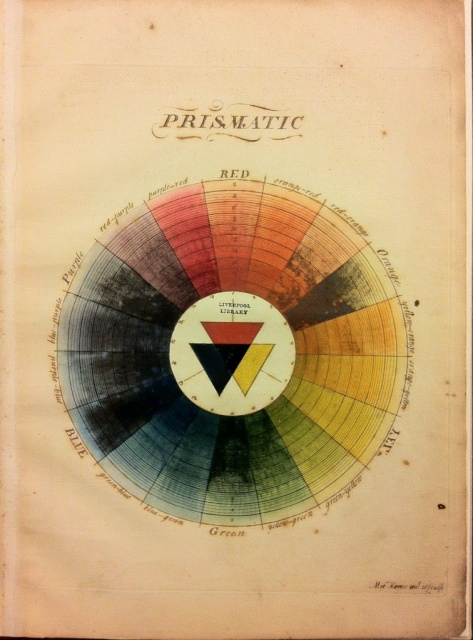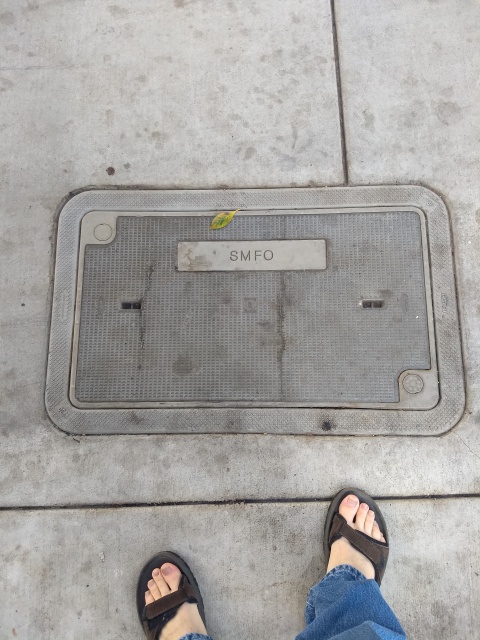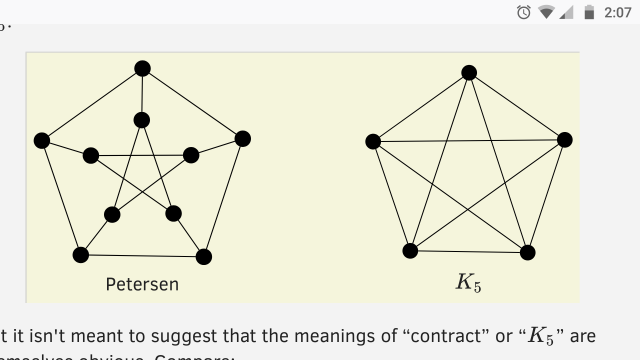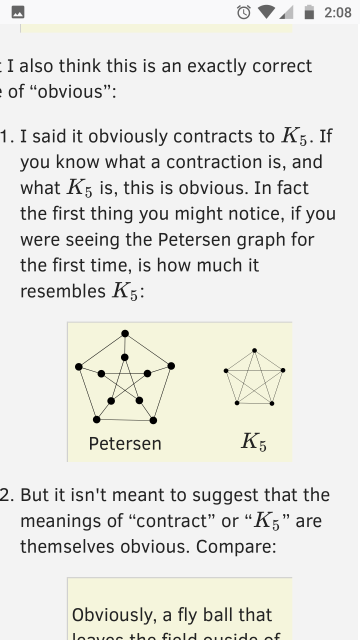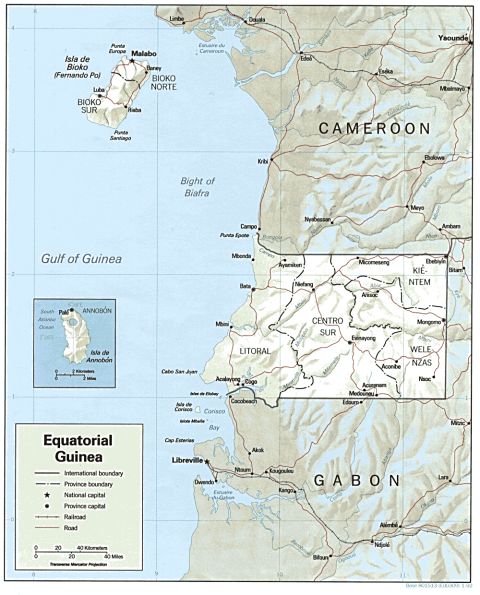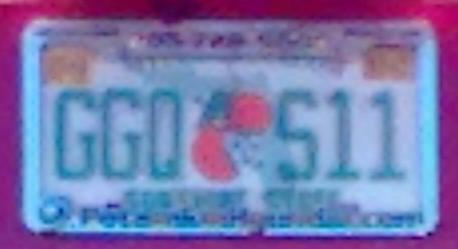Mark Dominus (陶敏修)
mjd@plover.com
I have another blog that doesn't suck.
Archive:
| 2023 | JF |
| 2022: | JFMAMJ |
| JASOND | |
| 2021: | JFM |
| 2020: | JFMAMJ |
| JASOND | |
| 2019: | JFMAMJ |
| JASOND | |
| 2018: | JFMAMJ |
| JASOND | |
| 2017: | ND |
Comments disabled
In a previous article I described how I
discovered that the utility I needed was already available in my
bin, because I had written in twelve years previously, but then
forgotten.
Another episode in this series: I save screen and monitor
configurations in files under ~/.screenlayout; each is a shell
script which, when run, resets the display to use its particular
layout. So for example home.sh is for the two-monitor setup I use
at home and work.sh is for the two-monitor setup I use at work,
where the second monitor is vertically oriented and the primary
monitor is farther from my eyes.
Yesterday I wanted a home setup where both monitors had the same
resolution and the same display. I opened
arandr and set it up
the way I wanted, and then prepared to save it to
.screenlayout/home-merged.sh.
Except that file already existed, and guess what was in it?
When my program works I get to feel smart and accomplished.
And if it doesn't work, then when I fix it, I can feel smart and accomplished for fixing it!
And if it doesn't work and I can't fix it, I can feel smart and accomplished for my cleverness in constructing such a difficult bug!
(I finally figured out this one from Friday. It was entirely my fault. Do I feel bad for making the mistake in the first place? No, I feel awesomely clever for successfully cleaning up the complex mess I made.)
Here's an alternative mnemonic: a bracelet symmetry is modulo the dihedral group !!D_n!!, and “bracelet” begins with a “D”, whereas a necklace symmetry is modulo the cyclic group !!Z_n!!, and “necklace” begins with a “Z”.
The antelope, so called because of its propensity for jumping in front of people. (“Lope” is akin to “leap”.) And the anteater, an insectivore that consumes its prey from the front, whereas the postater always approaches them from the back.
Jeff Boes points out this piece of uncannily apropos news: Dems demand info on acting attorney general’s “masculine toilet” scam.
And it's also World Toilet Day.
Hmmmmm.
OR SUFFER THE UNSPEAKABLE CONSEQUENCES
Incidentally, Harris’ The Natural System of Colours has more than one plate. In addition to the one depicting the “prismatic” colors, starting from the primaries red, yellow, and blue, and showing how they mix to form the secondaries orange, green, and purple, he has a second plate that starts with the secondaries and mixes them to form tertiaries.
Harris names the tertiaries “olave” (orange-green), “slate” (green-purple), and “bronn” (purple-orange). I think “olave” and “bronn” are just alternate spellings of “olive” and “brown” but it is after midnight and I do not want to go downstairs to get out the Big Dictionary.
Wikipedia asserts that the terms “citron”, “slate”, and “russet” have since become common, and attributes them to George Field's Chromatography (1835). Field actually calls them “citrine”, “olive”, and “russet”.
Here is a page from Moses Harris’ extremely influential book The Natural System of Colours, published around 1760. This image is widely reproduced and you may have seen it before:
(This particular image is from a copy of the second edition of 1811, and as you can see it has suffered significant damage.)
I have wondered about this for decades now: Why is the label for yellow written backwards?

More progress on counting paths on octahedra! Suppose you want to know how many paths of length !!n!! there are between two opposite vertices of an octahedron.
It turns out that it is the same as the number of ways to take !!n!! terms, each of which is either !!\pm1!! or !!\pm2!!, and add them up to get an odd multiple of 3. (Order matters.)
For example, there are 8 paths of length 3, which correspond to !!1+1+1, -1+2+2, 2-1+2, 2+2-1,!! and their negatives.
That actually seems like an improvement because it seems like counting those sequences will be a straightforward application of generating functions.
Note to self: On the octahedron, we don't have !!xy=yx!!, but we do have !!xyx=yxy!!.
This is a consequence of !!x^2=1!! and !!(xy)^3=1!!.
Your original idea labeled the endpoints of the edges instead of the edges themselves. Putting the same label at each endpoint means that !!x^2=1!! for all !!x!!. Maybe you don't need this. Or what if we go partway in this direction and label the endpoints !!x!! and !!x^{-1}!!?
Your original idea was to think of the dodecahedron as a Cayley graph, but then you didn't really follow this up. Go back and think about Cayley graphs more carefully.
In the tetrahedron, each face is a product !!abc!! in some order, so at every starting point !!xyz=1!! whenever !!x,y,!! and !!z!! are all different. In the cube the corresponding property for faces is !!xyxy=1!!. The coloring of the dodecahedron that you're using has no such good property. Can you find one that does? This would probably require that you use five labels.
The fact that you found a labeling of the tetrahedron and cube where label order didn't matter is an expression of some fact about the symmetry of the polyhedron itself that you aren't looking at directly. What's really going on there?
It's obvious why this labeling exists for the cube (and for the !!n!!-cube generally). But why does it exist for the tetrahedron? What's going on there?
According to the National Conference of State Legislatures, 24 states legally decide the outcome of tied legislative elections by drawing straws or flipping coins.
(“Mississippi state election settled by 'drawing straws'”)
The 1978 film All You Need is Cash:
John Lennon loved the film and refused to return the videotape and soundtrack he was given for approval.
Alcohol was strictly forbidden during rehearsals and recording, so the cast fortified themselves with milk. The milk in turn was fortified with brandy.
Everyone types git vommit at some point, it's not worth mentioning.
But just now I asked it to git re-arse master.
data Narf a = Narf (Narf a) deriving (Eq, Show)
One kinda funny thing about this type is that it does actually contain a (countably) infinite family of values. But there's no way to tell any of them from any of the others.
narfn 0 = undefined
narfn n = Narf $ narfn (n - 1)
The deriving Eq is a strikingly empty promise.
Last time I looked to see if Spotify had George Crumb's Vox Balaenae, it didn't, but now it does.
Yay.
Mmm, they now have Harry Partch also.
Considering the dodecahedron as a graph with 20 vertices and 30 edges, it's not hard to find a hamiltonian cycle on the dodecahedron. This is a path along the edges of the dodecahedron from vertex to vertex that visits each vertex exactly once and returns to its starting point.
Such a path tontains 20 of the 30 edges, and it turns out that one can color the 30 edges in three colors so that the union of the edges in any two of the three colors forms a hamiltonian cycle.
Or, put another way, the double dodecahedron graph, with 20 vertices and 60 edges, is a union of three 20-cycles.
-- Haskell
data Narf a = Narf (Narf a) deriving (Eq, Show)
narf = Narf narf
Today I'm thinking about the function $$\sin\bigl(2^x\bigr)$$
which I don't remember having considered before.
Another local delicacy is “scrapple” of which I am very fond. It has an undeservedly sketchy reputation. Many years ago Conrad Heiney described it memorably (if not accurately) as what you get when you throw a grenade into a barnyard.
For the record then: scrapple is primarily corn meal or other flour that has been boiled in meat broth. The meat broth may contain small bits of meat. The boiled mush is put into a loaf pan and left to firm up. None of this is very different from polenta, a similar Italian dish that enjoys a better reputation.
The loaf is then sliced, and the slices are fried until they are brown and crisp. This too is often done with polenta.
The batteries have a rated capacity of 235 mAh at a voltage of 2–3V. This works out to over 400 calories. If such a battery were to release its stored energy all at once in an enclosed space, I see no reason why it could not start a fire. If three were kept together, a sudden failure of one battery could trigger a similar failure of the others, with potentially serious consequences.
To my amazement, I find that I am actually considering that I buy a six-pack of batteries for $12.98 instead of two four-packs for $11.96.
It happens that we need exactly five. The extras will sit around uselessly and must be disposed of sooner or later. Lithium batteries are potentially dangerous. They are hazardous waste and cannot simply be thrown in the trash. If I buy a 6-pack, I will have only one-third as much hazardous waste to deal with; perhaps that is worth paying an extra dollar?
In !!n!! dimensions, in general, there are only three regular polyhedra. (For !!n=2,3,4!! there are more, but these are the only exceptions.) One of these is the !!n!!-simplex, which is the !!n!!-dimensional analogue of the triangle and the tetrahedron. It's natural to denote this as !!S_n!!.
And, happily, the symmetry group of !!S_n!! is !!S_n!!.
Come to think of it, nobody ever uses “horizontal” to mean “pertaining to the horizon” and I think hardly anyone would understand it if used that way. But it's a bit different case since “horizontal” actually means something that resembles the horizon, which stands as the prototype of a horizontal object.
Is it common to use the word “vertical” to mean “pertaining to vertices”? Or is that just confusing?
I think that's the sense in which it's used in vertical angles, but I remember I did find that confusing.
This useful guide to what parts are best eating.
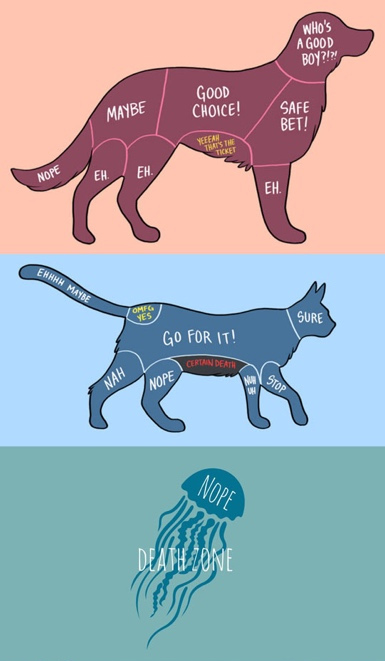
If you're looking for a motto, try:
No situation is so bad that it can't be made worse by panicking.
It's worked well for me.
Never use a ten-point scale where a five-point scale will do
Never use a five-point scale where a three-point scale will do
And don't use a three-point scale if a thumbs up – thumbs down is good enough
Git's fun because every problem is a puzzle, and every puzzle can be solved with ingenuity, but none of the puzzles are too easy.
OR SUFFER THE UNSPEAKABLE CONSEQUENCES
I am really pleased that when I decompose !!f(a, b)!! into a sum of !!f_M(a, b)!! and !!f_N(a, b)!!, where !!f_M!! is symmetric and !!f_N!! is antisymmetric, the letter “M” is actually symmetric, and the letter “N” is actually antisymmetric.
Sometimes notation works out and sometimes it doesn't, but I don't think I've ever seen it work out better than this.
A small part of Marc ten Bosch's guide to rotors and bivectors observes that:
it is possible to split a product (or any function that takes two arguments) into the sum of a part that does not change if we swap the arguments and one that does change, in the following way:
$$\begin{align} ab & =\frac12(ab+ab+ba−ba) \\&= \frac12(ab+ba)+\frac12(ab−ba)\end{align}$$
He means that in general we can decompose any !!f(a, b)!! as $$ f(a,b) = f_M(a, b) + f_N(a, b)$$
where $$\begin{align} f_M(a, b) & = \phantom{-} f_M(b, a) \\ f_N(a, b) & = - f_N(b, a) \end{align} $$
I never thought of this before. Compare Decomposing a function into even and odd parts.
Migraine, seduced by Muther Pendragon in magical disguise, was the mother of King Marthur.
This was already old when I saw first saw it, and that was in the 1980s:
Date: 7 Apr 1977 1712-EST
From: Bob Chansler at CMU-10A
Reply-To: Lord High Executier@CMU-10A
Subject: Re: Close, but no cigar
To: BRIAN.REID at CMU-10A
CC: chansler@CMU-10A
Sender: BOB.CHANSLER at CMU-10A
Message-ID: [CMU-10A] 7 Apr 1977 17:12:49 Bob Chansler
In-Reply-To: Your message of April 6, 1977
My-Seq-#: 39492094
Yr-Seq-#: 4992488
Class: A
Subclass: MCMXLVII
Author: fred
Typist: fred
Terminal: TTY88
FE-L#: 44
Reason: Did Godzilla need a reason?
Valid: Not before 12 Apr 1977 1321Z
Suspend: After 19 Apr 1977 0000Z
Spelling-errors-this-message: 0
Spelling-errors-to-date: 23
Weather: Light rain, fog.
Forcast: Clearing by morning
Psych-evaluation-of-sender: slightly unstable
Security-level: Public
Security-sublevel: 0
Authority-to-send: general
Authority-to-rcv: general
#-people-in-terminal-room: 12
XGP: UP-cutter not working
Ht/Wt-sender: 76/205
Machines: M&Ms available but almond machine is empty
M&Ms-Last-Nickel: 17
Remailed-To: John.Zsarnay at CMU-10A
Remailed-From: Peter.Schwarz at CMU-10A
Remailed-Date: Saturday, 22 September 1979 0155-EDT
Origin: C410PS20 at CMU-10A; 22 Sep 1979 0155-EDT
Remailed-To: Mike.Accetta at CMUA
Remailed-From: John.Zsarnay at CMU-10A (A650JZ04)
Remailed-Date: 22 September 1979 1615-EDT
Origin: A650JZ04 at CMU-10A; 22 Sep 1979 1616-EDT
Remailed-To: Fil.Alleva at CMU-10A
Remailed-From: Mike Accetta <Mike.Accetta at CMU-10A> (A650MA33)
Remailed-Date: Saturday, 22 September 1979 2004-EDT
Via: CMU-10A; 22 Sep 1979 2006-EDT
Remailed-To: Ken.Wertz at CMU-10B
Remailed-From: Fil.Alleva at CMU-10B (A650FA33)
Remailed-Date: Monday, 24 September 1979 1023-EDT
Via: CMU-10B; 24 Sep 1979 1025-EDT
Remailed-To: Don.Provan at CMU-10A
Remailed-From: Krafty Ken Wertz <Ken.Wertz at CMU-10A>
Remailed-Date: Monday, 24 September 1979 1029-EDT
Origin: C425KW0F at CMU-10A; 24 Sep 1979 1036-EDT
Remailed-To: Carolyn.Councill at CMU-10A
Remailed-From: don.provan at CMU-10A
Remailed-Date: Monday, 24 September 1979 1054-EDT
Origin: C425DP0N at CMU-10A; 24 Sep 1979 1055-EDT
Remailed-To: Eddie.Caplan @ CMUA
Remailed-From: Carolyn.Councill at CMU-10A (C425CC33)
Remailed-Date: Monday, 24 September 1979 1631-EDT
Origin: C425CC33 at CMU-10A; 24 Sep 1979 1632-EDT
Remailed-To: lawrence.butcher at CMU-10A
Remailed-From: eddie caplan <EC0F at CMU-10A>
Remailed-Date: 24 September 1979 1634-EDT
Origin: C425EC0F at CMU-10A; 24 Sep 1979 1635-EDT
Remailed-To: Mike Kazar at CMU-10A, Craig Everhart at CMU-10A
Remailed-From: Lawrence Butcher at CMU-10A (X335LB50)
Remailed-Date: Tuesday, 25 September 1979 1811-EDT
Origin: X335LB50 at CMU-10A; 25 Sep 1979 1812-EDT
Remailed-To: sipb @ mc
Remailed-From: Mike Kazar <Mike.Kazar at CMU-10A> (C410MK50)
Remailed-Date: Wednesday, 26 September 1979 0009-EDT
I do not understand your concern about the size of message headers.
That header is 73 lines long and when I saw it, it did seem hilariously and impossibly long. Also, I believe that it was a joke, manually constructed for humorous effect. I think.
But I just selected ten email messages I received this week, all from real people, none generated automatically. The headers varied from 112 to 168 lines with a mean of 139.4.
Here's an example.
Return-Path: <SRS0=eRb6=NB=gmail.com=xxxxxx.xxxxxx@bounce2.pobox.com>
Delivered-To: mjd-xxxxxxx-xxx@plover.com
Received: (qmail 11384 invoked by uid 119); 21 Oct 2018 14:56:17 -0000
Delivered-To: mjd-xxxxxxxxx@plover.com
Received: (qmail 11336 invoked by uid 119); 21 Oct 2018 14:56:16 -0000
Delivered-To: mjd@xxxx.plover.com
X-Spam-Checker-Version: SpamAssassin 3.4.1 (2015-04-28) on plover.com
X-Spam-Level:
X-Spam-Status: No, score=-1.9 required=5.0 tests=BAYES_00,HTML_MESSAGE,
RCVD_IN_DNSWL_BLOCKED autolearn=ham autolearn_force=no version=3.4.1
Received: (qmail 11322 invoked from network); 21 Oct 2018 14:56:15 -0000
Received: from pb-mx9.pobox.com (64.147.108.50)
by plover.com with SMTP; 21 Oct 2018 14:56:15 -0000
Received: from pb-mx9.nyi.icgroup.com (localhost.local [127.0.0.1])
by pb-mx9.pobox.com (Postfix) with ESMTP id A4EA328A7C
for <mjd@xxxx.plover.com>; Sun, 21 Oct 2018 10:56:15 -0400 (EDT)
X-Pobox-Filter-Version: 3.1
X-Pobox-Loop-ID: 7926cd081b2f99edbf8a3175811eeef92ea9e77b
Delivered-To: mjd@plover.com
X-Pobox-Delivery-ID: E285A2-5723E28A7A-1540133775-09857176!pb-mx9.pobox.com
Received: from pb-mx9.pobox.com (localhost.local [127.0.0.1])
by pb-mx9.pobox.com (Postfix) with ESMTP id 5723E28A7A
for <mjd@plover.com>; Sun, 21 Oct 2018 10:56:15 -0400 (EDT)
Received: from pb-mx9.pobox.com (localhost [127.0.0.1])
by pb-mx9.pobox.com (Authentication Milter) with ESMTP
id A5326D4B450;
Sun, 21 Oct 2018 10:56:15 -0400
ARC-Seal: i=1; a=rsa-sha256; cv=none; d=pobox.com; s=arcseal; t=
1540133775; b=fr67/8t0TPrSeT8Riz+V3HXbsiglMQHr3uf/xxO0dpC/r85fum
voxyqmm4F3lMo2O/24sonwd5Zr2OtgXoyVYzqmNoQjMCdsSbmR+Jgjd/hkl8sLDV
VOZN6wlrxWo9WkQMk+CqlqO8sNKVLEHtZjzLcvieXJAx/f/UwO5JR1/Ii80VGijA
uAN1HaDITm41GNUMUublfaQmRQQRaJjdYhB2ZAEODoykLS3WMgQjwGPKZae+Vug+
9oQMLPNMJBRRVhE0rCLwcunatj0uFmE+mP6YRHyLCYqKhtl4sJdRlRkTcZtLhfLT
Yo+BWzWNv/sS7hbRLIUcHg8aDTdL+inzltWQ==
ARC-Message-Signature: i=1; a=rsa-sha256; c=relaxed/relaxed; d=
pobox.com; h=mime-version:reply-to:from:date:message-id:subject
:to:content-type; s=arcseal; t=1540133775; bh=vjL7FpH0ajRyY2oBrV
ZKutYja2P6fTTwFoNmmdMx6k8=; b=tSDtGXYswcyua7qtkCnT+lHHIKGAtZUAiN
cWoSCvlw4iTDDy1OXf1JePuS+mLiov28ac1ZC2POArwmZrZBU9gdiuB7dIibOGY1
Rk0U7MeQGZ00acko51IGwzOmRUrlcFKflw9T3pP6wqOjKEo3/n/EQLwEdMrEvAuN
qbRcZ85RxhRfT/EA8FFIqpkD1O5eUmBJgxtZd857+dYACvkEdJwyKdA2vwK6gxZ9
P6tkXzMS8ZUxt+R98XjrP8mjUhBCVIvHl6Gck5sIWc+sA7RzlIH1xVz5/dXoBbxw
vBweOhOgayAUZDHqSZFdfVasxKQ7I9H4hAwSs5i9wA47w6IRWjzA==
ARC-Authentication-Results: i=1; pb-mx9.pobox.com; arc=none (no signatures found);
dkim=none (no signatures found);
dmarc=none policy.published-domain-policy=none
policy.applied-disposition=none policy.evaluated-disposition=none
(p=none,d=none,d.eval=none) policy.policy-from=p
header.from=xxxxx.com;
iprev=pass policy.iprev=209.85.210.53 (mail-ot1-f53.google.com);
spf=pass smtp.mailfrom=xxxxxx.xxxxxx@gmail.com
smtp.helo=mail-ot1-f53.google.com;
x-aligned-from=fail;
x-google-dkim=pass (2048-bit rsa key) header.d=1e100.net
header.i=@1e100.net header.b=VnaTQExP;
x-ptr=pass smtp.helo=mail-ot1-f53.google.com
policy.ptr=mail-ot1-f53.google.com;
x-return-mx=pass header.domain=xxxxx.com policy.is_org=yes
(MX Record found);
x-return-mx=pass smtp.domain=gmail.com policy.is_org=yes
(MX Record found);
x-tls=pass smtp.version=TLSv1.2 smtp.cipher=ECDHE-RSA-AES128-GCM-SHA256
smtp.bits=128/128;
x-vs=clean score=0 state=0
Authentication-Results: pb-mx9.pobox.com;
arc=none (no signatures found);
dkim=none (no signatures found);
dmarc=none policy.published-domain-policy=none
policy.applied-disposition=none policy.evaluated-disposition=none
(p=none,d=none,d.eval=none) policy.policy-from=p
header.from=xxxxx.com;
iprev=pass policy.iprev=209.85.210.53 (mail-ot1-f53.google.com);
spf=pass smtp.mailfrom=xxxxxx.xxxxxx@gmail.com
smtp.helo=mail-ot1-f53.google.com;
x-aligned-from=fail;
x-google-dkim=pass (2048-bit rsa key) header.d=1e100.net
header.i=@1e100.net header.b=VnaTQExP;
x-ptr=pass smtp.helo=mail-ot1-f53.google.com
policy.ptr=mail-ot1-f53.google.com;
x-return-mx=pass header.domain=xxxxx.com policy.is_org=yes
(MX Record found);
x-return-mx=pass smtp.domain=gmail.com policy.is_org=yes
(MX Record found);
x-tls=pass smtp.version=TLSv1.2 smtp.cipher=ECDHE-RSA-AES128-GCM-SHA256
smtp.bits=128/128;
x-vs=clean score=0 state=0
X-ME-VSCause: gggruggvucftvghtrhhoucdtuddrgedtkedrgedtgddukecutefuodetggdotefrodftvf
curfhrohhfihhlvgemucfhrghsthforghilhenuceurghilhhouhhtmecufedttdenucen
ucfjughrpeggrhfhfffkuffvtgesrgdtreertddtjeenucfhrhhomhepffgrnhhivghluc
ghrghgnhgvrhcuoegumhifihhtsegumhifihhtrdgtohhmqeenucfkphepvddtledrkeeh
rddvuddtrdehfeenucfrrghrrghmpehinhgvthepvddtledrkeehrddvuddtrdehfedphh
gvlhhopehmrghilhdqohhtuddqfhehfedrghhoohhglhgvrdgtohhmpdhmrghilhhfrhho
mhepoegurghnihgvlhdrfigrghhnvghrsehgmhgrihhlrdgtohhmqecuuffkkgfgpeelud
eileenucevlhhushhtvghrufhiiigvpedt
X-ME-VSCategory: clean
Received-SPF: pass
(gmail.com ... _spf.google.com: Sender is authorized to use 'xxxxxx.xxxxxx@gmail.com' in 'mfrom' identity (mechanism 'include:_netblocks.google.com' matched))
receiver=pb-mx9.pobox.com;
identity=mailfrom;
envelope-from="xxxxxx.xxxxxx@gmail.com";
helo=mail-ot1-f53.google.com;
client-ip=000.00.000.00
Received: from mail-ot1-f53.google.com (mail-ot1-f53.google.com [209.85.210.53])
(using TLSv1.2 with cipher ECDHE-RSA-AES128-GCM-SHA256 (128/128 bits))
(No client certificate requested)
by pb-mx9.pobox.com (Postfix) with ESMTPS
for <mjd@plover.com>; Sun, 21 Oct 2018 10:56:14 -0400 (EDT)
Received: by mail-ot1-f53.google.com with SMTP id x4so36181561otg.3
for <mjd@plover.com>; Sun, 21 Oct 2018 07:56:14 -0700 (PDT)
X-Google-DKIM-Signature: v=1; a=rsa-sha256; c=relaxed/relaxed;
d=1e100.net; s=20161025;
h=x-gm-message-state:mime-version:reply-to:from:date:message-id
:subject:to;
bh=vjL7FpH0ajRyY2oBrVZKutYja2P6fTTwFoNmmdMx6k8=;
b=VnaTQExPDxLOm/fFxz+l5u9Aaug8kYhuO+oLNME0xyC/Vd5RJ7GFOSAFZi7CwpncOc
Oz2uG3otRlYSkTAe/kDp57M7euVbe/t8forciGzPvnEoV00eML4k35/61iwXdh0G8VPx
ufiARQIeNnnbIZhIG5KrT9dILpWqaOpP62Pr5V/luJopr6VyGoczWKU7ziLyUrTQ07N0
4bEuvdJeVvMWe65SikHP+g8BzQ25v9ddFks0RiDNooQZ1BUs+Iu9ATaq7H7PW3gu8bao
Z7yljpdgzwiy1nbf7jLYdAuq2QFwLqVZwOUvQhZEhmmYxQp0RC5VZ8OJYMKf9WIHvVKc
xJxA==
X-Gm-Message-State: ABuFfoie6qFjtYXQhDgeIlRztSLmtcIQ5Y85cWKJgvIsNW1b6EG6bKdt
3Vq5OPHyDMKFLUdcxSkcNPCxkjcQ4ugtY7cnO4tujB2q
X-Google-Smtp-Source: ACcGV61mj+9y3xiKc4ASxH62IMUi6iMW5iUjIDgYDwjbW3B4rcSn8ERHuJPAvRqh89Iv+9dOPLIfCUFvgeLCcOQJ4SU=
X-Received: by 2002:a9d:7495:: with SMTP id t21mr13661735otk.93.1540133773940;
Sun, 21 Oct 2018 07:56:13 -0700 (PDT)
MIME-Version: 1.0
Reply-To: xxxxxx@xxxxxx-xxxx.com
From: Xxxxxx Xxxxxx <xxxxx@xxxxx.com>
Date: Sun, 21 Oct 2018 10:56:02 -0400
Message-ID: <CAF_c+Nx+N1eihPhKSiHMVQ_VES2GPSeCO3QR3a6q0=ts7_8wpg@mail.gmail.com>
Subject: "xxx" Xxxxxxxxxxxx Xxxxx
To: Mark Dominus <mjd@plover.com>
Content-Type: multipart/alternative; boundary="00000000000080a9b90578be56eb"
X-Pobox-Client-Address: 209.85.210.53
X-Pobox-Client-Name: mail-ot1-f53.google.com
X-Pobox-Client-HELO: mail-ot1-f53.google.com
X-Pobox-Original-Sender: xxxxxx.xxxxxx@gmail.com
I do not understand your concern about the size of message headers.
Holy cow. What would they have made of this in 1977, I wonder?
Last night's post counting up the last initials of people in the U.S. hit a roadblock just before publication. It included this chart:
But it almost contained this one instead:
I realized at the last moment that this chart was wrong. It claims
that ‘A’ is far and away the most common initial. This is because the
last item in the Census Bureau's data file is 29 million people with
ALL OTHER NAMES and I counted it with the A's. I had to redo the
data analysis, rebuild the chart, and rewrite part of the article.
Julia Evans says
this is such a perfect description of data analysis
I nerdsniped myself with observation this morning that there is no U.S. president whose (last) name began with ‘S’.
I bring you this more detailed investigation. The red bars are data taken from the 2010 U.S. Census, and include all names that occurred at least 100 times; that's the 162253 most common names.
For example, about 9.5% of U.S. people counted in 2010 had names beginning with ‘S’. If U.S. presidents matched this rate, we would expect around 4.3 presidents to have had ‘S’ names. Instead, there are none.
In contrast, there are 4 presidents whose names began with ‘J’. (Jefferson, Jackson, and two Johnsons.) Only about 8–9 million Americans have names beginning with ‘J’. If ‘J’ names occurred at the higher presidential rate we would expect more like 26 million.
The correlation of the two variables is 55%.
The raw data is here, and some additional data is available.
Incidentally, there has never been a major-league baseball player whose name began with ‘X’. Dean Xingu was a pseudonym for his real name, Dean Zorn.
No President of the United States has had a surname that began with the letter ‘S’.

Facebook users are asked to guess the correct amount of teeth in a jar and tag a friend in the comment section under the photo of the teeth. … The winner will be announced Friday and will receive $100 in Downtown Dollars to be used at participating merchants.
(Usher, Amanda M. "Mysterious teeth featured in giveaway", Valdosta Daily Times, 29 October 2018.)
When I first saw this I misunderstood the headline. I thought the teeth themselves were the prize for guessing closest, as is often the case with jars of jelly beans. I am so disappointed!
Looking for something else, I found this article that I posted on Usenet in 2001. I am repatriating it here. It concerns a particular feature of David Brin's Sundiver universe:
The galactic society doesn't accept the concept of "real number", only finite rational approximations.
I've spent a lot of time thinking about exactly this problem, whether the real numbers might be a sufficiently artificial construction that the aliens, when they come, won't have them. The conclusion that I've always come to is that the real numbers are unavoidable.
The aliens will be unable to avoid the Pythagorean theorem, noting, for example, that the diagonal of a 3×4 rectangle has length exactly 5. The Egyptians knew this three thousand years ago, and the aliens cannot possibly miss out on it and still be able to construct space ships. Of course, they call it the Blorkskug theorem, after the famous Nogulobular Blorksug Urbulgolp. But that's ancient history.
The aliens will then observe that if the Blorkskug theorem is to hold, then the diagonal of a square, whose edge is exactly one florzbeem, must have length of !!d!! florzbeems, where !!d·d = 2!!.
The alien mathematicians might refuse to admit that the diagonal has any well-defined length, but that's a rather obtuse philosophical position. (No pun intended.) It's quite concrete and specific. Mathematicians get paid to solve engineering problems, not to sit in pubs and insist that you're an idiot for wanting to measure the distance between the west and east corners of your wet glotzpurg field. If an alien mathematician loftily informed you that you can't measure that because there is no such number, you'd hit him in the dewlaps. (Ouch!)
Now the aliens take out a florzbeemstick and measure the diagonal of the wet glotzpurg field and find that it seems to be about !!\frac75!! florzbeems. Well, it must be a little more, because the !!\frac75· \frac75 = \frac{49}{25}!!, which is a hair less than 2, and the ancient Blorkskug theorem says it should be 2. It won't take long for the aliens to discover that !!\frac32, \frac{17}{12}, \frac{99}{70}!!, and so on are all a little too large, and that !!\frac75, \frac{41}{29}, \frac{239}{169}!!, and so on are all a little too small. But as the fractions get more complicated, their squares get closer and closer to 2. (Aliens can compare fractions just fine, remember.) The smart aliens soon realize that they can make fractions whose squares are as close to 2 as they like — if !!\frac ab!! is close, then !!\frac{a+2b}{a+b}!! is even closer, and you're still computing with integer fractions.
Alien mathematicians will wonder if there is a fraction whose square is exactly 2. Some alien will find the proof that there isn't any such fraction. It's an easy proof, totally watertight. The Greeks knew it about 2500 years ago. It's completely obvious once you know about prime factorizations. The aliens can't possibly be dumb enough to miss this, especially if they are as obsessed with fractions as we have supposed.
So far the aliens have followed the same path as human mathematics, and I think it's completely unavoidable. At this point they must do something different. Human mathematics supposes that there is a new kind of number, a nonfraction, whose square is exactly 2. We call such numbers 'irrational' because they aren't ratios. We want the aliens to reject this idea.
The aliens might deny that there's any number which corresponds to the length of of the line. Instead, they say, it can only be approximated by fractions, although to any desired degree of accuracy. For example, we can give two sets of fractions, say !!\left\{\frac32, \frac{17}{12}, \frac{99}{70}, \ldots\right\}!! and !!\left\{\frac75, \frac{41}{29}, \frac{239}{169}, \ldots\right\}!! which can be used to pin down the actual value as closely as desired, but we can't pin it down exactly. The width of the wet glotzpurg field is not a number, because all numbers are fractions, but we can get a handle on it by manipulating these collections of rational approximations instead.
And in fact this works out pretty well. You can add and multiply these collections of approximations and you can get meaningful results that way. The end result will be two sets of fractions; all the fractions in the first set will be less then the real answer, and all the fractions in the second set will be greater than the real answer. If you want an approximation to any desired degree of accuracy, just pick one of the more complicated fractions from either set. If the result of a computation really is a fraction, you will be able to prove that by looking at the approximations.
But the notation is rather cumbersome. Sooner or later, someone is going to invent a shorthand. "My central tentacle is getting tired," she will say. "Instead of writing !!\left\{\frac32, \frac{17}{12}, \frac{99}{70}, \ldots\right\}!! and !!\left\{\frac75, \frac{41}{29}, \frac{239}{169}, \ldots\right\}!! all the time, I will just write !!s_2!! as an abbreviation. But it will mean the same thing; it is only an abbrevation."
Oops. This alien has just invented real numbers. We write $$\sqrt2$$ instead of !!s_2!!, but the meaning is exactly the same. The computations that the alien does with its !!s_2!! notation are exactly the same as the computations we do with our square root notation. When the alien wants to know how big the result is, it computes a rational approximation; that's what we do too. (That's how pocket calculators work, for example — everything is a rational approximation.)
And the alien computations don't merely arrive at the same results as ours by coincidence. They have the same underlying meaning, in the philosophical sense. The fact is, there's no difference between calculating with 'finite rational approximations' and calculating with 'real numbers', because real numbers are finite rational approximations. If you look in a human mathematics textbook, such as Principles of Mathematical Analysis by Walter Rudin, you'll find a mathematical definition of real numbers by construction, and the text will use one of two techniques: Either the construction by Dedekind cuts, which are paired sets of rational numbers exactly as I showed above, or by Cauchy sequences, which are, guess what, sequences of rational numbers.
So perhaps the aliens like to deny the existence of irrational numbers, but guess what? We have a long history of doing the same thing. Consider 'imaginary numbers' for example. We may deny that imaginary numbers exist, but that does not stop us from calculating with them, imaginary or otherwise. The aliens may similarly deny the ontological existence of irrational real numbers, but as we've seen they calculate with them just fine. They probably use base-17 decimal fractions, just like we use base-10 decimal fractions. (Those are just rational approximations, you know.) They may not even realize that they are denying the existence of the irrational numbers, just as we use imaginary numbers every day without thinking about what the phrase 'imaginary number' actually means.
It's tempting to view the statement that "the galactic society doesn't accept the concept of 'real number'" as just an overliteral mistranlsation of some phrase analogous to 'imaginary number'. Probably the aliens are saying the same thing about us. "Those crazy humans don't even accept the concept of the square root of !!-1!!!" And since the calculations that the aliens do are identical to our own, using rational approximations, we are exactly like the aliens. Someone pass the roast glotzpurg, please!
OK, I have to go now. My central tentacle is getting tired.
Today I was opening the mail and there was a fat envelope from the company that provides my homeowner’s insurance. It was the annual amendment to the policy. I skimmed through it to see if anything jumped out at me, and I was about to put it in the trash when something did jump out at me:
The following types of losses are not considered chargeable:
Designated Cat losses
…
Fascinated, I read the entire rest of the packet, but there was nothing else about the Designated Cat losses.
Today I learned that L. Frank Baum, writer of The Wizard of Oz and sequels, also wrote a 10-volume series for teenage girls, _Aunt Jane’s Nieces. I thought I had read pretty much everything Baum had written, but I was so, so wrong!
The only remotely similar work I know by Baum is The Master Key, which is YA science fiction. It was pretty good. I am looking forward to trying to Aunt Jane's Nieces.
Sandra Day O'Connor is a member of the National Cowgirl Hall of Fame.
One can use the Knuth-Bendix algorithm to determine, for example, which subsets of the group laws necessarily imply the others. (For example, any associative binary operation with an identity element and left-side inverses must necessarily have right-side inverses also.)
Could this similarly be done to find minimal sets of haskell instance operators?
Say to determine that return and join together imply return and >>=, and
vice versa, but that >>= and join together do not imply return?
Excerpts from a the history of a certain item on my to-do list:
Opened by Mark Dominus
05/24/2017 1:54 PM
Edited by Mark Dominus
07/24/2017 11:07 AM
You're paying for it, so you might as well use it.
Edited by Mark Dominus
10/23/2017 10:53 AM
This is costing you $8 per month, so get your butt in gear.
Resolved (Complete) by Mark Dominus
Status changed from 'In progress' to 'Resolved (Complete)'.
10/22/2018 (Today) 2:53 PM
Holy shit, you actually did this.
I guess I'll count that as a win.
When I was a sysadmin at the University of Pennsylvania, one of the grad students asked me if I knew that “gullible” was missing from the dictionary. This is the oldest trick in the book.
“Huh, really?” I said, and turned to my open terminal session. “Lemme see…”
% grep gullible /usr/dict/words || echo missing
missing
“…How about that! It's true!”
He was very surprised, and somewhat annoyed that his trick hadn't worked.
Wouldn't you expect that gullible would be in the word list used by
the Unix spell checker? Usually it is, but I was the sysadmin of
that machine, and I had removed it a couple of years before, just in
case.
After I went to publish today's article titled “intestines” I looked at the blog and it wasn't there.
I have several plugins that could block the introduction of an article
before it's ready: there might be a .notyet file in the same
directory; it might have published: 0 in the article's metadata, and
so on. I checked all those and everything looked fine. The article
showed up properly in the test version of the blog, but when I build
the static version it was never included.
I finally ran the blog software under the debugger. It was indeed selecting the “intestines” article and then one of the plugins was filtering it out. Stepping through the plugins eventually revealed which one was responsible:
package tests;
my $TEST = $ENV{REQUEST_URI} =~ m{^/test};
# Do NOT use this module when blog is in test mode
sub start { ! $TEST }
# Discard posts whose titles contain tests
sub filter {
my ($pkg, $files) = @_;
delete $files->{$_} for grep /test/, keys %$files;
return 1;
}
The post was being discarded from the live version because
“intestines” matches /test/. Sheesh.
I had no idea I had this plugin, which I probably wrote in 2006.
I suggest that the word “baby” be retired from all rock music, except when it is used to refer to an actual baby.
Here's a list of the words from Webster's Second International Dictionary where the letters in the first half of the word are the same as the letters in the second half:
beriberi
ensconces
hotshots
intestine
intestines
reappear
restaurateurs
signings
teammate
I have an interactive program that streamlines the process of shitposting. Today we had the following exchange:
Edit? [no] yes
Commit? [no] s
Answer Y or N, dumbass.
Commit? [no]
I had forgotten that I put that in, and was startled.
I think living with me must be like that a lot of the time, because I live with me, and it is like that a lot of the time.
It turns out that the U.S. individual tax system has a users’ manual! It is 300 pages long, which is not unreasonable. I have read plenty of 300-page manuals in my time.
It seems tragic that I didn't find out about this thirty years ago, since I am exactly that rare weirdo who would read this manual and find it really useful.
Goat-scented air fresheners
Malcolm X and Redd Foxx were lifelong friends. They met when both were working as dishwashers in the same restaurant.
New York Times obituary of Foxx
Wikipedia article on Malcolm X
I've been to some crappy conference talks, let me tell you. And usually they're crappy in pretty much the same way: too little substance, delivered too late. (This is what led me to invent lightning talks: if the speaker can't get off their thumb and get to the point, then by God we'll get them off the stage and give it to someone who can.)
Anyway, this talk was crappy in a whole new way. It was about designing accessible web sites. The speaker put up his first slide and here's what I saw:
I raised my hand. “Excuse me,” I said. “I can't read that. Can you please make the font bigger?”
“Um, no, I can't.”
So I got up and walked out.
I have a program that is a wrapper around ssh. It's officially
named employer-ssh, and running employer-ssh git looks up the
alias monkey in a table to find the real hostname,
monkey-01.deployed-uswest.employer-ec2.com and then runs ssh
monkey-01.deployed-uswest.employer-ec2.com. There are some other
features attached to it also. For example, it makes sure that the VPN
is connected before it tries to run ssh.
I never actually invoke it as employer-ssh monkey, though. Instead,
I just run monkey, which is a symlink to employer-ssh. The
program sees that no argument has been supplied, and infers that
monkey is the alias I wanted to use.
It sometimes happens that I need that long hostname in some other context though, and for quite a while the way I would look it up would be to grep the source code of the program:
% grep monkey $(which monkey)
monkey ) host=monkey-01.deployed-uswest.employer-ec2.com
This had been bugging me for a while, and I had the idea of giving the
program a flag so that instead of running ssh it would just print
out the full hostname. After several months, I finally got around to
putting in that feature.
Or I tried to. I found it had been there all along:
% monkey what
monkey-01.deployed-uswest.employer-ec2.com
This mode also makes it skip the part where it deals with the VPN.
I don't know what to conclude from this.
“Fucking x, how does it work?”
(Most recently, fucking (-> e), how does it
work?)
Let's all refer to computers as “giant electronic brains”.
By about 1500, Scots was the lingua franca of Scotland.
What a weird sentence. Did the person who wrote this think about what they were writing? Maybe they did, and they thought it was funny, or maybe they just charged ahead. I honestly don't know.
The orogeny of an orogen is only part of the orogen's orogenic cycle.
This is MacArthur Park the Westlake area of Los Angeles.
These pillars are made of some sort of steel, with holes cut in them in what are evidently Mayan numerals. (Bars are fives, dots are ones, and those hamburger football things are zeroes. Groups of bars and dots composed vertically in a base-20 system.)
But why? What do the numbers signify?
The LA Parks and Recreation web site for MacArthur Park features these pillars prominently, but offers no explanation. Does anyone know what is up?
It seems clear that the heavy metal umlaut was first discovered by Blue Öyster Cult, although some claim, implausibly, that its invention by Mötorhead was an independent one. Blue Öyster Cult's album of that same title was released in 1972; Mötorhead was not convened until 1975.
But as far as I know nobody has suggested that both groups were anticipated by, and perhaps even inspired by, Häagen-Dazs, which dates to 1961.
I just wrote a program that didn't do anything when I ran it.
It's because the main loop had:
if len(base_word) < 6 or len(base_word) > 5:
continue
That 5 should have been a 7.
Now it has me thinking about what programming language designs would enable the programming system to notice that error and issue a warning “Hey, you wrote a test, but it can never return false”.
Maybe instead of some sort of briliant static analysis, what we need instead is an eaasy dynamic analysis: “Hey, here's a list of tests in your program that always had the same result.”
Has someone outfitted Eclipse or some other IDE to annotate your program after each run with pastel shades showing which parts were actually exercised and which were never run? That seems like it could be useful.
Yesterday I was going to do the grocery shopping and Katara said she wanted beef in cubes. So I bought a chunk of beef roast, cubed it, and fried it on the skillet. Katara often surprises me by rejecting what I think is lovely food, but so far she has never rejected straight fried meat with salt and pepper. Okay, whatever, at least it's easy.
We also had some yellow squashes in the refrigerator so I decided to cook those. I made Toph tell me whether to turn them into discs or spears (discs) and then I cooked them in oil in a cast-iron frying pan, with some salt. I thought I would probably add a little soy sauce or something to them a later on but while they were cooking I remembered that we had paneer in the freezer. Toph had asked for it a couple of weeks before but hadn't specified what she wanted done with it. I didn't want it to just sit there forever, and this seemed like as good a time as any to use it. So I cubed up the paneer and put it in with the squash, and then because it was paneer I put in some cumin and cardamom and turmeric powder.
I liked it, and the kids ate a lot of it, so I suppose that counts as a success.
This is a very typical example of how I cook. This style really suits me. I'm good at improvising and not good at planning. I buy things at the store that I think I might want to cook later, and then I forget about them. But then I look in the refrigerator for ingredients and hey, look, yellow squashes. Okay, we can have yellow squash, fine. Sometimes I feel like that guy in Memento, sending myself messages through time.
One drawback of this style of cooking: when you make something you like, you can't always make it a second time. How much turmeric did I put in? Uh, I'm not sure. A few shakes? I made an awesome turkey and potato stew in 1995 that I really wish I could duplicate. But I don't remember how I did it.
Another drawback: sometimes toward the end I realize what I should have done back at the beginning and then it's too late. For example, onions. If you want to put in onions you have to commit to them ahead of time because they take so long too cook. If I had known ahead of time that I was going to put cumin and paneer into the squash I would have cooked it in ghee instead of in vegetable oil. Oh well, maybe next time.
And sometimes I become indecisive at a crucial moment and ruin the food. But in the worst case, there is always peanut butter.
I wrote:
I hope to phagocytize this word into my own vocabulary, immediately and with peaceful aplomb.
I didn't do it immediately, but I did get it in there!
Today I went to push some Git branch to a private Git repository, and I received the following reply:
# You are trying to push 0 commits that have 'wip' in their messages!
The naughty commits are:
# 6a9a5e0c970
# 24eddb9721b
# ba286d92d29
# da6a115165a
# d06caa5d8c4
# ee4a2baf8c6
# 9be7089ec1a
# 4868c296c65
Oh, crap, it must be some experimental hook I put into the remote repo. Unfinished from the looks of it. (Because of “0 commits”. A bug that obvious and unavoidable must mean that the work was half-baked.)
So I thought grumpily that I would to have to get into the remote machine and disable the hook…
And then I saw that the message ended with:
# (Use git-push --no-verify to evade this check.)
Oh, thanks! Useful!
And because of that, I realized that it was actually a local hook,
.git/hooks/pre-push in fact. So I just opened the editor and fixed
the bug. And then I used --no-verify, which was the right thing in
that circumstance.
I forget stuff a lot, and putting in this sort of hint really helps me when I fall foul of my own incomplete work, months after I have forgotten it. It's like a gift from my past self, and getting them also motivates me to try to send more such gifts to my future selves.
A few weeks ago I had a clogged inkjet cartridge and the instructions online suggested soaking it in a diluted solution rubbing alcohol. But I couldn't find the rubbing alcohol because Toph had taken it for a project.
But for some reason my wife keeps a bottle of cheap vodka in the liquor cabinet. I don't drink vodka, and she doesn't drink at all, so it had just been sitting there uselessly. And hey, that's what vodka is, it's nothing but 40% ethanol solution. So I warmed some up in the microwave and soaked the cartridge in it, which cleaned it right up.
That reminds me I used to have a friend whose relatives in Tennessee would send him their homemade moonshine. He used it to clean the heads on his tape recorder.
How is it that mushrooms can appear so suddenly overnight or immediately after a rainstorm? It turns out that the fungus organism builds the mushroom structure ahead of time. All the cells are there, properly assembled, but very small, in a form called a primordium. When enough water is available, the fungus pumps it into the cells, inflating them like water balloons, and the mushroom pops up.
It's been very damp in Philadelphia of late.
While driving, I often remember things I wanted to write up for the blog, and I ask my phone to take a note, which it converts into email. Later I see the email and remember what I wanted to write up.
Sometimes speech-to-text produces interesting results. This time I asked it to remind me to write up the article about the prime mnemonic system that didn't work. But the email it sent said:
Don't forget to write up the article about the prime and demonic system that didn't work
Tony Finch suggests that we could use ⸢square quotes⸣ as scare quotes. I will adopt this suggestion forthwith.
I wish that true quotation marks could be distinguished typographically from scare quotes.
In the two previous shitposts I referred to outside sources. In both cases quotations included corrections where the original authors had written “in” where they meant to have “it” or “is”.
As of 2017, after a 100-year delay, there is an upper-case version of ß.
ß was introduced around 1900, and an upper-case version was planned at that time, but the glyph wasn't designed in time to be widely adopted. It was left behind, and for more than a century the only correct upper-case version of ß was SS.
As of 2017, the official German orthography permits an upper-case ß, which ias been introduced into Unicode as ẞ. Many fonts and computer input mechanisms now support it. For example, when composing this article I found that in the default compose-key bindings on my Linux system, just as «compose s s» generates the lower-case ß, «compose S S» generates the upper-case ẞ.
Uppercasing ß as SS is still officially permitted.
More details: Ralf Herrmann, “The Capital Sharp S is now part of the official German orthography”.
It is well known among mushroom farmers that many mushrooms extraordinarily grow within several tens of meters around the spot where lightning strikes.
Shunsuke Tsukamoto et al., “Development of an Automatic Electrical Stimulator for Mushroom Sawdust Bottle”. Proceedings of 2005 IEEE Pulsed Power Conference.
I gave Nat Torkington this advice about twenty years ago, and I think it's still good.
Houston Street. “Houston” is pronounced /ˈhaʊstɨn/, which is different from the pronunciation of Houston, Texas (/ˈhjuːstɨn/).
Avenue of the Americas. This is always pronounced “Sixth Avenue”.
Greenwich Village. “Greenwich” is pronounced /ðə/.
There's no restaurant in Philadelphia called “Hoagies and Pierogies”. I see a great need!
(There does seem to be one in West Columbia, SC. Where's our civic pride? Are we to be outdone by West Columbia, SC?)
Walt Mankowski wrote to me about some audiobook narrators he remembered, and this reminded me of the time I was excited to discover that there was an audio version of Neuromancer read by Gibson himself. I eagerly started listening, and gave up before the end of the first chapter. I didn't think he read well. And, thinking on it now, why should he? He is not an actor, but a writer. Not the same thing at all.
And also, I didn't like Gibson's voice. I had a reaction similar to that of the guys in this story:
“I was doing a signing once in San Francisco,” [Gibson] says. “These two big motorcycles roared up outside the bookstore, and two guys walked in with black leather and tattoos and plastic bags, out of which they produced their copies of Neuromancer. And they sort of saw me there …” Gibson mimes incredulous disappointment. “And one of them sort of sighed and said, ‘Well … you can sign it anyway.’”
I take it back, Project Xanadu is way older than the GNU Hurd.
At some point I will try to remember to blog about my brief experience working with Ted Nelson. It was interesting.
GNU Hurd, the only vaporware project even later than Perl 6, is apparently still a thing.
“Hey, at least we're better than 4chan!”
Yesterday's article about Haskell rabbit holes hit the front page of Hacker News (in fact, it hit #1 for approximately one minute, before it was rightly displaced by a much more important article) and from there it also hit Reddit, of which it is a subreddit with a different stylesheet. You know how people say “don't read the comments”? Reddit is all comments; chew on that for a minute.
Anyway several comments said something along these lines:
wanted to comment that polynomials are better represented backwards, which fixes that (and many other problems) …
apparently without noticing that I did represent them backwards, with the constant term first. So, on the one hand, Reddit Person, obviously I agree with you, and on the other hand, you're a fucking blockhead.
But there was a bright side too. My article was also posted on
r/programmingcirclejerk (which is a fair description of it,
if I can be considered a sort of degenerate circle) with the title
and I have no witty (or merely profane) comeback to that, because the shoe fits. My whole article was some sunbeams-from-cucumbers bullshit, that's for sure.
A different Reddit comment suggested that this was the wrong data structure and I should have used an integer-indexed Map. I had sadly come to this conclusion myself, earlier in the evening, when I realized that the structure I had made it very difficult to handle polynomials over more than one variable. With the Map I would just change the index type to a tuple. Oh well, lesson learned.
I'm reading Adam Bede by George Eliot, and this paragraph took my breath away:
Family likeness has often a deep sadness in it. Nature, that great tragic dramatist, knits us together by bone and muscle, and divides us by the subtler web of our brains; blends yearning and repulsion; and ties us by our heart-strings to the beings that jar us at every movement. We hear a voice with the very cadence of our own uttering the thoughts we despise; we see eyes — ah, so like our mother's! — averted from us in cold alienation; and our last darling child startles us with the air and gestures of the sister we parted from in bitterness long years ago. The father to whom we owe our best heritage — the mechanical instinct, the keen sensibility to harmony, the unconscious skill of the modelling hand — galls us and puts us to shame by his daily errors; the long-lost mother, whose face we begin to see in the glass as our own wrinkles come, once fretted our young souls with her anxious humours and irrational persistence.

I complained recently about a miscast audiobook narrator. I mentioned I had preferred listening to Dr. Jekyll and Mr. Hyde, read by Sir Christopher Lee. But this is a pretty high bar. I am not so hard to please.
On the same trip, I also enjoyed listening to Frances Hodgson Burnett's The Secret Garden (1911), read by Kara Shallenberg. I hadn't read this myself in about forty years, and although I had liked it, I also remembered it being somewhat overwrought. I was apprehensive about listening too it because I was afraid I might find it embarrassing. But it was fine, and M. Shallenberg was a large part of why. Her reading was straightforward and unaffected. Many of the characters speak in Yorkshire dialect — this is a plot point — and here Ms. Shallenberg, who sounds like an American, had another opportunity to mess things up terribly, but didn't. I would be delighted to hear M. Shallenberg read Ancillary Justice. Thumbs up!
I also listened to a big chunk of The Scarlet Pimpernel, read by Karen Savage. Ms. Savage has a pleasant voice and a British accent. She is able to give the different characters different English and French accents, which sounded authentic to me. When she speaks French, it sounds to me like French, and not like someone who does not speak French trying to speak French. Maybe a British or French person would detect defects, but I didn't. Also thumbs up.
(Odd coincidence: I said that I thought the narrator of Ancillary Justice, Celeste Ciulla, would be a better fit for What Katy Did or Eight Cousins. Karen Savage has recorded both of these.)
Shortly after Katara was born, Lorrie's mother came from Seoul to visit us and help take care of the baby. She was also going to cook a large amount of Korean food and put it in the freezer for us to eat so we wouldn't have to cook as much. I was dispatched to H-mart store for ingredients, of course including garlic.
Nobody specified exactly how much garlic I should get, and knowing that my mother-in-law would be cooking a lot of Korean food, I bought five heads.
I will never forget the look of disdain that she gave to my five pitiful heads of garlic. “Never mind,” she said, in the tone of voice you would use for a small child who proudly informs you that they have cleaned up their own finger-painting. “I'll do it.”
First, and most obviously: five heads was not nearly enough.
But even more important, if you are a Korean mother-in-law and you are going to make a lot of food at once, you don't buy garlic by the head. You don't have time to peel a lot of garlic. Instead you buy a plastic jar that contains two kilograms of whole peeled cloves.
Oh well, lesson learned.
I saw this in the local supermarket. Daewoo has really misjudged the market. What good is a chest freezer? Who the hell needs their chest frozen?
Now if was a head freezer, or even just a brain freezer, I might consider buying one.
A few weeks ago my wife and kids were off at a conference so I took a road trip to Indianapolis and back via Kentucky and West Virginia. I hope to write up a report later on. Meantime I periodically had Google take down my passing thoughts, which I reproduce for you here with minimal explanation:
Don't forget to write an article about all the senses and the octopus sensorium
There is quite a lot to say.
There's a town in Pennsylvania named 84
I found this out because I saw directions to it on a highway sign. Had I known about this ahead of time, I might have scheduled a visit. Or maybe even a different road trip than the one I did take, something more like this:

In related number news, I was astounded to find myself offered the chance to drive on Interstate 99. When I first saw the sign I couldn't quite believe it and wondered momentarily if I had wandered into an alternate universe. I was so surprised that I pulled the car over to take a picture of this marvel:
(Explanation for foreigners: in the U.S. Interstate Highway system, odd-numbered roads always run north and south, with the low numbers such as Interstate 5 farthest west, and numbers increasing as you go east. The eastmost such highway is the mighty Interstate 95, one of the oldest and busiest highways in the U.S.. It runs roughly up the entire east coast of the country for 3000 kilometers, from Miami in the south through or near most of the major northeastern cities including Washington, Baltimore, Wilmington, Philadelphia, New York, Providence, and Boston. As a lifelong inhabitant of the northeast, I was quite familiar with it. And of course there is no I-99 because that would be farther east than I-95, and therefore in or under the Atlantic Ocean.)
(And yet there it was, sitting obstinately in central Pennsylvania for no clear reason.)
Anyway there is an I-99. Two in fact. Who knew?
Write an article about inventions that should have happened sooner and include the paraglider and silage
The silage is the really amazing one. Everyone agrees that it was invented in the 19th century, but there seems to be no reason why the Sumerians shouldn't have been making it.
Ridership post
I have no idea what this was.
Oh, I bet I know now. I think it was Google transcribing my command to “write a shitpost…” and then cutting me off before I could say what it should be about.
Maybe the next one will have a clue?
Post maybe, Mickey
Nope, I have no idea.
Park ranger in Yogi Bear cartoons the same as the agent in The Matrix
No point explaining this one, I just have to show you.
For years I wanted to do a mockup of a “Perl Charms” breakfast cereal box,
with colored marbits shaped like $, @, %, and *, and a
picture on the box of Larry Wall dressed like a cartoon leprechaun.
Alas, I'll probably never do it.
Write about Harrison Bergeron as new dad
Ugh, yes. When my kids were babies I thought glumly about George Bergeron all the time.
Don't forget to write a blog post about destructive interference and what happens when all the light cancels out using that video that shows that it all comes out of the apparatus backwards
This is about question 4 in this ancient post about electromagnetism. Some time back someone pointed me to a youtube video that explains the answer and it's pretty excellent.
One place to visit is the Corning Glass Factory and museum in Corning New York
Maybe next time. I have a list of places to visit and this is on it.
There is a restaurant in West Virginia called Tudor's Biscuit World
BISCUIT WORLD!
In West Virginia there is a Nitro Museum what is that
It turns out that it is the town museum of Nitro, West Virginia, so-named because it was the center for nitrocellulose manufacture during World War I. (Nitrocellulose replaced black powder in firearm ammunition around the turn of the century.)
It would be really funny if someone were to hack Google Maps so that, one time in a million, the voice directions would say “in about half an inch, turn onto a tiny blue road.”
Even after all these years, the implicational fragment of logic still has the ability to surprise me. Today I was surprised to observe that:
$$((a\to b)\to a) \to (a\to b) \to b$$
is a theorem of logic. It was no longer surprising after I thought about it: if !!a\to b!! implies !!a!!, then it also implies formula that is implied by !!a!!, but !!a\to b!! itself shows that !!b!! is one of those formulas.
(As a term of combinatory logic, this is simply !!S I!!, so I wonder how I never noticed before.)
did you know? the human body only uses 15% of it's bones at any given time. imagine what would happen if we had access to 50%, or even 80% of our bones
Is there a standard mathematical term for two lines which do not intersect, but whose directions are perpendicular, as in the illustration?
[ Note: the word is not “skew”, which applies to any two nonparallel nonintersecting lines, whether or not they are perpendicular. ]
Eigenventricles.
One of the weirder episodes in the Oz series is in The Patchwork Girl of Oz (1913):
The room was of dazzling brilliance and beauty, for it was lined throughout with an exquisite metal that resembled translucent frosted silver. The surface of this metal was highly ornamented in raised designs representing men, animals, flowers and trees, and from the metal itself was radiated the soft light which flooded the room. All the furniture was made of the same glorious metal, and Scraps asked what it was.
“That's radium,” answered the Chief. “We Horners spend all our time digging radium from the mines under this mountain, and we use it to decorate our homes and make them pretty and cosy. It is a medicine, too, and no one can ever be sick who lives near radium.”
Marie Curie, co-discoverer of radium, died in 1934 of chronic illnesses caused by her long exposure to radiation.
The previous article came out in the (randomly generated) newsgroup
rec.food.cooking.buck-buck-mcgraw and that makes me think that maybe
he would be the mascot of an eponymous chain of chicken restuarants.
(“Come in to Buck-Buck McGraw's for the best fried chicken in the
tri-state area! Kids eat free on Tuesdays!”)
How is it possible that there isn't a famous cartoon chicken named Buck McGraw?

My early conference talk slides were unrelievedly dull, just lists of bullet points. After I got better at doing talks, I started adding diagrams and illustrations, then sometimes whimsical jokes or sarcastic comments in the form of illustrations. For example, once, on a slide discussing a blatantly false claim in a certain piece of API documentation, I included, without comment, a picture of Richard Nixon. (If I had it to do over I would use Pinocchio.)
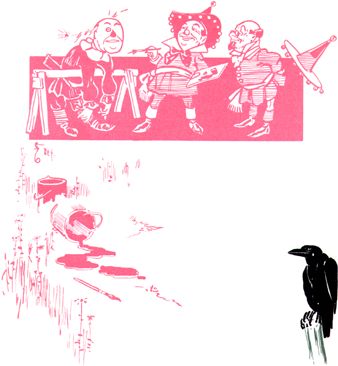
At some point I decided that it was almost always better to have some sort of picture of every slide, just to maintain visual interest. And if I thought about it I often came up with a suitable illustration, but not always. So one year I tried an experiment: have the slide-building software detect slides with no illustration, and automatically insert one at random into the margin.

As a committed Dadaist, I expected that this would produce delightful conjunctions of illustration and text, sometimes inane, sometimes perplexing, but every once in a while something amazing, hilarious, or profound that I would not have thought of on my own. The class was Tricks of the Wizards and I gathered W.W. Denslow's spot illustrations from the original 1900 edition of The Wonderful Wizard of Oz.
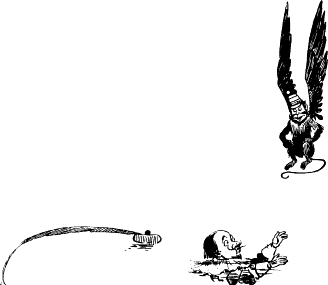
It didn't work. The random illustrations were just confusing. I never even bothered to test it on a live audience.
Here's one reason why I love Tim Gowers: he's really humble.

The standard presentation, above, demonstrates that the Petersen graph is nonplanar, since it obviously contracts to !!K_5!!.
To someone not versed in graph theory, this not only isn't obvious, it's unintelligible. In fact, it's indistinguishable from a meaningless parody:
The Cosell configuration, shown above, is semispatulated, since it obviously extends to a !!\zeta!!-complete net.
The amusing web site arXiv vs. snarXiv demonstrates this beautifully. It presents you with titles of two physics papers, one real, and one generated at random, and invites you to guess which is the real one.
I got six out of 10 correct, partly by luck. As it says, this is better than a monkey. Or at least a less-lucky monkey.
How about Occam's Weasel?
We leave recyclables for collection on the street in a place near the entrance to the home of neighbor A. Neighbor A has been complaining for some time about an unknown person who leaves bags of recyclables outside her door, because the collectors will not take bagged materials, only materials in bins. Then A has to deal with the bags herself.
Today while picking up my bin I noticed this had happened again. The collectors had come but had left behind a bag of bottles and cans and a second bag of shredded finanical documents. I examined the shreds for a while and observed that they had belonged to neighbor B. Then I carried the bags back to B's house and left them at her door so that A would not have to deal with them.
I wonder if I should suggest to B that she should consider replacing her office shredder with a cross-cut model. But I cannot think of a tactful way to do this. “You should take greater care to keep snoopers like myself from reading your private documents” seems like the wrong thing to say. Perhaps the return of the shredded documents will give her a hint and I should say nothing.
Web blog website was extensively probed yesterday. This is a common occurrence, but this probe had some peculiar features.
All the probes came from the same address, 42.51.216.29.
The 3,300 probes were mostly against URLs like
/admin/index/phpand/admin/index.aspx. Usually, attackers have a list of paths at which there have been past security holes. This attacker seems to be hoping to discover something new. (Every one of them was 404.)There were a number of requests for random-sounding pages ending in
.jpg, such as/tsnFile/UserFiles/Image/diaosi.asp/bdddf17533.jpg. If this was intended to disguise the activity, it wasn't doing a very good job. A bug?The referring-url was
http://www.nmily.com//Ac2.asp;.jpg. Generated at random perhaps? Some of the probed URLs were things like/Ac2.asp;.jpgand/sjurj54220.asp;.jpg.The claimed user agent was
Mozilla/5.0 (compatible; Baiduspider/2.0; +http://www.baidu.com/search/spider.htmlFollowed by the bytes 0xA3 0xA9.
When I did a reverse DNS lookup on the client address, I got the nonsense hostname
idc.ly.ha. There is no such domain.ha.HAis not even a valid ISO 3166 country code.When I did a traceroute, I saw what was going on with
idc.ly.ha:11 219.158.101.222 (219.158.101.222) 271.170 ms pc146.zz.ha.cn (61.168.250.146) 229.898 ms 219.158.101.222 (219.158.101.222) 271.159 ms 12 hn.kd.ny.adsl (182.118.124.66) 233.331 ms pc130.zz.ha.cn (61.168.37.130) 287.333 ms 276.773 ms 13 pc146.zz.ha.cn (61.168.250.146) 273.772 ms htuidc.bgp.ip (103.22.188.98) 237.818 ms 238.415 ms 14 * * hn.kd.ny.adsl (182.118.124.66) 278.467 ms 15 htuidc.bgp.ip (103.22.188.98) 276.015 ms * 276.096 ms 16 * idc.ly.ha (42.51.216.29) 465.040 ms 419.584 msSomeone is running a bunch of hosts (botnet maybe?) and advertising PTR records with random hostnames. (There is actually a
.ha.cn, but I doubt it is really involved.) Or do the returning ICMP package have fake source addresses?
It's all pretty weird.
Gigazine has published an article that discusses my earlier article on how to explain infinity to kids. It is in Japanese. I have learned that my name, transliterated into katakana, is マーク・ジェイソン・ドミナス.
At first I was pleased to see that the article had been written by someone who appeared, at least from their name (Mikael Leppä) to be Finnish. But then I realized that no, that was just the picture credit on the illustration to got from Flickr. So disappointing! Probably the article was written by some Japanese person.
Unless I am mistaken the color blue is not mentioned in the New Testament. I don't know what significance this might hold, being mostly ignorant of hermeneutics, but perhaps there is some.
Blue appears many times in the Old Testament, mostly in connection with ephods, which I have already explained.
Today's blog post about what to say when a kid asks you “what is infinity?” reminds me of something that I have been angry about for years. My family once went to visit some old friends. During the visit, two of our hosts had the following exchange:
Seven-year-old-daughter: Why is the sky blue?
Mom: Because God wanted it to be blue.
Holy fucking cow, even stipulating that these nice folks' religion is literally true and that this answer is literally correct, it is a terrible answer because it answers nothing; they might as well say “shut up, kid, and don't ask questions.” Just saying “I don't know” is a thousand times better than this.
If you believe, as perhaps this mom did, that God is the almighty lord and creator of the universe and the most important subject of human attention, and that her answer is correct, then it is important to consider the immediately following question:
Why does God want it to be blue and not some other color?
Does God prefer blue? Is blue better? Is there a moral or theological reason why it should be blue? We know from the Bible that God's truth wasn't revealed all at once; there were later revelations. Maybe next week someone is going to realize that the blueness of the sky is really an important communication from God about something, and we should have been paying closer attention to it. (This is well-precedented; see for example Gen 9:13, Exo 10:22, Josh 10:13, the famous vision of Constantine.)
Or perhaps Mom is wrong and God doesn't want it to be blue! A standard explanation for certain features of the world is that they are the work of Satan and are contrary to God's wishes. Could the blue sky be one of these? Was the prelapsarian sky some other color? Should we be trying to correct this? And how can we be sure which it is? How could it be unimportant whether the blue sky is the work of God or Satan?
Supposing that the blue sky is part of God's plan, shouldn't we try to understand this as we do the rest of His plan? What alternative is there? Who could be so presumptuous as to say “The almighty lord and creator of the universe made the sky blue for no reason at all, it was an arbitrary choice” or “God's plan is all-important, but not this particular part, which is merely an unimportant detail.”
And one might go a step farther with the next question:
How does God arrange that thy sky is blue?
Did God command Sherwin Williams to deliver unto Him one hundred trillion gallons of sky-blue paint? No, of course not, I'm just being silly. The actual answer is surprisingly complex: God's plan includes Rayleigh scattering. Now we should ask, why does God want Rayleigh scattering?
Religion can be used for good or for ill. It can be used to further inquiry, or to terminate its own understanding. There are varieties of religious feeling that are thoughtful, and others that are lazy and thoughtless, and disdainful of even the questions that religion itself claims are supremely important. To make oneself more lazy and thoughtless than necessary is not piety. It is despising the gifts of the bountiful God, who giveth us all things richly to enjoy.
Here's how Twitter excerpted one of the illustrations from a recent blog article:
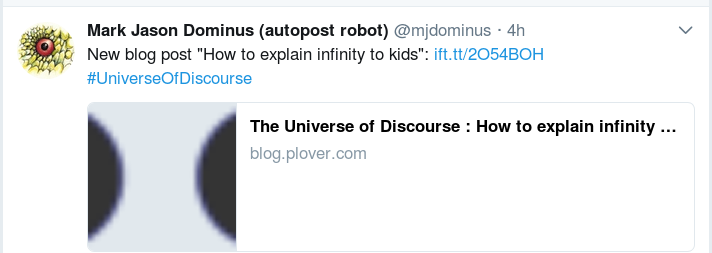
Here's the original illustration:

Via Pervocracy: “I found it: the best scientific diagram”.
Can we infer from Wesley's name that he and Dr. Crusher are Methodists?
(Asking such questions is perilous, because someone might show up at my door with a 58-page summary of past and current scholarly thought on the subject.)
From Chris Siebenmann's blog:
The reality of sysadmin life is that in many situations, there are too many obvious problem causes to keep track of them all.
I recommend this blog.
Orin Kerr of the Volokh Conspiracy blog has written an article on how to read a legal opinion. I have found reading federal court opinions fascinating and educational. U.S. federal judges are almost always intelligent and thoughtful, and excellent writers. I recently wrote:
Even when I disagree with the decision, I almost always concede that the judges have a point. It often happens that I read the decision and say “of course that is how it must be decided, nobody could disagree with that”, and then I read the dissenting opinion and I say exactly the same thing. Then I rub my forehead and feel relieved that I'm not a federal circuit court judge.
As dense technical material, law opinions are unusual because their underlying topics are public policy issues that affect everyone, or everyday issues as property disputes and interactions with the police. So they have a relevance that, say, scientific or engineering material does not. If you really want to know what the Supreme Court said recently in connection with Masterpiece Cakeshop, you are not going to do better than to read what they actually said about it.
But like other dense technical material, court opinions are full of obscure jargon. Kerr's article explains the most important parts of this jargon and describes the overall structure of the opinions. If you think you might be interested in reading some Supreme Court opinions, but you find it hard to get your feet under you, you might give Kerr's article a try.
The Philadelphia Inquirer reports today:
The Pennsylvania Supreme Court on Friday ordered the release of a redacted copy of a highly anticipated grand jury report on clergy sexual abuse, one the court said identifies more than [some number of] “predator priests”
The number boggled me.
It was given as “more than 300”. Holy cow. And this is only for six of Pennsylvania's eight dioceses. Philadelphia and Altoona-Johnstown were investigated previously.
Had I been greatly underestimating the number of priests in Pennsylvania, I wondered. No, there are 792 in the Philadelphia Archdiocese and 207 in the Pittsburgh Diocese. The six dioceses in the report couldn't have more than 1200 priests total.
I am speechless with rage and disgust.
[ Addendum 20180817: I tried to estimate what fraction of all priests were mentioned in the report and guessed around 6%. ]
Another writer I was able to track down was Isabelle C. Chang, author of the Chinese Fairy Tales I had enjoyed as a child.
I learned that Chang had been an indirect but important contributor to the development of the combined oral contraceptive pill. The National Academy of Science biographical memoir of her husband, Dr. Min Chueh Chang, says:
Much credit must be given to Chang’s talented wife for her willing acquiescence in the role of a Confucian wife as her part in enabling Chang to develop his full potential unhindered by domestic concerns.
Ms. Chang worked as a writer and librarian, raised their three kids and took care of their house, while Dr. Chang worked relentlessly and successfully on the problem of using steroids for birth control.
One of the authors I rescued from the ruins of my childhood memories was C.A. Stephens. I had read one story of his, called “The Jonah”, and found it delightful. An earlier draft of this article recounted the story, but it is better for you to read it yourself. The background is that five cousins, are living with their grandparents on a farm in Maine, and the grandparents are out of town for the week.
Thanks to the Internet, I was able to find out who wrote this, and get his books out of the library. Not all the stories were as delightful as that one but many of them were, and now I am a C.A. Stephens fan.
Check it out.
An important thing to keep in mind is that the old-style imperial fuckload is actually 14% larger than the metric fuckload.
AO3 has only one story about Mondamay the Potter, and it is in Russian.
Also, where the hell is my Sonar Taxlaw fanfic?
By the way, Martin Wells says, in Octopus: Physiology and Behaviour of an Advanced Invertebrate (Springer, 1978) that contrary to popular report, octopuses cannot learn to open jars:
Crabs can be wrested from containers (Pieron, 1911; Schiller, 1948; Cousteau and Diole, 1973) but the results appear to be achieved by chance and there is little indication that the octopus can learn to deal with the situation more efficiently with practice. The animal approaches and struggles with the apparatus until something happens; if it learns any-thing as a result of its experience it is only to be more persistent and vigorous.
(p. 241)
There may have been further developments since 1978, of course.
Yesterday I went to breakfast at a restaurant and unexpectedly ran into Lorrie who was just finishing her own breakfast. I brought Placido the octopus out of my bag to say hi, and she took a picture of him sitting on my shoulder.
The waitress happened by and asked “what is that for?”
I said “Catching crabs. Opening jars. Hiding in small spaces.”
I don't know what she was asking, but that seemed to satisfy her.
I want to use this story in a future article about novices with inaccurate mental models.
When I was a young teenager, I had a Commodore 64 computer. It could do bitmapped graphics. You would tell it which pages of memory should be displayed on the screen, and then poke bytes into that region of memory to switch the dots on and off. I had a lot of fun with this.
I did not have a dedicated monitor. Instead I had an old color TV that the computer used as a display. There was a device on the back of the TV that switched it between displaying the computer output and displaying the received TV signal. One day I had a wonderful idea: I would switch the device to TV mode and put on some TV program — I imagined Star Trek specifically. Then instead of poking data into the computer memory to make dots appear on the screen, I would read the memory into a file to get a screenshot of the TV program.
I didn't expect that this would work well; I thought if it worked at all there would be a huge amount of sampling skew, because the TV image would change drastically during the memory copying process. But I hoped the results might be interesting anyway, and at least part of it might be partly recognizable.
Of course, it didn't work at all. The connection from the computer to the TV was entirely one way. The device on the back of the TV was an RF modulator, which transformed the computer's video output into a fictitious radio signal that the TV would interpret. Switched into the TV position, the computer's video output went nowhere. In no case was the TV image accessible to the computer. My program to read the contents of the bitmapped memory read nothing but zeroes.
I think it's useful to remember times like this when I was so utterly confused about what was really happening.
I was once talking to a recruiter about some programming job. He asked me to rate my programming skills on a scale of 1 to 10.
I was perplexed. “How is that distributed? Should there be an equal number of people in each group? Or does someone get a 10 if they're five standard deviations above the mean? Or what?”
Now he was perplexed. “Uhhh, nobody's ever asked me that before. Just interpret it how you like.”
“In that case I'm a 10.”
Another cool piece of Dionysian paraphernalia is the thyrsus (from Greek θύρσος) which is a staff topped with a roughly conical plant part, canonically (cononically?) a large pine cone, but it could be a flower or an artichoke or something like that.
I have sometimes toyed with the idea of carrying one around, but it seems like it would be more inconvenient than useful.
In Doorways in the Sand the donkey is named “Sibla”, which I was thinking would be a good name for the donkey of Silenus. But then I remembered that actually Sibla is not really a donkey, but an impostor. (“The real donkey is tied up out back,” he says.) Probably Silenus had a series of donkeys, each named differently. What did they do with the donkeys when they died? (Peacfully, I imagine, at advanced ages.) I hope they buried them honorably.
One of my favorite lines from the book is in connection with Sibla:
"Go to hell," I said. "My uses for telepathic donkeys are limited.”
Haven't we all felt that way at one time or another?
I find that somehow, in twelve years of blogging, I have never mentioned Doorways in the Sand. I will have to discuss it at some point.
Today a co-worker mentioned the word “euouae”, which are a certain type of hymnal cadence. I thought I knew what this was but I was mistaken. I had it mixed up with “evoe”, which is the frenzied cry of the maenads (from Greek εὐοῖ). I first encountered this word in Zelazny's Doorways in the Sand, of all places. The protagonist is at a bacchanal party, also attended by the requisite donkey, and:
A sleepy-eyed girl seated near the hanging beads suddenly sprang to her feet, tearing at her hair and blouse buttons, crying, "Evoe! Evoe!" the while.
The girl does not appear again, but the donkey is a plot point. If there is a canonical name for Silenus’ donkey, I do not know it.
Similar but not related is “ululation”, which is just what it sounds like, a long wavering howl. This onomatopoeic word is very old. It is not, however, related to uvula, which is Latin for “little grape”.
To me “ululate” suggests that there ought also to be “ululatrix” and perhaps also “ululatorium”. If I wrote a novel it would be full of this sort of nonsense.
“Shock: Some Jersey Shore boardwalk games are fixed, inspectors say”
Ground penetrating radars use radio signals that are capable of penetrating into the ground…
(“Underground Lake Found On Mars Beneath A Mile of Ice”)
The thing about technical experts in filth reminded me of something I've wondered for a long time.
Form 1040 (which is the principal individual tax reporting form in the U.S.) has a space at the bottom for “Your occupation”. I usually fill in “computer programmer”.
But what does Alex Rodriguez put there? Does he write “shortstop”? (Or, now, “retired shortstop”?) Or something less specific?
If I were a shortstop, I would definitely want to hand out business cards that said “shortstop”.
Last year someone asked an interesting but off-topic question on math stackexchange:
How voltage drop occurs in a resistor?
So I was getting confused over a thought, say I have a resistor and we have 10V source across it, now when electrons flow from negative end to the positive end they lose 10 joules of energy as they flow through the resistor, now with all the weird and crazy quantum stuff happening inside the wires how can we exactly predict how much energy an electron is going to lose that precise amount of energy when it passes through the resistor, can’t it do this - lose 5J of energy inside the resistor and continue with 5J energy left ?
Well, that is a good question, and I didn't really know the answer because I know very little about physics. But I thought about it and thought maybe I had the explanation, so I replied in the comments.
The question was later deleted, but I saw it again recently and thought that my explanation was worth preserving, so here it is:
I think the answer is going to look like this: if you throw a handful of fine sand, all the grains identical, off of a 100m cliff, some grains might fall straight down, some might be caught by the wind and whirled all about, but every single one will lose exactly !!100g/m!! joules per kilogram, where !!g!! is the acceleration of gravity in meters per second squared and !!m!! is the mass of a grain.
Three hours later:
Considering this more, I think the analogy is pretty good. The 10J loss (actually 10eV, but the principle is the same) is not a property of the resistor but of the power source. You can replace the resistor with any other resistor — bigger, smaller, different shape, different material, whatever — and the energy loss per electron will not change. The electrons lose 10eV each because the power source is a 10V source. This does not mean that it imparts 10eV to each electron; it means that the energy difference between its two terminals is 10eV per electron. The energy measurement is relative.
“Per electron” in the next-to-last sentence is wrong, but I think the rest of it is pretty good. In particular, my point about how the energy loss is not a property of the resistor. The energy loss is the same, regardless of the resistance; this is Kirchoff's voltage law. If you replace the resistor with one of lower resistance, the energy drop through it is still exactly the same (per electron), but the voltage source is able to push electrons through it at a greater rate; this is Ohm's law.
According to the U.S. Food and Drug Administration's Defect Levels Handbook:
In this procedure, FDA's technical and regulatory experts in filth and extraneous materials use a variety of criteria, often in combination, in determining the significance and regulatory impact of the findings.
Now I want business cards that say “technical expert in filth and extraneous materials”.
There are several similar-looking species of yucky pond-infesting green algae that can only be distinguished with a microscope.
Spirogyra can be recognized because its chloroplasts are arranged in helices:
But Zygnema has star-shaped chloroplasts:
And Mougeotia has ribbon shapes:
To the the naked eye they all look like slimy green mats.
This is on my mind because over the weekend Toph and I camped in Parvin State Park, which boasts a swimming area in their lake. The swimming was not good, in large part because the lake is filled with slimy green mats.
The Protist Information Server at Hosei University is the source of the Mougeotia image above, and has many additional images of all sorts of yucky green slime. The Spirogyra image and Zygnema image are from Wikimedia Commons; Zygnema is by Bob Blalock of English Wikipedia.
This field guide to scum, by M.S. Kannan and N. Lenca of Northern Kentucky University, was comprehensive and interesting.
Mozart wrote a canon titled Leck mich im Arsch, which means what you think it does.
Also, the Wikipedia article about this begins with the hatnote:
For the Insane Clown Posse recording, see Leck mich im Arsch (Insane Clown Posse song).
which is not something I expected to see.
Estimating quanities like !!\log_2 3!! is easier than it looks, if you know a couple of tricks. In the previous article I said:
I estimated that as 1.6 off the top of my head just by half-assing it: !!2^{3/2} \approx 2.828!!, so it must be a little bigger than !!\frac32!!, which it is.
I really did do it in this ridiculous way, starting from !!1.5 \Rightarrow 2.828!! and then adding a fudge factor to get !!1.6 \stackrel?\Rightarrow 3!!.
(The !!2.828!! is because !!2^{3/2} = 2^{1/2}\cdot 2 \approx 1.414 \cdot 2 = 2.828!!, and memorizing !!\sqrt2\approx 1.414!! is something everyone does in high school.)
I could have arrived at the same answer by a slightly less fudge-flavored route: $$\begin{align} 256 = 2^8 & \approx 3^5 = 243\\ 8\log 2 & \approx 5 \log 3 \\ \frac85 & \approx \frac{\log3}{\log2} = \log_2 3. \end{align} $$
Using a slightly less cruddy initial approximation, !!2048 = 2^{11}\approx 3^7 = 2187!!, we get !!\log_2 3 \approx \frac{11}7 = 1.5714\ldots!!. The correct value is !!1.58496\ldots!!. Incidentally the computer informs me that !!524288 = 2^{19} \approx 3^{12} = 531441!!, yielding the approximation !!\frac{19}{12} = 1.5833\ldots!!, but I did not know either of those off the top of my head. I only know the powers of !!3!! up to !!3^7!!, or maybe !!3^8!! on a good day.
We can similarly notice that !!125 = 5^3 \approx 2^7 = 128!! and so estimate that !!\log_2 5 \approx \frac 73!!; the correct value is !!2.322\ldots!!.
File this under “lower mathematics”.
I spent some time over the last couple of days trying to estimate the number of smooth numbers up to !!N!!. (An !!n!!-smooth number is one whose largest prime factor is no larger than !!n!!. So the 2-smooth numbers are exactly the powers of 2, and the set of 3-smooth numbers contains exactly the numbers of the form !!2^i3^j!! and begins !!1, 2, 3, 4, 6, 8, 9, 12, 16, 18…!!.)
Let's write !!f_k(n)!! for the number of !!k!!-smooth numbers up to !!n!!, so for example !!f_3(19) = 10!! and !!f_2(19) = 5!!, as above. Then obviously !!f_2(n) = 1+\lfloor \log_2 n\rfloor!! exactly.
(Incidentally, I think there ought to be a simpler notation for !!\lfloor \log_k n\rfloor!!, which comes up really often.)
After hacking around a bit, I settled on $$f_3(n) \approx \ell_3(n) \cdot f_2(n) - \frac{\ell_3(n)-1}{2} \left( \ell_3(n)\log_2 3 - \frac12 \right) $$
where !!\ell_3(n) = \lceil \log_3 n\rceil!!. I expect I can express !!f_5(n)!! in terms of !!f_3(n)!! in similar fashion but haven't yet tried. The may still contain some silly errors (I corrected a bunch), but at least the computer says it is not too far off. For example the approximation guesses !!f_3(10^6) \approx 139.4!! and the correct answer is !!142!!.
I wanted something I could compute in the woods with no calculator, because Toph and I went camping this weekend and I had my phone off and didn't want to turn it on. I think the formula above answers the requirement pretty well. Note that calculating !!\ell_3!! exactly is quite easy, much easier than calculating !!\log_3 n!!. The only possibly tricky bit is the !!\log_2 3!!, which I should have memorized but don't. But in the woods I estimated that as 1.6 off the top of my head just by half-assing it: !!2^{3/2} \approx 2.828!!, so it must be a little bigger than !!\frac32!!, which it is.
This formula comes without absolutely no warranty, not even the implied warranty of merchantability or fitness for a particular purpose.
I remember we used to make jokes that went something like “What's the scariest thing you'll find wandering the halls of the engineering school? A programmer with a screwdriver.”
But we were wrong. A programmer with a screwdriver can only do so much damage. To really fuck things up, a programmer needs a keyboard.
Years and years ago I gave a tutorial the the Perl Conference called Tricks of the Wizards. (I should really make that publically available. Someone please remind me later.) In this talk I was careful to explain that I was not, myself, a wizard; I was only presenting the tricks of the wizards. Wizards canonically wear large pointy hats with astonomical figures on them. Lorrie made me a small hat with astronomical figures.

But a few years later at YAPC, Larry Wall gave a keynote in which he analogized different members of the Perl community to characters in Lord of the Rings, and admonished us to not underestimate the hobbits. Talking to Larry afterwards, he remarked that I was one of their best elves.
“Really?” I said. “I think of myself as clearly a dwarf, crafty and irritable, toiling alone in my underground cavern, forging marvelous jewels for myself and magical tools for other people to use.”
Then Larry paid me a compliment I will treasure my whole life. He said that I was a wizard, because the role of wizards is to be able to get separate groups to work together, by virtue of not being part any group themselves.
Well then! If Larry Wall said I was a wizard, I was a wizard. I eliminated the disclaimer from my talk, and I asked Lorrie to make me a full-sized hat:

She also made one for Placido the octopus, who accompanies me to all my conference talks.

Devised by Bill Wright, the basic format of [British television quiz show] Mastermind has never changed… . Wright drew inspiration from his experiences of being interrogated by the Gestapo during World War II.
I have been waffling for several days about whether to post this. Argument in favor:
I really like this command! A lot!
Argument against:
I don't understand why, since it doesn't actually do anything.
It's called do-over and it's just a glorified loop. You say
something like
do-over command args....
and it replies
Hit <enter> to start
When you hit enter, it runs command args, and then it prompts
again:
Job completed in 12.3s
Hit <enter> to re start
If someone else were showing me this, I would ask:
Why is this better than hitting the up-arrow and then enter?
or possibly
Why is this better than
while read x; do command...; done?
I have no answer to these questions. But I have done a lot of both of those other things, and I like this better, although I don't know why.
#!/usr/bin/perl
use Time::HiRes qw(time);
print STDERR "Hit <enter> to start\n";
while (1) {
my $x = <STDIN>;
last unless $x;
print STDERR scalar(localtime()), "\n";
my $start = time();
print STDERR "running @ARGV\n";
system(@ARGV);
my $elapsed = time() - $start;
printf STDERR "Job completed in %.1fs\n", $elapsed;
print STDERR "Hit enter to restart\n";
}
I was looking at a map of West Virginia and I saw there is a town named New Vrindaban. “That's a surprising name for a town in West Virginia,” I said, so I looked it up. Aha, it was founded by ISKCON, now it all makes sense.
It is that case that $$\sqrt5\frac{\text{mile}}{\text{hour}} = \frac{\text{m}}{\text{s}}$$ almost exactly, so of course also $$5\frac{\text{mile}}{\text{hour}} = \sqrt5\frac{\text{m}}{\text{s}}.$$
I would find this more delightful if it hadn't just caused me so much confusion. I couldn't figure out whether I was supposed to multiply or divide because the number was the same both ways around. Still it might make a useful mnemonic, if I could remember which way around it was.
There was a political party in Zimbabwe called “Movement for Democratic Change – Ncube”. Unfortunately it seems to have nothing to do with actual N-cubes; it is named for MDC founder Welshman Ncube, who also seems to have nothing to do with actual N-cubes.
Disappointing, but nothing compared to my childhood discovery that the biblical Book of Numbers had nothing to say about actual numbers.
A couple of times I have witnessed discussions of what mathematical term is the most off-color or indecent-sounding. Of course someone always mentions the hairy ball theorem immediately and this is usually acclaimed the best (worst?).
But in my opinion the winner is “the class of forbidden minors”.
“Symplectic”. What the hell does it mean? As far as I can tell, nothing.
If you have a system of vectors, and you want a related system that spans the same space but is pairwise normal, you should obviously normalize the system.
No that's completely wrong. You can normalize them, but it won't help. If you want them to be normal, you have to orthogonalize them.
That sucks.
Today I got a LinkedIn invitation from someone (that I don't know) whose description reads as follows:
About US
Working at the crosswords people and transformative technologies, [our company] Delivers innovarive business solutions - powered by top talent - to help organizations reach their strategic and realize opportunities now and in future.
Except to redact the company name, I did not change a word of this.
I had to ask around to find out whether this was a parody account, posted in mockery of LinkedIn itself, because if so, I love it. But at this point I think it is sincere. I almost want to start my own parody account, but I don't think I could do it this well.
Last night I had a dream in which I was telling the following hilarious joke:
Once upon a time in Russia, the Tsar owned a magnificent handmade clock. It covered almost an entire wall, and was marvelously ornamented, with two accompanying decorations, resembling religious icons, to be hung on the wall flanking it.
There was a merchant who coveted the clock, and one day, unable to resist any longer, he hired some thieves to break into the Tsar's palace and steal the clock, which he then hung in his own home.
The very next day, who should happen by but the Tsar himself, with his retinue and bodyguards. Of course it would have been unforgivably rude to turn away that Tsar, so the merchant reluctantly invited him in.
The Tsar gazed at the clock on the wall. “That is a magnificent clock,” he said at last. Not knowing what else to say, the merchant agreed.
“I have one just like it,” said the Tsar.
That was the punch line.
Dreams. (Shrug.)
I'm sorry I used this now that every one of my hairs is perpendicular to my scalp.
I was not intending to be known as “MJD”. It happened by accident.
When I got my first full-time job, as a Unix system administrator, my
boss, Mark Foster, asked me what username I would like. He had
mark, so that was unavailable.
At college I had had entropy, but I wasn't sure that would be
appropriate.
(The first time I chose my own username I was unprepared for the
question. I sat there staring at the screen for two minutes, unable
to think of anything good, and finally, wanting only to move on,
entered puswad. Some months later that admin of that lab asked if I
would be willing to change my username. He had to include it on
reports that he gave to his boss about the lab, and felt embarrassed
every time he saw it. Hence entropy.)
Mark assured me that entropy would not be a suitable email address
for a staff person. Thinking of the ilustrious history of dmr and
rms and so forth, I suggested mjd and the die was cast.
What I wasn't expecting was that people would start calling me that. For a long time I resisted it. “That is not my name,” I would say. “It's just my email address.” On chat systems I would always choose something else because I didn't want to encourage the trend of people calling me “MJD” to my face.
But I didn't want to change it, and eventually, I gave up. Now, many years later, it seems very natural for people to call me “MJD” and I am sometimes startled when they don't.
My first Unix username was dominusm, assigned by some other person
or perhaps an automatic process. My colleagues David Hiebeler and
George Kyriazis were similarly assigned hiebeled and kyriazig.
This infuriated me. Eight characters were available, so why not
hiebeler and kyriazis? Why mangle people's names for a foolish
consistency? I resolved that if I were ever in charge of assigning
usernames, I would do a better jobs, and eventually, I did.
One day I was trying to type telnet but my left hand was on the
wrong position and I typed yrlnry by mistake. When Dada lightning
strikes like that, I take it seriously. On IRC I was yrlnry for
many years. The only thing that prevented me from using it more widely
is that people seem unsure how to pronounce it. (/yuril-nury/)
Another benefit: since it's hard to prounounce, people wouldn't try to
call me that when they met me.
But I usually prefer to use my real name. I don't (usually) want to be pseudonymous, and I think “Mark Dominus” is a great name. I often find nicknames silly, pompous, or juvenile, and I often find myself feeling embarrassed for people who use them. It is tempting to insert some especially painful examples here, but one of the rules of this blog is: no mockery of any specific and identifiable private persons. But maybe you can imagine me cringing when I think of someone who goes around calling himself “Elrond”.
On Math Stackexchange I originally used “Mark Dominus” but then I found to my distaste that Google searches for my name turned up my SE contributions and nothing else, so I changed it to “MJD”. The SE thing reminds me of something related. There is a certain class of SE user that chooses as their avatar a picture of David Hilbert or Georg Cantor, which I would never dare do. It seems conceited and vainglorious. I make plenty of dumb mistakes and I do not want to make them right above a picture of Niels Henrik Abel. I chose my own avatar specifically to get as far as possible from that:


I think this is hilarious.
A few months ago I noticed that they keyboard app on my Android phone was getting slower and slower. Every time I wanted to type something, I would have to wait a couple of seconds for the keyboard to pop up. And it kept getting updated with new awesome bells and whistles. Oh boy, a button for automatically inserting an animated gif, <sarcasm>what a great idea </sarcasm>! Oh boy, today it's taking up precious screen real estate to show me the Google Doodle of the Day.
Fortunately there is an option to revert the app back to the
pre-installed version. I did that and right away it was faster!
There was one feature that I used that it lost, but I don't remember
what it was, so it couldn't have been important. My keyboard app is
now 19 weeks behind and everything is much better.
The keyboard pops up right away, evey time!
As Geoff
Pullum observed so long ago, “upgrade” actually means
“downgrade”.
I also stopped updating any app I don't actually use. Obviously updating such was never more than a waste of time, but there is an additional benefit to not doing it. Updates might add useful features or perhaps even performance improvements (ha) but they might also add changes that the owner considers a feature that have negative value for me, such as enhanced passive snooping. If I don't use the app, the useful features have no value. Perhaps I can't get the app off my phone entirely (why the hell not?), but at least I can prevent the owner from enhancing their passive snooping.
I do tolerate the awful Uber app on my phone, just barely. But
[ Author's note: I forgot I had been writing this, but it popped up when I was about to publish the following post, three weeks later. Okay! I think I will finish the thought: The Uber app gets slower and worse and less reliable with every update, and since the first version I downloaded does what I want, namely, call Ubers, I see no reason to update it. Every update makes it more likely that it will fail at a crucial moment. So I downloaded it once onto my current phone, and never since then. It's probably been spying on me since I got it, because Uber is evil, but at least I have opted out of any new spying that they have thought of since then. ]

In the 1960s my grandparents were involved in the (successful!) effort to integrate the public elementary schools in Teaneck, NJ. One of their most virulent opponents was a man named Warner. (My grandfather said “as I remember all the time that Harry Warner was complaining against busing, he sent his kid to a private school way up county where he had to be bused every day.”) My grandmother was a writer, and one way she dealt with her feelings about Mr. Warner was to go home and write a detective story in which Warner was the murder victim.
So as not to invite further attention from this vicious and bitter man, she changed the character's name to Wagner, or Wapner, or something of that sort.
But when the story was published, her editor, without informing her, changed the victim's name to “Warner”. When my grandmother saw it in print, she was appalled.
Fortunately nothing ever came of it. But my grandmother told me that she had learned her lesson. “If you want to disguise the name of someone named Warner,” she said “you don't change it to Walker; you change it to Brzezinski.”
DEAR PHILADELPHIA CITTY PLANNING COMMISSION:
Philadelphia's east-west streets are famously named for trees, ever since the time the city was planned by William Penn in the 1680s. Chestnut, Walnut, Locust, Spruce, and Pine are major streets. Race Street was formerly named Sassafras, and Arch used to be Mulberry. South Street was formerly Cedar, and in West Philadelphia the street at that position is still Cedar. West Philadelphia also has Osage and Larchwood Avenues.
My previous shitpost depicted a spruce tree, at the intersection of 45th and Pine Street. There are some osage trees near where I live, but none of them is on Osage Avenue. I know where there are some cedar trees, but they're on Spruce. I know where there are some other spruce trees, but they're on Pine. There are a bunch of mulberry trees, but they are all on Ludlow. (There used to be some on 46th but they were cut down.) My courtyard has eight big locust trees, but it is not on Locust Street; it is between Spruce and Pine.
I don't think there are any walnut or chestnut trees at all. Most of the trees around here are London Plane trees and we have no Plane Street and no Sycamore Street.
NOT VERY GOOD PLANNING IS IT NOW? PLEASE DO YOUR JOB AND FIX THIS AT ONCE.
OR SUFFER THE UNSPEAKABLE CONSEQUENCES
On the corner of 45th and Pine Street is this tree:
The new tufts of needles grow out of the twigs with these little protective hats on them. Once the tufts are all the way out, the hats fall off.
Note that despite the location, this is not a pine, but a spruce. Spruce street is one block over.
So I was out in Cleveland last week looking for breakfast, and there was this place in Public Square that I was about to go into, but it had this on the door:
That seemed to me to be clear a signal as any that they wanted someone else's business and not mine, so I took the hint and ate at the anti-vaxxer place down the street.
Here are the volume graduations on the tank of my Water-Pik:
Now what is going on here?
I measured the heights of the marks in pixels in the photo:

| OZ. | ML. | pixels |
| 600 | 1094 | |
| 19 | 963 | |
| 500 | 838 | |
| 16 | 707 | |
| 400 | 590 | |
| 12 | 456 | |
| 300 | 335 | |
| 9 | 199 | |
| 200 | 86 | |
| 6 | -50 |
Then I ran linear regressions.
For the milliliters values, the line is $$\text{px} = 2.59\text{ ml } -419$$ with a correlation of 99.9988%. Fair enough.
For the ounces values, the line is $$\text{px} = 76.5\text{ oz } -495$$ with a 99.86% correlation. That slope of !!76.5\frac{\text{px}}{\text{oz}}!! is exactly the same as the !!2.59\frac{\text{px}}{\text{ml}}!! slope in the previous line. If we correct the two suspicious ounce numbers from 16 and 19 to 15 and 18, the correlation goes up to 99.9988% but the slope increases to !!84.5\frac{\text{px}}{\text{oz}}!!.
I guess the next step would be to measure the amounts but
Addendum: That's the point at which I lost interest and broke off mid-sentence. It's now about 24 hours later and I've decided to publish what I have.
Enjoy!


Is there a word for when you have an idea that is a really good idea, but you feel dumb for not thinking of it sooner, because it seems so obvious once you have it?
A few years ago there was this variety of pasta sauce we used to eat a lot that had chnuks of Italian sausage in it. Then the brand discontinued that variety. For a long time I would look forlornly to see if it had come back on sale. Other brands make a similar type of sauce but we didn't like them as much.
Today I had my idea: I could buy the same brand of sauce, and a package of Italian sausage, brown the sausage and put it into the sauce myself. Victory! But I feel dumb for not thinking of it sooner.
OR SUFFER THE UNSPEAKABLE CONSEQUENCES
After I told my wife that riddle (and she has to put up with this kind of thing all the time) she pointed out that “butterer” was also a word.
I said “And someone who even more of a butterer is buttererer!”
She rejected this.
“Okay, then the person who is in charge of appointing people to the position of butterer is the buttererer.”
She grudgingly agreed to that.
Q: What's more butt than butt?
A: Butter!
Lately I have been getting messages that look like this:
Dear owner of http://slatestarcodex.com,
I am the owner of [some other site]
I came across your website, http://slatestarcodex.com, and absolutely loved it! The things are, I write on topics very similar to those covered in your blog, and I already have a few ideas for a guest posts in mind that I'm sure will be interesting for your readers.
I was wondering, do you accept guest posts? If you do so, are there any guidelines for me to check out?
I'll be happy to discuss any guest blogging opportunities with you!
Looking forward to hearing from you soon,
which would be annoying if they were asking about my actual blog and is ten times as annoying when they are asking about someone else's blog that I have nothing to do with.
How can I fuck with these people most effectively? Should I invite them to submit articles for publication, and then ask for revision after revision until they give up? What are these folks actually trying to accomplish?
Don't try to put a ham up your ass.
A few jobs ago, I was talking with some so-workers about something or other, and I mentioned something or other that had happened to me when I was at math camp.
One of them exclaimed, incredulously, “You went to math camp?”
I did go to math camp. Me! Of all people. I know it's hard to believe.
… at an event at my kids' school this evening:
Until my post a few days ago I had never tried to write a lipogram. The idea filled me with ennui. It seemed so tedious. But a two-sentence comment on math.se was my gateway drug. The blog post was not originally intended to be lipogrammatic itself. But a compulsion rose in me and once I started I found I couldn't stop.
I tinkered with it for hours. I couldn't think of a way around quoting the original bounty proposal that included the letter “e” so I put it in with a flowery and lipogrammatic apology. At one point I said aloud “this is good enough and I am not going to edit it any more!” But I didn't stick to that; I kept tinkering with it, trying to get the phrasing to be more natural, the words to be better-selected.
When I finally put it aside, I found I still wasn't done. I wrote a plugin for my blog software so that when it is generating a page, on which the title of the first post mentions lipograms, it replaces the name of the blog and all the other boilerplate with e-less versions.
I can totally imagine now how someone could write an e-less novel. Then I went back to my earlier lament about having lost my first writeup, to add a link to the new writeup, and I really meant to just dash it off, but the bug got me again and it came out with no e's.
While writing up this note I felt twinges several times as I wrote words or phrases that contained e's. It is so tempting to stop and try to get rid of them. And when I do write a phrase that is e-less, or almost e-less, I feel a pull to go back and expand it into a full sentence. Just now I stopped for thirty seconds to think about
I can totally imagine now how someone could …
and how I should revise it to:
I can totally identify now how an author could …
Oops, “identify”. Try again:
I now hold a total sympathy for how an author could …
Okay, I will stop now. That was just an example. I precommitted to not turning this article into a lipogram and I am going to stick to that. It was even harder to not turn the pre-commitment itself into a lipogram, or better, to write it so that its only vowel was 'e'. But I managed. Barely.
I mentioned some of this to Rik Signes last week, and looking over the one-line addendum I started editing it again, and then:
OMG, I'm at it again. I just did s/but/and/ and s/outclass/outstrip/.
MUST STOP.
Now I want to post what I just told you, but I'm afraid if I did I would succumb to
at this point I made a major effort and finished:
the temptation to change it to remove all the e's.
I just went back to change the title of this article from
Lipograms are hard to put down
to
I found lipograms hard to put down
and breathed a sigh of contentment.
I truly did not know I had this in me. It's a bit frightening, and I am not going to modify that to say “scary”.
But I did change “change” to “modify”.
Someone help me, I'm sick.
Today I was telling some folks about how there are more chemical senses than just smell and taste. (The chemical sense researchers call these by the highfalutin' names “olfaction” and “gustation”.) The sense that detects the irritation of hot peppers is completely separate, and unlike gustation and solfaction it is carried to the brain by the trigeminal nerve.
The nerve endings sense and respond to the sting of ammonia, the coolness of menthol, and the burn of chili peppers or ginger. We often enjoy these sensations, as well as bubbly drinks and spicy, tingly foods, when the chemicals are present in small amounts.
(“Monell Taste Primer” provided by the Monell Chemical Senses Center.)
Then I tried to remember which cranial nerve carries the sense of olfaction, and I looked it up in Wikipedia.
It is the olfactory nerve.
Oh, yeah. That's what that does.
(The sense of taste is the responsibility of the glossopharyngeal nerve.)
The phases of an eight-phase dual-ring intersection provide an interesting example of a non-transitive relation.

Let !!a!! and !!b!! be phases, and write !!a\sim b!! when the phases are compatible, which means that traffic making those movements will not collide. This relation is reflexive and symmetric, but not transitive, because for example we have !!\Phi6\sim \Phi1!! and !!\Phi1\sim \Phi5!! but not !!\Phi6\sim\Phi 5!!. A mathematician would have numbered the phases differently, but even with the standard numbering the rule is not too complicated:
$$ a\sim b \text{ when any of these holds:} \begin{cases} a\in\{\Phi1, \Phi 2\}\text{ and }b\in\{\Phi5, \Phi6\},\text{ or} \\ a\in\{\Phi3, \Phi 4\}\text{ and }b\in\{\Phi7, \Phi8\},\text{ or} \\ a = b \end{cases} $$
Soon, perhaps tomorrow, I will post about lipograms again, and this is my pre-commitment that I will not try to turn the post into a lipogram. Also I will not try to go the other direction and write it to omit all the other vowels.
I was tempted to end this note with “Yow! Am I having fun?” but I am not going to do it.
That last phrase was e-less but it was by accident. But now I want to go back and fix — arrgh I am doing it again! —ARRGH — thE rEst of thE SENTENCE. HA, THERE. I WILL RESIST. EEEEEEEEEEEEEEEEEEEEEEEeeeeeeeeeeeeeeeeee
e
e
e
OR SUFFER THE UNSPEAKABLE CONSEQUENCES
Same.
It's been too long since I did one of these posts. The blame is entirely mine, as the software itself has been holding up its end of the job.
Here I am asking my phone for driving directions to the Wawa store:
Why is each of its top 5 suggestions more than 7 miles away, when there must be half a dozen stores closer than that? Is there something so marvelous about the Wawa in Upper Darby that I should prefer it?
Why is it suggesting that I might be interested in a Wawa 47 miles away in Bethlehem?
Last time I asked for directions to a Wawa, it was to the one on Oak Lane, 5.9 miles away. Why doesn't it guess that I might be trying to go back to the same place?
(I have no problem with the inclusion of item 6, 17 miles away; that is the town of Wawa, Pennsylvania, after which the store takes its name.)
This is old news, but maybe you haven't seen it yet:
Nun Involved In Katy Perry Convent Lawsuit Collapses And Dies In Court
I was looking at this page from Agricola's 1556 treatise on mining and metals, De re metallica, which Wikipedia describes:
The book remained the authoritative text on mining for 180 years after its publication. It was also an important chemistry text for the period and is significant in the history of chemistry.
It's in Latin, and I wanted to see if there was an English translation available, which is why I was at Wikipedia.
There is indeed. It was translated in 1912 by one Herbert Clark Hoover and Lou Henry Hoover.
Yep, that Herbert Hoover. I knew that Hoover had been a mining engineer, but I didn't know he was also a scholar.
Lou Henry was his wife, an accomplished woman. She held a geology degree from Stanford, and spoke Mandarin.
Hoover gets a bad rap. He was in the wrong place at the wrong time, and his many accomplishments are overshadowed by the crash of 1929.
There are a number of anecdotes in circulation among mathematicians about how dumb philosophers are about mathematics. Not all of these are deserved.
The story that Hegel claimed (in 1801) that it was a priori impossible that there be more than seven planets is one of these. The reality is definitely rather more interesting, and I think that to get the full picture I would have to read and understand Hegel's argument, which I have not yet done. I have not yet found the full text, and the original was in Latin. (“Quadratum est lex naturae,” says Hegel, “triangulum, mentis.” That's “the square is the law of nature; the triangle, of the mind.” Ummmm, okay.)
Another story tells that Kant claimed (1781) that Euclidean geometry was a priori correct and that a non-Euclidean geometry was not merely impossible but inconceivable. The claim of course is false, but I wonder how much of Kant's claim is really recognizable in there, and also how many mathematicians might have made similar claims in 1781.
Philosophy can be really tricky. Philosopher X seems to be saying Y, but then it turns out that you have misunderstood Y and it really means Z. Here's what the Stanford Encyclopedia of Philosophy says:
Kant introduced the notion of a priori knowledge in contrast to a posteriori, and synthetic knowledge in contrast to analytical knowledge to allow for the existence of knowledge that did not rely on experience (and was thus a priori) but was not tautological in character (and therefore synthetic and not analytic). Analytic statements are a priori, the contentious class of a priori non-analytic statements contains those that could not be otherwise and so provide certain knowledge. Among them are the statements of Euclidean geometry; Kant ascribed synthetic a priori status to the knowledge of space. He also ascribed certainty to Euclidean geometry.
(Gray, Jeremy, "Epistemology of Geometry", The Stanford Encyclopedia of Philosophy (Fall 2017 Edition), Edward N. Zalta (ed.))
Okay, maybe? Gray continues:
But, wrote Kant, it is not the philosopher who knows that the angle sum of a triangle is two right angles, it is the mathematician, because the mathematician makes a particular construction that makes the truth of the claim demonstrable.
Now I wonder if, where the whole situation explained to him, Kant would want to classify this theorem not as synthetic and a priori but as tautological, since the mathematician can only prove it by assuming that the triangle is in a Euclidean space.
I am willing to give Kant and Hegel the benefit of the doubt here. But if anyone is looking for a really good example of an indefensible mathematical fuckup by a first-class philosoper, check out this article I wrote about Thomas Hobbes a while back.
Right now I'm reading this paper titled "Hegel and the Seven Planets". The tabs at the bottom of my screen look like this:

Every time I see that one about Hegel I think “Hegel and the Seven Dwarfs”.
Worst Disney cartoon ever.
Byron White, associate justice of the United States Supreme Court from 1962 through 1993, played professional foodball for three seasons in the NFL. He was selected by the Pittsburgh Steelers (then called the “Pirates”) in the first round of the 1938 draft and led the league in rushing yards.
His nickname (which he hated) was “Whizzer”.
Benjamin Franklin says, in his Autobiography:
I was acquainted with one of the sect's founders, Michael Welfare, soon after it appear'd. He complain'd to me that they were grievously calumniated by the zealots of other persuasions, and charg'd with abominable principles and practices to which they were utter strangers. I told him this had always been the case with new sects, and that, to put a stop to such abuse, I imagin'd it might be well to publish the articles of their belief, and the rules of their discipline. He said that it had been propos'd among them, but not agreed to…
He then quotes M. Welfare as having given this reason:
When we were first drawn together as a society, it had pleased God to enlighten our minds so far as to see that some doctrines, which we once esteemed truths, were errors; and that others, which we had esteemed errors, were real truths. From time to time He has been pleased to afford us farther light, and our principles have been improving, and our errors diminishing. Now we are not sure that we are arrived at the end of this progression, and at the perfection of spiritual or theological knowledge; and we fear that, if we should once print our confession of faith, we should feel ourselves as if bound and confin'd by it, and perhaps be unwilling to receive further improvement, and our successors still more so, as conceiving what we their elders and founders had done, to be something sacred, never to be departed from.
Well, I had this all written and ready to go, but then I decided it
wasn't suitable for Content-Type: text/shitpost and I was going to
post it over on the real blog. So in emacs I selected the whole
file and cut it into the cut buffer, quit the editor, intending to
open a new post on th new blog and paste back the cut text.
But the Emacs cut buffer (called the “kill ring”) does not persist when you quit the editor, so the whole post is gone. Oooooops. I am struggling to maintain my peaceful aplomb.
Maybe I'll regain the energy to tell you about the lipograms tomorrow.
[ I did bang it out again, and with orthographic modifications that substantially — no, surpassingly — outstrip my prior draft's quality. My aplomb is intact! WIN!!1! ]
Q: How do phagocytes communicate with one another?
A: They use cell phones.
…from Math Stackexchange!
A user wrote (in part):
I am not usually a reductionist, but if this site-idea, for instance, ends up fagocitating the standard (calculus) and (algebra-precalculus) questions-to-be, I am all for it, and I think it would be better for everyone.
Wow, “fagocitating”! What's that? My first thought was that it was some sort of cellphone spelling mishap. But no, it's even English, and it perfectly captures the writer's meaning here.
The standard English spelling is phagocytating and it means to engulf and absorb, in the manner of a phagocyte. English also uses “phagocytosing” here, which I like less for some reason.
(The writer's variant spelling is apparently inspired by Portuguese, in which the word is spelled fagocitar. Is this word in more common use in Brazil than it is here?)
I hope to phagocytize this word into my own vocabulary, immediately and with peaceful aplomb.
The Shia LaBoeuf plagiarism scandal — No, not that one, the other one — No, not that one either, the Dan Clowes one — is old news (2013) but I had not heard about it before and it is really weird. I was going to write it up, but this MTV News article hits all the high points. Check it out.
This week I spilled a little coffee on my (employer-owned) laptop and now the cursor-up key doesn't work. The IT department told me to get it repaired locally, so I contacted a shop I've dealt with before and we had this exchange:
Them: If you send me your street address I can order a new keyboard for you under your warranty.
Me: Are you sure? This laptop is owned by my employer and they have already told me that the warranty doesn't cover liquid spills.
Them: If I had to send the old part back I wouldn’t be able to offer that to you but Lenovo doesn’t require the old keyboard to be returned.
...
Sir, I believe you just suggested that I commit fraud.
Annette Gordon-Reed on U.S. President Andrew Johnson around 1835, when he was in the Tennessee state legislature:
Johnson's response to the idea of bringing the railroad to eastern Tennessee tells a great deal about him. His vision for America's future was limited. The man who had such keen instincts about how to engineer his own rise and future by stepping outside conventional wisdom was never able to translate those insights to matters affecting anything other than his own personal progress. Contemplate for a moment the mentality that saw railroads as bad because they allowed people to move to their destinations so quickly that they didn't need to stop at taverns on the way. What about the towns and taverns that would spring up along the destinations that the railroad brought people to? They did spring up, and many people during Johnson's time foresaw that they would. This, from a man who as a fugitive from his apprenticeship had to walk thirty, sometimes seventy miles to get places, and whose family crossed the Blue Ridge Mountains dodging mountain lions and bears. Johnson's lack of forethought, and his poor understanding of the concept of progress in the world, would resurface in his days as president when he was called upon to imagine the newly reconstituted United States.
(Annette Gordon-Reed, Andrew Johnson. p.41)
Former rice planter Mrs Tang Ruiren, 78, used to live next to Mao's home until the mid 1980s.
When Mao visited in July 1959, she remembers his demand for unswerving loyalty.
"He said: 'If there's no People's Liberation Army, the people have nothing.'"
Mrs Tang followed Chairman Mao's order, to serve the people, literally.
Eight years after he died, she put her life savings of 17 US cents into an eatery, naming it Mao's Family Restaurant.
There are now 128 Mao restaurants across China that employ over 3,000 staff.
Source: BBC News in Pictures: Visiting Mao's family home. (Around 2006.)
Different people have different chores they hate more or less than other people. For example, if someone in our house breaks a glass, my wife usually cleans it up, because it doesn't particularly bother her, but it makes me want to dig my heart out with a spoon. But when it comes time to clean old, moldy food out of the fridge, I try to do it, because she hates it, and for some reason stuff like that doesn't bother me as much as it bothers most people.
When there is a bug or a spider to be evicted, alive or dead, Lorrie usually asks me to do it. And sometimes my insensitive response, particularly in connection with spiders, has been “Why? It's not hurting anyone. Spiders hang around and eat yucky gross bugs.” But if you have the visceral reaction to spiders that some people do, spiders are yucky gross bugs and are unacceptable regardless of how abstractly beneficial they might be.
I really didn't get it, and I went through my life evicting various small roaches, spiders, larger roaches, totally harmless millipedes, book worms, medium-sized beetles that live under the stairs, mosquitoes, flour moths, house centipedes, and so forth, wondering why other people made such a big deal about bugs. And I'm sure I was smug and condescending about it.
Then one day I was called upon to dispose of a roach and when I arrived to do it, I saw it was a three-inch-long roach and I went bananas and turned into a quivering mess.
So it turns out that I do have that place in my hindbrain that makes people scream and run away from bugs, except my threshhold was set a tad higher some other people's. Five-centimeter roach, okay; seven centimeters, OMG RED ALERT.
Many years ago I read an account by someone who had been watching TV with his wife, maybe the David Letterman show, and they had some sort of animal on the show, whose trainer was feeding it mealworms. He reported that somehow he and his wife had had a conversation about how much they would have to be paid to eat a mealworm. The narrator was struck by the huge gulf between their respective willingness to eat mealworms.
He said something like this:
My wife said she would refuse a million dollars, ten million dollars, refuse guaranteed financial security for us and our kids for our entire lives, rather than eat one mealworm. But I could imagine holding a regular job eating mealworms full-time for $5 each.
I personally am so far away from the wife's end of the scale that I have trouble believing that she wasn't exaggerating, and if she was really offered $50,000,000 to eat a mealworm, she would find a way to do it. But I'm not certain.
By the way:
Mealworms are not worms; they are beetle larvae.
Mealworms are healthy and nutritious, high in protein. Wikipedia says:
Mealworms have historically been consumed in many Asian countries, particularly in Southeast Asia. They are commonly found in food markets and sold as street food alongside other edible insects. Baked or fried mealworms have been marketed as a healthy snack food in recent history, though the consumption of mealworms goes back centuries. … The small amount of space required to raise mealworms has made them popular in many parts of Southeast Asia.
Toward the beginning of The Shawshank Redemption, Andy finds a maggot in his prison food, and Brooks asks if he can have it. Andy is disturbed, but Brooks wants to feed it to his pet crow.
I read somewhere that the ASPCA had an agent on-set to make sure that the crow was being treated humanely, and this representative refused to let Darabont (the director )do the scene with a live insect. They had to dig through the bag of maggots (actually mealworms), which they had bought at a bait shop, until they found one that had died of natural causes.
Later there's a scene in which Red is walking across a field and thusands of grasshoppers are swarming around him. Darabont said that was unplanned, the grasshoppers just happened to be there and he loved the way it looked. Then he mused that it was a good thing that the ASPCA agent was no longer around by then, she might have had an apoplexy.
In my recent article about fly meal I left out one of the products sold by Haocheng Mealworms Inc.: Mealworm frass. If you didn't know what frass was, the product listing helpfully glosses it as “insect poop”. They do a good job of hyping it:
The frass of mealworm can be directly used as the organic manure for the plants like vegetable and flower. The frass of mealworm has not any smell and acidic putrefaction, not the breeding of flies and mosquitos, so it is the best manure for flowerpot in the family.
I find this quite persuasive. And the price is low, only US$350 per metric tonne, around 16¢ per pound; 21¢ if you include shipping and buy a 20-tonne lot.
Every once in a while something happens to remind me of the immense bigness of the world, and I feel sad to think of how much of it I will never get to see. Today it happened when I was looking up Xiangtan, a city in China of a couple million people, around the size of the city in which I live, that I had never even heard of before. And not only is this not the first time this has happened to me, it's not even the first city in China that it has happened to me with! Last time it was Jinan which has 6.8 million people. How is it possible to be this ignorant?
Will I ever get to see Jinan? Probably not, but maybe a little. But will I ever get to know it? Or to know even a small part of it, well enough to see how it has changed since twenty years ago? No, it's too late for that. And there are more than a hundred cities just in China with populations over a million, with hundreds of neighborhoods each, all changing, all the time. And then there are cities not in China. And places that are not even in cities at all. And I will completely miss almost all of it. It makes me want to cry.
Writing on this a few years ago, I said:
It's one thing to want to visit Shanghai and never make it there. But it's a whole new level of sadness to realize that I should have wanted to visit Jinan but I didn't because I had never heard of the place.
I should probably try to maintain a more positive focus. Sometimes I get lucky. I was fortunate enough to accidentally witness the first East Belfast Lantern Parade in 2003. That was pretty excellent.
Xiangtan, by the way, turns out to be only about 55 km from the town where Mao was born.
That there is a restaurant in Barcelona named My Fucking Restaurant.
The Yelp reviews are pretty solid.
I wish English had an easy way to distinguish between the following kinds of regret:
I wish I hadn't done X, but I made the best decision I could with the information that was available at the time.
I wish I hadn't done X, but I fucked up by not considering Y, as I should have done.
In type (1) you can comfort yourself by thinking that you are sadder but wiser and you can do better in the future. (“Fool me once, shame on you…”) In type (2) you just fucked up. (“… Fool me twice, shame on me.”)
Also I wish there were different words for when you are embarrassed for yourself than for when you were embarrassed on someone else's behalf.
That reminds me of the story about the guys who discovered that many gastric ulcers are (ultimately) caused not by stress, or by peppery food, or anything like that, but by a bacterium. They were working on some drug for treating ulcers and did a controlled study to see if it worked. The experimental group was given their experimental drug. The control group was given daily doses of Pepto-Bismol as a placebo.
The drug was a failure. People using it got better, but not at a higher rate than the people in the control group.
But wait. The subjects were getting better. The drug worked. It just didn't work better than daily doses of Pepto-Bismol.
Yup, it turns out that you can sometimes cure gastric ulcers by giving the patient daily doses of Pepto-Bismol for three weeks. It's an antibacterial agent.
So they gave them the Nobel Prize.
I forget where I heard this story, but Wikipedia at least supports it, with citations. Minoxidil, which is commonly used to treat hair loss, was originally investigated as an anti-hypertension drug. The drug worked for treating hypertension, but it had an unfortunate side effect. Many of the test subjects grew hair in weird places, like out of the ends of their noses.
“Huh,” said the scientists. “That's no good. But maybe if we apply it topically?”
And that's where we got Rogaine.
A year or two ago I read an article that said that scientists at last had a theory about why humans, although mostly hairless, still have little hairs on their bodies. Why didn't our ancestors lose all their hair?
I had thought I knew the answer to this and that the answer was obvious. If you had asked me, I would have said: the little hairs are to make you more sensitive to insects. You have these sensors in your skin, which can detect mechanical pressure. How can we make them more sensitive? Attach a little lever to each one. Now if anything bumps the lever, the magnified force will be transmitted to the sensor.
So when I saw that there was an article about this, I expected it was going to say something like this: “Scientists formerly assumed that the evolutionary function of the hairs was to increase sensitivity of the mechanoreceptors in the skin. But actually, it turns out to be something else entirely…”
Nope, I read the article, and it was about these scientists earnestly explaining that the hairs function to increase sensitivity of the mechanoreceptors in the skin.
Maybe the person writing the article missed some important nuance, something like “yes, scientists have long supposed that the hairs were to increase sensitivity, but we now have the first real confirmation of that theory”. I don't know.
When I do Google search for “why do arms have little hairs” I get a lot of answers that claim it's to help keep us warm. Hahahaha. Bullshit.
(Why do we still have thick bushy hair on the tops of our heads? Dominus says: to prevent sunburn. I read something recently about why we have brow ridges and eyebrows; the claim was that it increases the expressiveness of facial communication. Maybe, but Dominus says: they are primarily to help prevent sweat from dripping into your eyes. Why do men go bald as they age, but only on their heads? Dominus says: I have no idea.)
Toph asked me a couple of days ago why we itch. For many years I have had a theory about this, which I'm not sure is correct but which seems pretty good.
The theory is that itching is your body warning you that there might be an insect on you. When you skin detects a particular kind of light stimulation, you perceive it as itching. And then your automatic, unconscious response, even when sleeping, is to immediately reach over and scratch, which is just the kind of motion that is likely to dislodge the insect.
If course, itching can be caused even when there is no insect, by all sorts of other skin irritations, or even by nothing at all. That's okay. Like all detection systems, the insect-detection system is never going to be perfect. There always is a tradeoff between false positives and false negatives. You can have a system with high sensitivity that detects most insects but also raises a lot of false alarms, or a system with lower sensitivity that raises fewer alarms but when it does you can be more confident that they are real. The best adjustment trades off the costs of false positives and false negatives.
Apparently the itching system is tuned very sensitively: it wants to detect as many insects as possible, at the cost of also raising a lot of false alarms. This is just what we would expect. The cost of scratching at a false alarm is pretty close to zero, especially compared with the cost of letting insects eat your skin, suck your blood, or lay their eggs in you, all of which which can be fatal. Insect bites killed at least half a million people last year. Some people die from itching, but nothing like that many.
So: why does my face itch when I don't shave? Because the little hairs have gotten long enough to stimulate the insect-detection system. Similarly: Why do I itch after a haircut? Why do I itch when I wear a wool sweater? Same thing. Why do I itch when I have a skin rash? Because the insect-detection system in my skin is out of order.
Even seeing a lot of insects makes some people feel itchy all over and want to scratch. This is part of the same insect-defense system. When their brain sees a lot of insects around, it temporarily turns the sensitivity of the itch system even higher than usual.
(Or maybe this is totally obvious and everyone but me already knows this?)
Newsgroup headers on these articles are generated partly at random,
just as they were on the Usenet of old. The trailing part of each
newsgroup name is chosen by me, and then this is appended to a
namespace that the software selects randomly from a list. As with all aleatoric
writing, this usually produces nothing of note; sometimes it produces
something that is puzzling or intriguing but of no lasting value.
But when it wins, it wins by coming up with something perfect that I would never have thought of myself.
Formerly my favorite random Newsgroup header was
alt.binaries.pictures.erotica.soot or perhaps
alt.sex.israeli-chicken-sandwich.
And this week my article about improving rubies by putting them in a
3300° oven was randomly placed into
rec.food.cooking.rubies.
I am a lifelong Dadaist. My family tells me that when I was very small my father could carry me around my grandparents' living room on his shoulders, and when we got to place where a Hans Arp collage was hanging, I would get excited, point, and exclaim “Arp! Arp!”.
Arp told the story of how, when he was notified to report to the German consulate, he avoided being drafted into the German Army: he took the paperwork he had been given and, in the first blank, wrote the date. He then wrote the date in every other space as well, then drew a line beneath them and carefully added them up. He then took off all his clothes and went to hand in his paperwork.
(Unfortunately, no citation is given. But it seems to be recounted in Matthew Josephson, Life Among the Surrealists: A Memoir; Holt, Reinhart and Winston, 1962.)
I like this much better than the story about how Edgar Allan Poe got himself expelled from West Point.
Much less well-known than (but as legitimate as) the Ides of March, today are the Ides of April.
Did you know that Spain has territory in North Africa? Xavi's wife was from the city of Melilla, which I had not heard of before that visit. It is an enclave in Morocco that has been part of Spain since 1497 (although the Moroccans might take issue with that date), and about 75,000 people live there. Another Spanish city, Ceuta, is similarly situated.
A few years ago my daughter Katara asked a wrong question that presupposed that countries are subsets of continents. She was astounded when I brought up Melilla as a counterexample. But if Melilla is in Spain and Spain is in Europe, does that mean that Melilla is in Europe? Nope! Melilla is in Africa. Sorry, kid, almost everything is more complicated than you have been told.
Wandering around in Barcelona long ago, I was interested to encounter a street named after “11 de Setembre”, the 11th of September.
(I remember it being Rua de 11 de Setembre, but Google insists that it has never heard of such a street. Instead it wants to tell me about Rambla de 11 de Setembre, which seems to be quite far away from any part of Barcelona where I remember being. I don't know.)
That evening I asked my host, F.X. Noria, about it. (Thanks, Xavi! I had a great time!) He hastened to explain that it had nothing to do with the Sepember 11 attacks in the United States: September 11 had been the Catalonian national day since 1886.
I found the National Day of Catalonia (“Diada Nacional de Catalunya”) surprising. Many national days commemorate the gaining of national independence. For example, the U.S. national day commemorates the independence of the U.S. from the Kingdom of Great Britain. But Catalonia is not an independent country. Its national day commemorates the Siege of Barcelona in 1714, in which the last of Catalan independence was lost to the Spanish. Well, to the French guy who won the Spanish war of sucession. Catalonia had backed the other guy, who was Bohemian.
I like Diada Nacional de Catalunya because it gives me something better to observe on September 11.
One Wednesday morning in 2001, the observation deck manager at the Empire State Building went to a closet and took out an old, dusty sign that had lain unused for decades.
He wiped it carefully and hung it proudly:
TALLEST BUILDING IN NEW YORK
On the earliest Friday the 13th I can remember, sometime in the middle 1970s, my mom took the day off from work and took me to visit the Empire State Building. On the way up you have to change elevators, and because it was a special occasion, I was allowed to buy soda from the vending machine. It was the kind that drops a paper cup and then squirts syrup and soda water into it. Then we went up to the observation deck itself, which was awesome. (And still is.)
I concluded that the association of bad luck with Friday the 13th was bullshit.
A bag contains 4 balls. Two balls are drawn at random and are found to be white. What is the probability that all balls are white.
(Here it is.)
The question was correctly (!) closed as being an exact duplicate of one that had been asked before. The original querent reasoned thus:
the rest of the balls could be
- all white
- One of them white
- none of them white
So among the three above possibilities only one satisfies our conditions so the probability is ⅓. But it not even the options given. What's wrong with my work?
Nothing, sir or madam, nothing whatever. The only better response to a question like this is to flip over the table.
Dadaist Kurt Schwitters wanted to meet the painter George Grosz. According to Hans Richter:
One day Schwitters decided he wanted to meet George Grosz. George Grosz was decidedly surly; the hatred in his pictures often overflowed into his private life. But Schwitters was not one to be put off. He wanted to meet Grosz so Mehring took him up to Grosz’s flat. Schwitters rang the bell and Grosz opened the door.
“Good morning, Herr Grosz. My name is Schwitters.”
“I am not Grosz,” answered the other and slammed the door. There was nothing to be done.
Halfway down the stairs Schwitters stopped and said “Just a moment”.
Up the stairs he went and once more rang Grosz’s bell. Grosz, enraged by the continual jangling, opened the door, but before he could say a word, Schwitters said, “I am not Schwitters, either.” And went downstairs again. Finis. They never met again.
I read this as a teenager (in Richter's Dada: Art and Anti-Art) and found it inspiring. Some days I identified as Schwitters, other times as Grosz.
(Things I learned while preparing this article: 1. “Grosz” was originally “Groß” and is German, not Polish, so I had been pronouncing it wrong. 2. I had always imagined Grosz as small, twisted and ugly, but he was quite handsome.)
Improving the quality of gemstones by treating them is common practice. … The most common treatment is the application of heat. Most rubies at the lower end of the market are heat treated to improve color, remove purple tinge, blue patches, and silk. These heat treatments typically occur around temperatures of 1800 °C (3300 °F).
I'm glad I wasn't the person who first decided to find out what would happen when you stick rubies in a 3300-degree oven.
Today Toph and I were on the sofa with her stuffed kiwi toy and I said “look, I have two kiwis!”
“Dad, I'm not a kiwi!”
“Okay, I have one kiwi and one not-kiwi.”
“That's right.”
“Then I have one of everything in the universe! Everything is either a kiwi or not a kiwi, and I have one of each!”
The common people had an insatiable appetite for stories about Muhammad, and hadith narrators were only too willing to oblige. One man, ‘Abd al-Karim Abu ‘l-Auja, confessed to fabricating 4,000 hadith. He was executed in ca. 155 [AH] / 772 [CE] by crucifixion.
(“Collection of the Hadith”. Great Events in Religion: An Encyclopedia of Pivotal Events in Religious History. Florin Curta and Andrew Holt, eds.)
Tags: itsTrue
In a typical bit of engineers’ humor, Mark Feff is sometimes referred to as “Byte-Order Mark”.
Tags: itsTrue
The byte order mark (BOM) is a Unicode character, U+FEFF. When information is transmitted as octets, there is a choice about what order to send the halves of each 16-bit quantity. A UTF-16 stream can begin with a BOM character. If the receiver gets the FF before the FE, they can infer that the stream is being transmitted in little-endian format. This is all well-known.
What is less well known is the bit pattern was chosen to memorialize the BOM's original designer, Mark Feff, who died untimely in 1993.
From its name, I expected that chitin was a protein, perhaps analogous to keratin. Nope! it is a polysaccharide, analogous to cellulose. Its name predates systematic nomenclature, and is ultimately from Greek χιτών (/khitōn/, “tunic”) via Latin and French.
Still, I think it should have been ‘chitinose’. Had I been present at the creation…
According to Ṣaḥīḥ Muslim 2677 (itself a good authority), we have it on good authority that Muhammad said:
Verily, Allah is Odd (He is one, and it is an odd number) and He loves odd number.
I've mentioned before that it can be fun to dig into Twitter's list of trending hashtags of the moment, to get glimpses of new corners of this very large world, corners that I never suspected that thousands of other people consider extremely important.
(Did you know that former Chilean President Alberto Fujimori, who was
serving a 25-year prison term for his role in several massacres, was
pardoned last December? I did not see anything about it in the news,
and would have missed it completely, but I noticed the hashtag
#IndultoEsInsulto (“The pardon is an insult”) and looked into what
it was about.)
Anyway, today's random hashtag was #لاجلالهلالكلنا_نواف. These Arabic script hashtags are harder for me to follow up than the Latin script ones, because I can't yet read Arabic script. (Maybe later this year, wouldn't that be nice?) I can't get any nuance, but this one is about the Al-Hilal Saudi Football Club, which I gather is doing well in an important championship match. The tweets often depict this jolly fellow:
This turns out to be His Highness Prince Nawaf Bin Saad, current president of the club.[1] The tweets seem to include messages of support and well-wishing from fans (“we trust you”, “go ahead”), and are often punctuated with 💙 or 💙💙. I don't know why the hearts are blue, but it seems to be a Thing. Oh, I bet it's because the club color is blue, just like the Dodgers’. Okay, that wasn't so hard.
That's as far as I got with this one. It's fun puzzle, like doing a sudoku, but the result is more interesting than sudoku, and I get to decide for myself whether it's time to stop.
[ Addendum: I had it backwards. Al-Hilal was not doing well. The tweets were because they had just been eliminated, unexpectedly early, from the AFC “Champions League” series. Better luck next year! ]
[1] I hope I got that right. The club's web site styles him “H.H.” and not “H.R.H.”, but I found news articles that went the other way. The genealogy of the Saudi princes is incredibly confusing, but I think H.H. Nawaf is a grandson of Ibn Saud's younger brother Abdallah, so “H.H.” is correct.
Yuca is a large starchy tuber, also known as cassava, and is not the same as yucca, which is not edible. (Linnaeus got them mixed up.) Yuca frita is yuca that has been deep-fried in the manner of french fried potatoes. It is potatolike, but has a different flavor and texture. I am very fond of it, and often order it at restaurants that serve it, usually Brazilian and Peruvian ones.
The local grocery store has all sorts of interesting ingredients I don't really know how to use, and it carries whole yucas, so one day I decided I'd try frying some.
This is rather troublesome. The yuca must be peeled, because its outer layer is poisonous, like a potato only more so. (Wild yuca is poisonous on the inside too, and must be extensively processed before it is safe to eat, but supermarket yuca is a variety that is safe without processing.) Then you have to cut up the root, discard the spongy core, and boil the pieces. Then you can fry them.
But! The result was great! Restaurant yuca frita is very good but I never realized before that it suffers a bit during its commute from kitchen to table. Home-cooked yuca frita, served steaming hot the instant it came from the pan, was the best I had ever had.
The prep was not too terrible, and it can be amortized, because the boiled cored peeled yuca chunks can be stuck in the freezer to be fried later ad lib.
Then the following week I was roaming in the freezer section of the supermarket, where I rarely go, and I saw that they sell bags of frozen boiled cored peeled yuca, all ready for frying.
So, everything worked out for the best in this best of all possible worlds.
There's this creepy guy who follows me around my neighborhood. He has a camera and a little notebook, and he is constantly taking pictures of me, and writing down where I am and what I am doing. When I use the computer, he tries to peer over my shoulder and take notes about what I am reading or writing. He's so persistent that I always assume he's lurking around somewhere, even if I can't see him. I don't like it, but there appears to be no way to get rid of him, so I try to ignore him, go about my life and not let him bother me too much.
But today he rang my doorbell and gave me a big creepy smile and wished me a happy birthday.
Perl notoriously prefixes variable names with symbols $, @, %,
and * to indicate certain typing information. For example, $item
is a scalar variable containing a single number or string, and
@item is an array variable containing a numerically-indexed
sequence of scalar values.
The most significant antecedent of which I was aware was PDP-11
BASIC-PLUS, which had three variable namespaces.
The default variables could store a numeric value. Variables with
names suffixed with $ could store strings, and those suffixed with
% could store integers. BASIC-PLUS has been cited by Larry Wall as
one of Perl's (many) inspirations. Its $ sigil was carried forward
into the extremely influential Microsoft BASIC interpreters.
No ALGOL-derived language uses sigils, as far as I know.
(Unix shell languages use $, but not as a sigil. I mention this to
save people the effort of emailing me. Variable names are
un-sigilated. The $ indicates that the value of the variable is
being retrieved. SNOBOL 4 does something similar.)
Today I learned about a forerunner that is much more Perl-like than
the others: the PILOT language. String variables have
names beginning with $; numeric variables have names beginning with
#. Program labels begin with *. As in Perl, unprefixed identifiers are taken
as literal strings. Wikipedia has a list of sigil-like language
features but
it doesn't mention PILOT.
One could take a chronological chart of computer languages and draw a line down it that marked the switch from ad-hoc parsers to recursive parsers generated by parser-generating tools. It wouldn't be a straight line, but it wouldn't be excessively wiggly either. PILOT is very definitely on the left side of this line.
By the way, this use of the word “sigil” was coined in 1999 by Philip Gwyn, and caught on immediately. Prior to this, the Perl documentation had used the term “funny character”.
Today I learned that the eponymous Camptown of the song Camptown Races is actually Camptown, Pennsylvania, only about three hours from where I live.
There was a strange sort of confluence of events, that might have left me feeling awful, but somehow didn't.
I.
I fully intended to attend !!Con again this year, and since tickets are scarce, and the best way to get a ticket is to get a talk accepted, I planned to get a talk accepted. This may seem overconfident but so far I have had five talks accepted, although in only three different years, so I have only been able to give three of them. Still I think my optimism is justified.
Last year, about three days after the !!Con submission deadline I thought of a marvelous idea for a ten-minute talk and I was confident that it was as likely as anything to be accepted. Then I had to wait twelve months before the next call for submissions. Eventually the dates were announced for !!Con 2018.
II.
Last year I decided I needed to be more conversant with Python, and as part of that I asked my employer to send me to PyCon this year. But then I checked on my calendar to make sure there were no conflicts
PyCon conflicted with !!Con. Oh, crap. What to do?
If I had foreseen that, I might have chosen to become conversant in some language other than Python, maybe Visual PL/I or Object Cobol or ECMA-Flow-matic or something. But it was too late.
I really didn't want to skip PyCon, and I had already told my job I wanted to go. But skipping !!Con seemed unthinkable, and I knew that while I was at PyCon I would be pining away, thinking of !!Con and how I wasn't there and I wasn't giving my marvelous talk.
III.
But then I discovered that I had missed the !!Con submission deadline! It had been earlier this year than in the past and I totally blew it. If this had happened the previous years I would have been crushed. But this year it solved my problem very neatly. I was going to PyCon anyway! I didn't have to feel bad about blowing the submission deadline, because I was planning to attend PyCon. And I didn't have to feel bad about not getting to give my marvelous talk, because I had failed to propose it in time.
I'm not sure this makes sense. Two things, either of which would have left me sad and disappointed, have added up together to make me fairly happy. But feelings don't always make sense.
Anyway, I hope the rest of you folks will be having a great time at !!Con without me (and Sumana). See you next year!
In 1991 I was visiting Taichung with my male friend Ranjit and my female friend JF. We went to the place that the guidebook described as “the cheapest place in town” and asked for one room for Ranjit and one room for me and JF.
The hotelier refused to do this, and after a bit of a communication struggle we understood that the rooms we wanted were available, and she was willing to let me and Ranjit share a room, but that JF and I could not. At that point the hotelier's concern was quite legible. We took the rooms and everyone was satisfied.
If I were the proprietor of a cheap but legitimate hotel, I would probably have the same concern: I wouldn't want my hotel to be confused with (or used as) a place where prostitutes go to conduct their business.
My question is: is there a name for that type of establishment? (That is, the type that this Taichung hotel was not?) I think it is different from “Love Hotel”, which I think is understood to cater to unmarried couples who don't have their own apartments, and of course it is quite different from a brothel.
Rik Signes suggests “no-tell motel”, which is closer to what I want, but I think that mainly connotes a clientele of couples who are married but not to each other. Anyway this place was not a motel.
Suggestions?
I have a little ritual I observe whenever I enter my new hotel room for the first time. I look around and say “I have stayed in many places both better and worse.” This is almost always literally true.
So far, the best hotel room has been the Tokyo Westin and the worst has been the Pico Rivera Truck Stop.
I have stayed in some strange places, including the unnamed flophouse in Taichung that the travel guide described as “the cheapest place in town”. I would stay in the flophouse again, but not in the Pico Rivera Truck Stop. The flophouse was bare, its sheets worn and dingy but clean. The Pico Rivera Truck Stop's carpet and bed spread were sticky.
The flophouse had a shared shower, and I showered with the others. The Pico Rivera Truck Stop had a private shower, but when I saw it I opted not to shower at all.
I dread the day when some crowdsourced spelling dictionary auto-“corrects” my text to include a grocer's apostrophe. It's coming, you mark my word's.
The Wawa sells this unwholesome-looking comestible, and it pisses me off every time I notice it. Peddlers are canonically itinerant, and therefore do not have pantries.
By the way, the only word for “buttocks” mentioned in Zoëga's Concise Dictionary of Old Icelandic is þjó-hnappr.
Þjó is the thigh, or maybe the upper part of the thigh. And hnappr seems to be akin to “knob”. So it's the thigh-knob.
This information could save your life!
Last year sometime I got my ear cartilage pierced and I resolved to be a responsible adult and take care of it so that it would heal properly. I asked the piercer for recommendations and followed them, washing the wound daily with foaming antibacterial soap. It never healed properly and I eventually took out the stud and let it close up.
A couple of months ago I went back to try again. This time I did nothing, washing it not ever and ignoring it entirely. It healed completely and immediately.
There's a lesson in there I think.
There has never been a professional major-league baseball player whose surname began with the letter 'X'.
However, I was pleased to learn last week that one of the judges on the U.S. Federal Court for the District of Maryland is named Paula Xinis.
That “all parts of pig” story reminds me of something a little bit similar that happened when I was visiting Gabór Szabó in Haifa. (Thanks, Gabór! I had a great time!) I was unexpectedly hungry one evening, and we popped into a small restaurant. After speaking briefly with the staff, Gabór translated for me: although they were just about to close, they would feed me if I was willing to order one of two sufficiently easy dishes and take it to go. “You can get a sandwich, made with chicken…” Here Gabor paused, not sure how to translate. “Uh, just, you know, meat. The other one is made with… all different parts.”
That was clear enough. Ever heedful of my souvlaki mistake, I ordered the all different parts of chicken sandwich. It came stuffed into pita with lettuce and tomato and I think some kind of dressing, probably yogurt. It was pretty good, I would order it again.
The recent article about dinuguan reminded me of my first encounter with zhū zá tāng, a Cantonese noodle soup.
Many, many years ago in Philadelphia's Chinatown, there was a beloved restaurant called Nice Noodle House, where I was accustomed to eat lunch every Wednesday, because I hate deciding where to eat. I also hate deciding what to eat, so to save myself trouble, I just started working my way through the menu from upper left to lower right.
Early on in this project, I ordered the “Cantonese-style noodle soup”. The waitress frowned at me. “You eat this before? This is pig soup.”
“Okay,” I said. “I like pig.”
She was still doubtful. “It made with all parts of pig. You sure you like?”
This situation comes up more in certain types of restaurants than in others. I was a bit surprised this time, because usually in Chinese restaurants, the attitude seems to be that they will bring you what you ordered and if you don't like it that is your problem. Koreans, on the other hand, are more sensitive, and they often seem to be concerned that when the dish arrives you are going to disparage Korean food and insult Korean culture. Koreans often take it very personally if you don't like their cooking; the Cantonese, in my experience, will usually just write you off as an idiot.
Anyway, this time it turned out well enough for everyone. I said “I might not like it, but I promise I will pay for it.” That satisifed the waitress and I got my soup. I did not love it, but was okay, and I ate it and paid for it.
Nice Noodle House closed before I could get all the way through the menu, and was replaced with a less superb noodle restaurant, and later still with an outstandingly mediocre Asian fusion restaurant.
The coffee shop near my house has started selling soup. Today they had “classic black bean’, which they claimed was “vegan and spicy!”, and “roasted pepper with smoked gouda”, described as “the opposite of vegan and very hearty”.
I take issue with this. It is not what “opposite” means. I thought I had discussed this before, but it seems that my article about it has been unfinished and unpublished since 2007. Here's a relevant excerpt:
This reminds me a bit of the time, about fifteen or twenty years ago, when I realized that "opposite of" is not at all the same as logical negation. For example, the opposite of "never" is "always". But the logical negation of "never" is "not never", or "sometimes". The opposite of "hot" is "cold", but the negation is "not hot", which is not at all the same as "cold".
I don't know why I found this so surprising, since "opposite" extends to all sorts of situations in which logic doesn't apply. Red is the opposite of green, but I'm not sure that it makes sense to ask for the logical negation of green. I suppose you can go with "not green", which is certainly quite different from "red".
The claim here is that roasted pepper with smoked gouda soup is the opposite of vegan. I agree that it is not vegan soup, but is this really sufficient for it to be the opposite of vegan soup? I think not. Wouldn't the opposite of vegan soup be something more like, I don't know, dinuguan, which Wikipedia describes as
a Filipino savory stew of pork offal (typically lungs, kidneys, intestines, ears, heart and snout) and/or meat simmered in a rich, spicy dark gravy of pig blood, garlic, chili (most often siling mahaba), and vinegar.
I didn't want to hassle the hapless coffee shop people, so you folks get to hear about it instead.
Also, there is a picture of what appears to be a green bell pepper giving me the finger. I don't even know what that is supposed to be about.
Tags: itsTrue
Noted chemist and sometimes poet Elizabeth Barrett Browning had a varied career. In addition to her discovery of the Browning reaction, she was also the inventor of the Browning machine gun.
However, you sometimes hear that the Cleveland Browns football club was also named in her honor. This is untrue; they are actually named for James Brown.
This morning while I was groggily making breakfast for the kids, my brain informed me that the browning reaction that was taking place in the toaster was named for chemists Elizabeth Barrett Browning and Kenneth Cole Reaction.
It also claimed that as the Wankel engine is named for Felix Wankel, and the diesel engine is named for Rudolf Diesel, the gasoline engine is named for Wilhelm Gasoline.
I have to put up with this kind of bullshit every morning.
According to USA.gov, an official website of the United States government, there are 15 executive departments. They have an alphabetical list.
And in their alphabetical list, the departments of the Interior and the Treasury are alphabetized under “the”.
The adjective for things of or pertaining to George Bernard Shaw is Shavian. (There is also a Shavian Manor Style, named for architect Richard Norman Shaw.)
Often when I am in the Wawa store I think about how the people who work there should be called the Wavians.
Wikipedia's article on the song “Wild Thing” mentions:
The music video featured cameos from many well-known rock musicians including Rodney Dangerfield, Steven Tyler and Joe Perry from Aerosmith…
That Exene Cervenka was married to Viggo Mortensen.
 Nancy Spungebob
Nancy Spungebob
(with Squidward Vicious)
Over the last few years I periodically considered whether I should set up a Patreon account and ask people to give me money if they like my blog.
I was never very happy with the idea, for several reasons:
I write the blog primarily to amuse myself, and if people started to send me donations for it, I might start to worry about what they wanted instead of what I wanted.
Even worse, some people might think that donating entitled them to tell me what they wanted and then they might tell me so.
If it started earning a significant amount of money, I might start playing games to try to increase my pageviews or some shit like that, the endpoint of which is Buzzfeed. I would like my blog to be at the other endpoint.
Also, it seemed kind of tacky.
Happily, the decision was taken out of my hands. For about a year I had been signed up as a Patreon donor, regularly giving small donations to a couple of worthy projects. Another worthy project appeared, but when I signed up for it, I immediately received the following notice:
Hello there,This is a note to alert you that your Patreon account has been suspended and is pending removal for suspected fraud. If you believe this action was taken in error, please reach out to us…
This was mysterious. Who is defrauding whom? If I'm being defrauded, why remove my account? And how could I be defrauding anyone? They have been successfully charging my credit card for months.
So I opened a support ticket, asking:
Fraud on whose part? What's the problem?
To which they replied, but without answering the question:
Unfortunately, there appears to have been fraudulent activity linked to your account. For this reason the account has been removed.If you have evidence to the contrary, please submit it for possible consideration.
A few more exchanges followed, during which we repeatedly talked past one another:
Your reply is not responsive to my questions. Fraud on whose part? What is the problem?
You ask for “evidence to the contrary”. How can I provide any when you haven't told me yet what the problem is?
I want to get this straightened out, but you have not given me any information I can act on.
We appreciate your concerns about sharing personal information, but in order to look into your account and possibly reinstate it, we will need the following information: …
I did not express any concern about sharing personal information.
My patreon account email address is … .
[More information they demanded, all of which they already had.]
Now tell me who you think might be committing fraud, and who you think they are committing it against.
Thank you for the clarification. Fraudulent activity can be triggered by a variety of reasons.
At that point it seemed useless to continue, so, with peaceful aplomb I didn't. In due course they cancelled my account and refunded all the money I had ever paid out of it.
I still don't know what the hell was going on.
The earliest memory I have that can be dated with accuracy is from the late spring of 1973. I had been accustomed to watch Sesame Street every day. But without warning, Sesame Street was pre-empted. It was replaced by the most boring show imaginable, and for weeks all the adults in my house were utterly transfixed by it for hours at a time.
I didn't understand what it was about, but it was called “Watergate”.
A nice question turned up on Math SE last week:
A tree has 20 fruits. 15 of which have no seeds and the rest do have seeds. A bird eats 5 of these fruits picked at random. If I pick one fruit from what's left on the tree what's the probability it has seeds?
This is either very easy, or a pain in the butt, depending on whether you go about it the right way. (OP tried the hard way, and got an utterly wrong answer.)
I think it's a nice question because it is highly instructive for people who don't know much about probability: you can get the answer to this one without knowing much about probability. I asked Katara, who does not know very much about probability, to see if she would try the easy way.
She didn't. She decided to do it the hard way, and then correctly recognized that she didn't know enough technique to actually do the calculation. (I told her that I wouldn't have asked if that had been the only way to do it, but that didn't help.) She seemed pleased when I showed her the easy way. Here's how I explained it:
Suppose all the fruits are off the tree at random and lined up in a row. You are going to pick the leftmost fruit in the row. What's your chance of getting fruit with seeds? (¼, obviously.)
Okay, now suppose that before you pick the leftmost fruit, the bird comes, and eats the five fruits farthest to the right. What then?
I think this is a very neat way to put it. Of course it's quite possible that this explanation might not work — nothing works for everyone — but this time it did.
I also told her that her idea would have worked, and that if done correctly it would have produced the same answer at the end. At some point maybe she'll learn to do probabilistic calculations and I'll show her. (“Hey, remember that problem about the bird eating the fruits?”)
The Korean word for charcoal is 숯, pronounced approximately /soot/. This is a coincidence.
 New York Kom Tang Soot Bul Kalbi
New York Kom Tang Soot Bul Kalbi
For many similar examples, see the Wikipedia article on “false cognates”.
The default XCompose file defines several key sequences for typing
the § symbol. One of these is:
<Multi_key> <Cyrillic_pe> <Cyrillic_a> : "§" section # SECTION SIGN
This appears to be an abbreviation for параграф. (Literally “paragraph” but apparently the Russian meaning is not so particular.)
The file does not define an analogous Cyrillic-script sequence for entering the ¶ symbol.
git-commit-tree won't create a merge commit where two of the parents
are identical.
% echo Planarian power | git commit-tree HEAD^{tree} -p HEAD -p HEAD
error: duplicate parent 3627118bf5d5e1af75a10f640c1aee9c397d257e ignored
9f41d9f782ff9800558f8317840d0dab3ee961cc
% git log -1 --pretty=%p 9f41d9f782ff9800558f8317840d0dab3ee961cc
3627118
Darn it, Git, I wanted to shoot my foot off!
Mark Dominus: I ordered two pairs of headphones. Your package arrived today. Only one pair of headphones was in it. On your web site, you claim I only ordered the one pair. But you still charged my credit card for both pairs.
Denise W.: Ok. May I please know when the amount was charged with this credit card?
Mark Dominus: 02/24/18 Transaction number S6NeTk7zXVoFx29T3.
Denise W.: Upon checking, I didn't locate any related order with all the information you posted. May I please know have you checked with your credit card bank*
Mark Dominus: No, I learned that 17-character alphanumeric transaction ID from my magical friends in the the spirit world.
Many people have observed that French is much more verbose than English, at least it is currently. I wasn't thinking about it then, but yesterday's Darth Vader joke was (perhaps? maybe not) an interesting example. When I translated it to English, I cut it from 17 words to 11. The current fashion in English-language humor is to trim the setup to the bone.
It was not always so. Here is a highly typical example from Joe Miller's Jests, originally published in 1739:
On the Duke of York's horse Moses winning a match at Ascot, his royal highness appeared to look very thoughtful. A spectator asked Mr. Hunt, who happened to be present, what he supposed the royal sportsman could then be pondering on? ‘Why, you know,’, replied Mr. H. ‘that the duke is a bishop, and he is doubtless thinking of Moses and the profits.’
The useful word of the day is “imbricated”, which means overlapping in the manner of roof tiles or fish scales. You're welcome.


| |
| Imbrications | |
For further investigation: what exactly does an imbricatrix do? Why?
(Picture credits: scales: Rajesh dangi at English Wikipedia; tiles: Biswarup Ganguly.)
My kids left for school this morning, and just before the front door closed I heard Toph exclaim “what use is finding the area under a curve?!?!”
I don't know what the hell that was about, but I jumped up, opened the door again, and proclaimed:
“Finding the area under a curve is one of the central problems of calculus, which is one of the great achievements of the human mind, and is essential for physics, architecture, and engineering.”
“Oh,” said Toph. “Well, okay then.”
I said I only knew three. But thanks to Dave Long, I now know four! And the new one is in French! (Translation is mine.)
Dark Vador va à la boulangerie. Qu'est-ce qu'il commande ? 3 petit pains et 2 tartes tatin. Pourquoi ?
(Darth Vader goes to a French bakery. What does he order?)
PAIN ... PAIN ... PAIN ... TARTE TATIN! TARTE TATIN!
Thank you, M. Long!
Just about three years ago, in an article about contracts I had refused to sign, I wrote:
[Comcast's] proposed agreement included a clause in which we promised not to buy Internet service from any other company for the next ten years. I refused to sign. The guy on our side who was negotiating the agreement was annoyed with me. “Do you think you're going to get FIOS in here in the next ten years?” he asked sarcastically.
For the record: We got FIOS in here last month.
It's been tough for anyone to wear a mustache since that asshole in Germany ruined it, but some people manage to pull it off. A while back I asked for examples of post-Hitler wearers of noteworthy mustaches. (It's not enough to be a noteworthy person who happens to have a mustache; the mustache itself must be noteworthy.)
Burt Reynolds and Tom Selleck stand out here. Rollie Fingers comes to mind. Freddie Mercury, John Waters, Geraldo Rivera, and surely there are many others. (Chaplin and Dalí don't count: too early. Clark Gable is borderline.)
The toothbrush mustache, though, is dead. Even Michael Jordan could not rehabilitate it. He wore one in a 2010 Hanes commercial and was universally condemned. Charles Barkley spoke for everyone:
I don’t know what the hell he was thinking.
I find it surprising that there is more than one joke of the following type, but here are three:
Q: What is Batman's full name?
A: Nananananananananananananananana BATMAN!
Q: What did the Pink Panther say when he stepped on an ant?
A: Dead ant. Dead ant. Dead ant dead ant dead ant...
Q: Where does the Lone Ranger take his trash?
A: To the dump, to the dump, to the dump dump dump…
[ Addendum: Dave Long sent me another! ]
I'm so old, I can remember the brief period during which the phrase “politically correct” was used without either irony or derision.
This is going to be sort of vague. This morning I was thinking about what the Perfect Octopus would be like, but I don't think there really is such a thing. Obviously it must have eight arms, but merely having eight arms is not sufficient for a thing to be an octopus (or even necessary) and octopuses come in many varieties. There is no one single canonical octopus, to which any entity can be compared to determine its degree of octopus-ness.
There are, though, some properties that are like that. This example is not perfect, but it gets at what I mean: to what degree is an entity Kafkaesque? There is only one way to decide, and that is to compare the entity with the works of Kafka. Opinions may differ about how strong the resemblance is, but the works of Kafka are the standard, and the only standard. Any other proposed standard has authority only by transitivity. And if the works of Kafka aren't themselves Kafkaesque, then nothing is.
In some ways, the International Prototype Kilogram is an extreme example of this: an object has a kilogram of mass if, and only to the degree that, its mass is equal to that of the IPK. But in other ways this is not at all the example I want. My great-uncle's graduation ring is not a kilogram, even though it closely resembles the IPK in being roughly cylindrical, mostly made of platinum and residing in Grenoble.
What I'd like is to find classes of things that are defined by their overall similarity to a single prototype. So far the best example I've thought of is a Hitler mustache. I'd prefer an example that wasn't associated with an individual person, and very much prefer a non-Hitler example.
If you are sending unsolicited email messages that include a phrase to this effect:
Don't want emails from me anymore? Reply to this email with the word "UNSUBSCRIBE" in the subject line.
that means you are a spammer, and you should stop spamming.
If your response to this is “but the people I'm emailing might be very interested in what I have to say” then yes, you are still a spammer; that is what every spammer says and what every spammer has said in the entire history of spamming. And you should stop. You may be fooling yourself, but you are not fooling anyone else.
I wanted to write this article, but the author got there first and did a better job than I would have done anyway, so you should just read it.
Words for “yes” in Romance languages
Usually if I misspell or just mistype a Google search term, it does a remarkably good job of guessing what I really meant. Most of its failures come from overeager guessing in cases where I correctly spelled something that just happens to be spelled strangely.
But today, it flubbed. I asked it to search for “Brigitte Zacharchenko” and it failed to find her, suggesting instead “Brigitte Zakharchenko”.
This actually messed up the one part of the spelling that I had right, and the search failed.
The correct spelling is “Brigette Zacharczenko”.
This afternoon from the Department of “embarrassing stuff we did as kids that we wish everyone would stop bringing up”:
Scorpion and Felix, A Humoristic Novel is the only comedic fictional story to have been written by Karl Marx. Written in 1837 when he was 19 years old, it has remained unpublished. … The surviving fragments of the book's manuscript have not been well regarded. Francis Wheen in his biography of Marx characterizes the work as “a nonsensical torrent of whimsy and persiflage” which was “dashed off in a fit of intoxicated whimsy,” … The novel was never finished. Only some chapters of the novel survive to the modern day. Parts of the novel could have been burned by Marx himself…
“Hello, your guy just delivered my pizza, and it is not what I ordered! I wanted half-pepperoni for me, and half-mushroom for my brother-in-law.”
“I'm very sorry, sir, we'll send over another pizza right away. Can you tell me what kind you got?”
“It was all messed up! My half was like two-thirds mushrooms, and his half was mostly pepperoni.”
I'm so old, I remember attending a meeting the Adobe people held at my workplace to try to convince us to adopt their new “PDF” thing.
The following story appears in George Gamow's memoir My World Line:
Here is a story told to me by one of my friends who was at that time a young professor of physics in Odessa. His name was Igor Tamm (Nobel Prize laureate in Physics, 1958). Once when he arrived in a neighboring village, at that period when Odessa was occupied by the Reds, and was negotiating with a villager as to how many chickens he could get for half a dozen silver spoons, the village was captured by one of the Makhno bands, who were roaming the country, harassing the Reds. Seeing his city clothes (or what was left of them), the capturers brought him to the Ataman, a bearded fellow in a tall black fur hat with machine-gun cartridge ribbons crossed on his broad chest and a couple of hand grenades hanging on the belt.
‘You son-of-a-bitch, you Communist agitator, undermining our Mother Ukraine! The punishment is death.’
‘But no,’ answered Tamm, ‘I am a professor at the University of Odessa and have come here only to get some food.’
‘Rubbish!’ retorted the leader. ‘What kind of professor are you ?’
‘I teach mathematics.’
‘Mathematics?’ said the Ataman. ‘All right! Then give me an estimate of the error one makes by cutting off Maclaurin's series at the !!n!!th term. Do this, and you will go free. Fail, and you will be shot!’
Tamm could not believe his ears, since this problem belongs to a rather special branch of higher mathematics. With a shaking hand, and under the muzzle of the gun, he managed to work out the solution and handed it to the Ataman.
‘Correct!’ said the Ataman. ‘Now I see that you really are a professor. Go home!’
(However, Dam Thanh Son has found and translated a more reliable version of the same story, from the memoirs of Tamm's grandson, L.I. Vernsky.)
Once when I was telling this story to some friends, I got to the part where the Ataman issues his challenge: “‘Calculate the error when the Maclaurin series is truncated at the !!n!!th term… OR DIE!’” This caught the attention of Katara, who was with us, then around fifteen months old. She perked up and proclaimed “AWW DIE!!!”
For the next few weeks she would startle us by interrupting whatever else was going with “AW DIE!”
This is why you need to be careful what you say around an impressionable child.
The following is one of my favorite excerpts; I typed it in and have carried it around for 25 years. It appears on pp.220–221 of Edgar R. Lorch, Szeged in 1934, American Mathematical Monthly, vol. 100, #3, pp.219–230.
All of us Fellows were terrified what would happen to us if we couldn't locate a spot for next year. At this time the political super-potentates of the mathematical scene were centered in Princeton, N.J., where the Institute of Advanced Study had recently been established. The School of Mathematics was its leading school. There were about five mathematics professors at the Institute. In order to further distinguish them from ordinary mortals teaching at Columbia, Yale, or other universities, each professor had an assistant. There was tremendous variation in the duties of these assistants. It was traditional belief that Einstein's assistant did nothing. The only requirement for him was to be a Jewish exile from Nazi Germany. Hermann Weyl's assistant had normal duties: preparing in mimeographed form his professor's lectures on group theory. I cannot imagine what Alexander's or Veblen's assistants did — probably not much.
In early spring these potentates got together, counted up the mathematical plums to be handed out for the year, and made a list of the available talent who constituted the target space on which these plums were to be mapped. Then they sent the customary letters to the candidates: a three-paragraph personal letter to the candidates who had been hit, and a one-paragraph note of non-success to the poor souls who did not make it. One day I learned that one of my friends had received his letter — a good one. I gingerly went home, and sure enough, there was a letter from the Institute. The type-print covered the whole page — success! I would be able to live another year.
The letter was really exciting. I was being offered the job of assistant to John von Neumann! I had heard him lecture several times. He was brilliant, spoke very fast, his English was quite fluent, he made remarkably few errors.
I made a trip to Princeton and met with Veblen, who was running the Institute. “What,” asked I, “are the duties of an assistant to Professor von Neumann?” Veblen answered with a mixture of surprise and disdain, that a mere private second class should ask such a question about a four star general. His answer staggered me. Here were the four principal duties of von Neumann's assistant:
To attend von Neumann's lectures on operator theory on Mondays, Tuesdays, and Wednesdays, take copious notes, complete unfinished proofs, see them through the secretarial jungle, and promptly circulate them to all American university libraries. This task alone was consuming the entire energies of a younger person, who had to be very sharp, fast, clever, and tough. These notes ran to over 600 pages.
To be von Neumann's assistant as Editor of the Annals of Mathematics. This meant reading through every manuscript accepted for publication, underlining Greek letters in red and German letters in green, and circling italics. Also writing in the margins all necessary instructions to printers. The following anecdote illustrates the hazards of being editorial assistant of the Annals in the early thirties. A manuscript was submitted by the brilliant Soviet mathematician, Lev Pontryagin. Since paper was then exceptionally scarce in the Soviet Union, Pontryagin had taken wrapping paper, torn it into appropriate-sized pieces, and gone to work on his typewriter. Unfortunately, Pontryagin was blind. The wrapping paper was torn unevenly, and a good portion of the words and symbols in the margins were missing. No matter. The Annals editorial assistant retyped the paper, supplying all the missing symbols. What a hero!
To go once a week to the printers of the Annals of Mathematics in Baltimore in order to instruct them in the art of typesetting mathematical symbols with subscripts, superscripts, subsubscripts, etc. The Annals of Mathematics had been printed in Hamburg, Germany by the firm of Lutke and Wolk. In view of increasing anti-Semitism under Hitler, the German connection was given up in favor of printing in the United States. But no American printer had ever before set up mathematical symbols! They were complete illiterates. Solution: Let von Neumann's assistant teach them!
To translate into English von Neumann's numerous 100-page papers. Now that von Neumann was a professor in an American institute, it was thought that his papers should appear in English, not German. Since von Neumann was provided with an assistant, it was natural that the assistant should do this.
You may recall that this was extracted from an article titled Szeged in 1934.
That is because the author, Lorch, decided that he was not cut out for the job, and fled to Hungary.
Countability of Fibonacci series asks:
How is the countability of Fibonacci sequence proven?
Somewhere along the line I mistyped “reservoir” as reservoid, which seems like a fortunate coinage. I'm not sure just what reservoids are, but I imagine some sort of extradimensional storage space. Perhaps in the Harry Potter world it's a trademark for a Bag of Holding? Except no, in that world they have an Undetectable Extension Charm and anyone can cast it, say on a horn filled with seawater.
Google search produces a mix of obvious typos and interesting leads that, on investigation, turn out to be typos. For example, the top hit is about special firewood-storage shelves for next to your fireplace, whose name is actually the totally unimaginative “reservoirs”. A reference to Quentin Tarantino's lost masterpiece Reservoid Dogs is similarly a simple error.
Hit #6 is the Wikipedia article for reservoir sampling, which I took as Google just being a its creepy stalker self.
Hit #8 is from a 1912 Kentucky regulation about slaughterhouse construction.
I also tried searching the database of U.S. trademarks; nobody has trademarked “reservoid”. The term is wide open for anyone who wants to use it.
Regarding my recent discussion of algorithms to select exactly half the items from a finite but unbounded stream: Although I am persuaded by the argument I gave that there is no algorithm better than loading the whole thing into a buffer first, I still find this quite counterintuitive and I feel that if there is tnot some wrinkle that none of us have appreciated yet, then my intuition here is in need of a significant correction.
In the original problem, we had a stream of !!2N!! items, but we didn't know what !!N!! was. We were required to select exactly !!N!! of them for output, with each possible subset appearing with probability !!{2N\choose N}^{-1}!!. The question was essentially “is there a method for doing this that requires less memory than just sucking the whole stream into a buffer”, and the answer was “no”.
Let's take what appears to be a much easier version of the same problem. First, instead of requiring the outputs be equiprobable, we will only require that each possible output set appear with some positive probability.
Let's also say that instead of selecting exactly half the items, we are only required to select !!\lfloor\log_{10} N\rfloor!! of them. (We can even constrain things further by requring !!N!! to be a power of 10, but I don't think it makes a difference.) So:
We are only required to emit !!\lfloor\log_{10} N\rfloor!! of the !!N!! inputs, say if there are ten billion we only need to select and emit ten.
We are not required to select the possible outputs with any particular probability, as long as there is some possibility of producing each possible selection.
The only memory constraint is that we are not allowed to read the entire input into a buffer in every case. There must be some !!N!! for which, when the input contains !!N!! items, we have a chance of using at most !!N-1!! memory.
It seems incredible to me that there is no way to solve this problem, but I think that is so.
One possible strategy is to start producing output before reading all the input. I am pretty confident that this can never work. Say that after reading the first !!k!! items, we emit some item !!R!!. We have foreclosed the possibility of producing an output that omits !!R!!, but that itself is no problem, as long as we don't do it every time. The real problem is: we have also foreclosed the possibility of producing an output that omits all of the first !!k!! items, and that has been foreclosed every time. If the input contains fewer than !!10^k!! items we can escape detection, but if it has more than that we have screwed the pooch. So it can never work to emit items before reading the end of the stream.
Now say we have just read the first item. We can store it, emit it, or discard it. Emitting it immediately would be a failure, as I just discussed. And discarding it is also a failure, because if we discard it immediately we might later discover that !!N\ge 10!!, and that we were required to have a positive probability of emitting item 1. So we must store it, at least temporarily.
Now we read the second item. Again, emitting it and discarding it are losers, for the same reasons as before. Emitting 1 now is just as bad is doing it before would have been. Overwriting item 1 with item 2 is a little better, as long as we do it stochastically. (This is what makes ordinary reservoir sampling work.) But it forecloses the possibility of emitting both 1 and 2, and if !!N\ge100!! we are required to have had a chance of doing that. So the only remaining choice is to store 2 along with 1.
Say we have stored the first 9 items, and we have just read the 10th. Now the situation is a little different. We know, for the first time, that that output must include at least one item. But we still can't select one of these ten items to emit immediately, for the same reasons as before: an algorithm that does that has zero chance to emit, say, just !!\{s_{43}, s_{57}\}!!, which it is required to do with positive probability if !!N=100!!. And we can't select an item and discard it, because an algorithm that does that has zero chance to emit exactly !!\{s_1, \ldots s_{10}\}!!, which it is required to do with positive probability if !!N=10^{10}!!.
How long do we have to hold onto those first ten items? We certainly can't do anything about them until we resolve the question of whether !!N\ge10^{10}!!. If we hit the end of the stream, we know what to do, but the whole point was to not hold onto them until we got all the way to the end. And the situation isn't any better once we get out to the !!10^{10}!!th item, just as the situation with item 1 was no better once we got to the 10th item. We have to store all of the first !!10^{10}!! items, against the possibility that the input might contain at least !!10^{10^{10}}!! items so that our output has a chance to contain all of the first !!10^{10}!!.
If we are required to select, say, one million items from an unbounded stream, we can do it with a constant amount of memory, regardless of the size of the stream. But if we are required to select !!\frac N2!! or !!\sqrt N!! or !!\log N!! items, even if that is a tiny tiny fraction of the whole, even an inverse Ackermann function or something, there is no way to do it without storing the entire stream in an array. I am amazed.
A couple days ago I observed that although Tom Waits was born in 1949, well into the color film era (Kodachrome was introduced in 1935), almost all the available photographs of him are in black and white, which I think tells us something interesting about Tom Waits, although I'm not sure I could say exactly what. I wondered who else might have this attribute.
Craig Burley has found another example: William S. Burroughs. Although he was born in 1914, he lived until 1997 and you would think there would be many color photographs of him. But most are black and white. For example, Wikipedia's portrait is B&W even though it was taken in 1977.
Abigail has presented a convincing argument that the sampling algorithm I asked for does not exist.
Suppose the algorithm has read the first !!N!! items. It does not yet know how many there will be in all; there might be !!2N!!. But if there are !!2N!!, there is a positive probability that the !!N!! it has read are exactly the !!N!! it will emit, and the only way it can do this is if it has retained all !!N!! in memory.
But if it has retained all !!N!! in memory, and then discovers that there are no more to read, it has exceeded the memory bounds. (Or rather, it must since the argument is the same for all !!N!!.)
This rules out not only a sublinear memory bound, but any result that would use less memory than reading all the items into a buffer.
Here's yet another variation on reservoir sampling that I haven't seen before.
You have a stream that will produce !!2N!! items, one at a time as they are requested, but you don't know ahead of time what !!N!! is. You want to select exactly !!N!! of them at random, and you want each of the !! 2N\choose N!! possible subsets chosen equiprobably.
But you must do this with exactly !!N + O(1)!! memory. (Doing it with !!O(N)!! memory is easy: just suck the whole stream into a buffer.) Is this possible? I'm really not sure. If not, is it possible with !!N + O(f(N))!! for any sublinear !!f(N)!!?
If it is possible, probably it is not hard to generalize the method to selecting !!N!! of !!kN!! items for any positive !!k!!.
[ Thanks to Dfan Schmidt for pointing out that I did not originally ask for what I wanted. ]
[ Answer: Nope. ]
Last week sometime I had an interesting idea for a variation on reservoir sampling that I'd never seen before. Then I forgot about it. Yesterday I remembered for the first time that I'd had this idea, and I was frustrated that I couldn't remember what it was. I racked my brain all evening and the following morning trying to remember it, and today I did remember, shortly before noon.
I stopped in my tracks and pulled out my phone to make a note. I
typed in weigh and it offered to autocomplete to weighted, so I
accepted. Then it offered the next word: reservoir, and sure
enough, the next autocompletion was sampling.
So I must have made a note about it already, and I was going to end this article by pointing out that I had had it on my to-do list since last week, sheesh, and all my brain-racking was for nothing. But then when I looked for it, it wasn't there. So I think I must have recorded it somewhere, but I can't find the record. I don't know if that's better or worse.
Actually it occurs to me now that maybe I didn't make a record before, and that my phone knows about it because I did a Google search for it shortly after getting the idea. In that case the brain-racking was justified, I would be pretty much off the hook for everything, except the basic omission of forgetting to make a note of it in the first place.
I'll write up the weighted reservoir sampling thing sooner or later, probably on the Universe of Discourse.
So I did Google image search for Tom Waits, and the results are striking:

General opinion is overwhelmingly against the idea of color photographs of Tom Waits.
I tried to think who else might be like this. The only person I thought of was William Kennedy, but the effect wasn't nearly as pronounced. I'll sleep on it.
[ Craig Burley points out that William S. Burroughs also has this distinction. ]
I was looking at yesterday's article on my phone. In horizontal orientation the illustration looked fine:
But in vertical orientation the browser (Firefox 58.0.1) rendered the two SVG images at completely different scales:
I think the two page elements are identical and that the two SVG files have the same natural size, the same scale, etc. Does anyone have any idea why this happened? Is it something I did? Is it something I could prevent?
[ Addendum 20180212: The mystery has been solved; I'll post it here later this week. ]
I have been thinking for a long time about the way mathematicians use terms like “obvious”, “straightforward”, “trivial”, and so forth, and the different shades of meaning these communicate. Someday I will publish a longer and more complete discussion.
Meantime, here's a thought. Discussing the Petersen graph recently, I said:
The standard presentation, above, demonstrates that the Petersen graph is nonplanar, since it obviously contracts to !!K_5!!.
To someone not versed in graph theory, this not only isn't obvious, it's unintelligible. In fact, it's indistinguishable from a meaningless parody:
The Cosell configuration, shown above, is semispatulated, since it obviously extends to a !!\zeta!!-complete net.
But I also think this is an exactly correct use of “obvious”:
I said it obviously contracts to !!K_5!!. If you know what a contraction is, and what !!K_5!! is, this is obvious. In fact the first thing you might notice, if you were seeing the Petersen graph for the first time, is how much it resembles !!K_5!!:
Petersen !!K_5!! But it isn't meant to suggest that the meanings of “contract” or “!!K_5!!” are themselves obvious. Compare:
Obviously, a fly ball that leaves the field ouside of fair territory is never a home run.
If you don't know at least the approximate definitions of the technical terms there, you will be in the dark. But that doesn't make this an inappropriate application of the term “obvious”.
The Petersen graph also contracts to !!K_{3,3}!!, but I doubt anyone would say that it was obvious, at least not from seeing this presentation.
I didn't say that the graph was obviously nonplanar. The contractibility is obvious, but the nonplanarity follows from that by Kuratowski's theorem, which nobody claims is obvious. (Quite the opposite!)
Contrast this with:
The Petersen graph is nonplanar, since it *trivially contracts to !!K_5!!.
I think “trivially” here is wrong, and people might object. That would suggest that no actual contractions need to occur. !!K_5!! trivially contracts to !!K_5!!, but the Petersen graph does not.
- To prevent possible memory exhaustion, be sure to clear the cache after every request.
Vernor Vinge likes to use “Q” to represent the /t͡ʃ/ sound of English “church”, similar to how it is used in pinyin. But he does this even in places that Chinese does not. So for example, there is an organization in some of his novels called the Qeng Ho, pronounced “cheng ho”, and inspired by the historical Chinese mariner Cheng Ho. But Cheng Ho is not romanized with a “Q”; in Pinyin it is written “Zheng He”.
In the case of the Qeng Ho this is totally legit, because the Qeng Ho exist ten or twenty thousand years in our future, and Vinge can make up whatever language he wants for them. He does like to hint that the languages in those novels are descended from Earth languages, but in ten thousand years anything can change.
However! One of the main characters in his 1986 novel Marooned in Realtime is Marta Korolev, and her full name is given at one point as Marta Qih-hui Qen Korolev. I now wonder if Vinge was thinking of the extremely common name “Chen” (陳) when he named Marta Korolev “Qen”.
But “Chen” is not spelled with a Q in Pinyin. It is spelled “Chen”. Not only is there is no name “Qen”, but there cannot be because in in Mandarin “q” is never followed by “e”. And Korolev was born around the beginning of the 21st century, not 10,000 years from now.
Oh well. Maybe “Qen” is Albanian.
In 2001, I noticed something fun. One of the main characters in Vernor Vinge's 1999 novel A Deepness in the Sky is Qiwi Lin Lisolet. One of the main characters in his 1986 novel Marooned in Realtime is Marta Korolev, and her full name is given at one point as Marta Qih-hui Qen Korolev. Aha, they have the same name — “Qiwi” appears to be a modified spelling of “Qih-hui”.
I emailed Vinge about this:
Does the name have some special meaning?
He replied “Wow!”
Vinge told me that although they did indeed have the same name, and he did intend “Qiwi” to have been be descended from the real Chinese name “Qih-hui”, his repeated use of the name was an unintended coincidence, and he hadn't been aware that he had done it until I pointed it out.
What is the difference between:
- The tree only has depth 2
- The tree has only depth 2
- The tree has depth only 2
??
Lately I have been enjoying the special punctuation mark “!!1!”. I think it is like a regular exclamation mark, except that it expresses a sort of unrestrained exuberance and enthusiasm, but with a strong mocking or ironic connotation.
Too many mathematicians have the same name. This is a problem!
For example, I am always mixing up Garrett Birkhoff and George David Birkhoff. But they at least have an excuse for their similar names: George David was Garrett's father, or maybe his son. One or the other, anyway.
I remember discovering with surprise that Aviezri Fraenkel was not the namesake of Zermelo-Fraenkel set theory. That was Abraham Fraenkel. At least I picked up pretty quickly that Michael Guy was the son of Richard K. Guy. But I once met Andrew Appel and struggled for half an hour to figure out why I had heard of him before, eventually realizing that I had been thinking of his father, Kenneth Appel, who was famous for his proof (with Wolfgang Haken) of the four-color theorem.
In researching this article, I discovered for the first time that noted topologist E.H. Moore, co-inventor of the important net concept and the associated notion of Moore-Smith convergence, is not only not the same person as, but not even related to, noted topologist R.L. Moore.
I am not even going to get into the matter of the dozen or so famous scientists and mathematicians named Bernoulli.
I am happy to admit that most of these are just my own ignorance and carelessness. The Birkhoffs are related. The Bernoullis are related. The names “Moore” and “Fraenkel” are common. My occasional confusion of John Milnor and Robin Milner is inexcusable since they are not even spelled the same way. For a long time I inexplicably conflated professor Scott Weinstein with Dana Scott.
But, Gentle Readers, there is one mistake that I refuse to be responsible for, because the universe has conspired against me. There is a famous graph theorist, the namesake of the Rado graph, Rado's theorem of Ramsey theory, the Erdős-Rado theorem, and other similar matters. As you might expect of a frequent collaborator of Erdős, he is a Hungarian. Obviously, I refer to noted Hungarian mathematician Tibor Radó.
Except no, I don't. Tibor Radó is not known for any of those combinatoric and graph-theoretic results. He is the famous namesake of theorems, but in the wholly unrelated fields of complex analysis and harmonic functions. He never collaborated with Erdős.
The Rado who collaborated with Erdős was noted German mathematician Richard Rado.
A couple of days ago I posted a set of pictures I had taken of property damage near my office, perpetrated by Philadelphia Eagles fans celebrating the Eagles' recent Super Bowl victory.
I now think my response was excessively sour. None of the pictures I took were of intentional vandalism. They were all incidental damage caused by exuberant fans climbing stuff. Not something to be proud of, but climbing for the joy of climbing is not the same as smashing for the joy of smashing.
There were some real instances of lawless vandalism: a car was overturned, one of the display windows at Macy's was smashed, and a gas station mini-mart was looted. But the pictures I took were of a rather different thing.
The Philadelphia Inquirer reported on exaggeration of the disorder in the world press.
A while back I got my ear cartilage pierced. A few people, including my kids, asked if it hurt. I said “you know how it feels when you stub your toe really hard?”
“Yeah?”
“It was nothing like that bad.”
Toph and I were discussing the Pythagorean theorem, and I asked her what the square root of five was. She wasn't sure, but said “two, with a remainder one?”
I think this is an insightful answer. She is correctly analogizing the operation with integer division. In division, we say that !!a!! divided by !!b!! has a remainder of !!r!! when $$a = bq+r\qquad(0\le r \lt b).$$ If we require the condition on !!r!!, the solution to the equation is unique.
The analogous situation for square roots is that the square root of !!n!! has a remainder of !!r!! when $$n = c^2 + r\qquad(0\le r\lt 2c+1).$$ Again, the condition on !!r!! guarantees a unique solution.
The world is full of things that aren't important enough to have their own name. What I find interesting about this is that I think it is important enough to have a name. In connection with square roots we often need discuss the remainder, but we don't call it that.
(I was going to dig up evidence of this, then lost interest and filed
the article in the “publish someday, maybe” folder. But then I
remembered: Content-Type: text/shitpost doesn't need evidence!
Victory!!)
[ Addendum 20180207: a little more context. ]
I got a bunch of upvotes this week for garbage posts, but none for my favorite post. OP presented an ugly cubic graph with ten vertices:

OP asked if this ugly graph was isomorphic to the Petersen graph:
Often the answer to this sort of question is “poke around until you find some ad hoc property that one graph has but not the other. Usually you start by counting up the vertex degrees, which must match. In this case, both graphs are cubic, so that doesn't help. Someone else tried the next thing and found that the ugly graph has a 4-cycle, which the Petersen graph does not, question answered.
But my answer was more elegant. The Petersen graph has many interesting properties. Among other things, it is the smallest non-hamiltonian cubic graph. But the ugly graph obviously has a hamiltonian cycle —the ring around the outside — so it's not the Petersen graph.
This is about the brilliance (and indulgent magnanimity) of Andy Lee. I don't want to steal M. Lee's spotlight by prepending a long and tedious explanation, so I'm going to put the good part up front. Andy Lee sent me this:
Higgledy-piggledy
Mark Jason Dominus
Scrambled some spellings and
Thus made me laugh.Now on a similar
Juxtapositional
Theme he treats friendships as
Paths on a graph.
Wow, my own poem! OK, you can stop reading here.
Wat
This is a verse form called a “higgledy piggledy”.
A while back when I was discussing the anagram “megachiropteran / cinematographer”, Mike Morton (“Mr. Machine Tool”) wrote to point out that he had written a higgledy-piggledy about it. I then mentioned it in one of the several articles about anagrams.
This week Andy Lee pointed out Mike Morton's poem to me on Zulip, and simultaneously wrote to Mike to point out my articles. I found out about the latter when Mike forwarded me Andy's email. I went back to Zulip and said:
This message is pointing out that Mr. Machine Tool sent me a message about your message about my blog post.
Now you should send Mr. Machine Tool email mentioning my Zulip message in which I mentioned his message to me that forwarded your message to him about the connection between my blog post and his tweet.
You could also mention that in my reply to your original Zulip message about Mr. Machine Tool's tweet, I directed you to a blog post of mine that refers to the same tweet.
Finally, I note that “Mark Jason Dominus” scans correctly as the first line of a Higgledy-Piggledy, and suggest that you should put all your further messages in this form.
HOPE THIS HELPS!!1!
I didn't think Andy would actually do it, but look what I got.
Wow. I don't deserve this.
Thanks, Andy.
CNS abbreviates “central nervous system”.
Also “chicken noodle soup”.
You should check out Alexandre Muñiz' Puzzle Zapper Blog. Muñiz invents all sorts of attractive and clever puzzles. There is a lot to like about these puzzles even if you don't particularly care for puzzles. They always have some elegant mathematical symmetry and an interesting concept. Puzzle Zapper also has all kinds of things things related to tilings, geometry and combinatorics.
Today's post is about which pentominoes are the most convex. Obviously, the I pentomino is and the others aren't, but how much aren't they? Well, it depends on how you measure. By reasonable method A, it's the U pentomino; by method B it's the X, and by method C it's a tie between F, T, V, X, and Z.
A particular favorite post of mine was the story about how Muñiz went to the Gathering 4 Gardner and confounded them with his seemingly impossible riddles about the Lo Shu magic square:
8 1 6
3 5 7
4 9 2
It's easy to show, and has been known for thousands of years, that this is the only way (not counting rotations and reflections, of course) to arrange the numbers 1–9 in the cells of a 3×3 array so that the numbers in each row, column, and diagonal add up to the same sum, which must be 15. Muñiz arrived at the Gathering and anounced that he had found not one but two new ways, and the story just keeps getting better from there.
My only regret is that his posts are so infrequent. But every time I see there is a new one I smile and exclaim “Ooh, a new Puzzle Zapper!” and rush off to read it.
I was in Santa Monica for business last year, and the strap on my shoulder bag broke. Very annoying! I could order a replacement, but I would have to have it shipped to my home, and that meant I would be without a strap, hand-carrying my heavy bag containing my fragile computer all over town for the rest of the week. Still it could not be helped.
That evening I went online and asked Google where to order a replacement bag strap, and it duly produced a list of suggestions. But one of them was surprising, and much better than I had hoped for. It showed me a price and a picture of a strap that was available at the REI two blocks up the street, and informed me that the REI would be open for another ninety minutes. Wow! Great! Amazingly useful!
I went up the street and bought the strap, happy ending.
After I got home I was enthusing to Katara about how great this was. Much better than suggesting that I mail order it and then wait for delivery. “But I don't understand what they get out of it,” I said. “When you click through to order on line, Google gets a referral fee. But they can't get any referral fee from REI because they don't know that I went in there half an hour later.”
“Yes, they do,” replied Katara.
Oh, shit. They do.
I'm really not sure how I feel about that.
Now I'm stuck on the idea of what might come after “oaken tokens from Hoboken”. Unfortunately.
Here in Philadelphia we have a place called Shamokin Street and that might have been next.
I suppose this street is named after the town of Shamokin, which is not that far from here, around 2½ hours’ drive. The name is from Lenape, and supposedly means “place of eels”.
Many of the really good names around here are Lenape. One of my favorites is Conodoguinet Creek, a tributary of the mighty Susquehanna River. “Conodoguinet” means “a long way with many bends”.

There are also a lot of places around here named “Perkiomen”, which is also Lenape. Some people say it means a place where there are cranberries.
Why can't we just ask the Lenape what it means? I want to look into this, the details are probably interesting. If they don't know, I suppose part of the reason is phonological shift, and that there are no records of what the language was like 300 years ago. Presumably the main cause, both proximally and distally, is cultural upheaval caused by European immigration, but by what specific mechanisms? The language itself might have changed drastically.
Or maybe the answer is: of course we could ask them, but white people don't bother to.
The Nanticoke Leni-Lenape tribe has a monograph about their history available for download. Useful! I will read it.
Hmm, this article has wandered a long way from where it started. Welcome to my brain.
Non compote mentis is pretty silly — it is some sort of pseudo-joke my sleep-befuddled brain makes in the mornings about non compos mentis — but it occurs to me for the first time that the actual Latin plural of non compos mentis is non compotes mentes.
Maybe that will give my brain something extra to do next time I am making compote. Minty compotes, perhaps.
Every morning I get up before my brain does, I shamble downstairs, and start making breakfasts and lunches for the kids. It's important for me to have an automatic routine for this because I seem to be incapable of any kind of independent thought for the first half hour or so. It works fine as long as I'm doing all the same things in the same ways.
But this leads to some strange results. For a long time I would prepare a bowl of Corn Flakes every day, and every day my sleep-addled brain would say “Cork Flakes! Hee hee hee!”
Some mornings I make apple compote for the kids' breakfast. My brain never loses a chance to say “non compote mentis! Hee hee hee!” and it usually follows up with something about Truman Compote.
When I make grits, the brain usually ponders the kinship between “grits” and “groats”, and lately it has been considering the triphthong in an exaggerated Southern U.S. pronunciation of “grits”, which I discussed recently. The oatmeal is more fun. My brain always says something about goatmeal, and usually something else about stoatmeal.
I used to carry transit tokens and the first thing I would do after putting on my trousers would be to put two tokens into my pocket. My brain would mutter “tokens” and then “what if they were oaken tokens?”. At one point it started following this with “What if they were oaken tokens from Hoboken?”. I stopped using tokens a while ago, as they are being eliminated, and I am glad, because I don't think I want to know where the progression would go next.
When I see Rice Krispies in the cabinet, I always think of Bryce Crispus. I'm not sure who Bryce Crispus is and my brain never offers any additional information about him.
Toph sometimes has toast with Nutella and my brain always reminds me to think about the Nutelephone. (I work with someone named Michelle and it's always a little struggle not to mention the Michellephone, and then I started working with Liz Cortell, and the temptation grew almost too much to bear. But I will remain strong.)
When I cut up cucumbers to put into Katara's lunch, my brain usually makes a remark about how cucumbers should be followed with r-cumbers and s-cumbers. I tried typing that on my phone, and it took “qcumbers” in stride, but then it tried to autocorrect the next two to “qcumbers” also. I don't know, it's a mystery.
I have to put up with this nonsense every weekday morning.
Today I spent like ten minutes trying to think whether it was possible to find a subset of the real line that could be partitioned into an uncountable family of (nontrivial) intervals.
The answer is no, but it should have taken me way less than ten minutes to think of why. Each interval contains at least one rational number. Since the intervals are disjoint, there are not enough rational numbers to go around.
- singer
- finger
- ginger
THE ROAD TO WISDOM
The road to wisdom? — Well, it's plain
and simple to express:
Err
and err
and err again
but less
and less
and less.
(Piet Hein, Grooks 7. Hein was also the inventor of the Soma cube, the game of Hex, and the superellipsoid, among many other things.)
Emacs left behind an auto-save file, c/#computer-wizardry.blog#, and
every time I did git status -s I saw it mentioned. So I wanted to
tell Git to ignore this sort of file. (Sure, I could just remove the
file, but that's not the point.)
Git has a mechanism for telling it that certain files are
uninterresting and should never be tracked. You put patterns into
.git/info/exclude, and files whose names match the patterns are
ignored. I wanted to exclude all files whose names begin and and with
a # sign, so I put in:
#.*#
but this didn't work. I did cat .git/info/exclude and the line
wasn't there. “Wat” I said, and went to edit the file, and there it
was. I then realized that the default .git/info/exclude starts with
a big comment explaining how it works, that the comment lines all
start with #, that my new line also starts with #, so it is a
comment, so Git was ignoring it, and also I was ignoring it when I
did cat to view the file, and that's why I thought it wasn't there
at all. Sheesh.
So I escaped the # signs:
\#.*\#
and that also didn't work. Then I got out the manual and found that
you only need to escape a # sign at the start of a line, so I
changed it to:
\#.*#
and it still didn't work. At that point I gave up and moved on to doing something else.
Today I came back to it. I thought that a straight-up filename was matched by any file with that name in any subdirectory, but maybe I had that wrong, so I tried
*/#.*#
which ought to work at least for files one level down, but it didn't.
Then I consulted the manual again and found that ** will match any
sequence of directories, so I tried
**/#.*#
and that didn't work either. Then I tinkered with backslashing the #
signs various ways but nothing fixed the problem.
The problem was that I was using regex syntax .* instead of glob
syntax *. The right answer is:
\#*#
Just to be clear, this was not a problem with Git. It was a problem with me. Some days it pays to just stay in bed.
Sheesh.
I recently wrote:
lately [my brain] has been considering the triphthong in an exaggerated Southern U.S. pronunciation of “grits”: something like “gray-ee-uhts”.
But I wasn't sure if I was making this up, or if my brain was being a supercilious Yankee asshole. I considered adding that I associated that pronunciation with Louisiana, but I was afraid I was already too far out on a limb.
But it seems that I wasn't making it up, at least not this time, and that it is associated with Louisiana, among other places. I did a search for “u.s. regional dialect "triphthong"” (note nothing in there about ‘Southern’) and found that this regional triphthongization is a thing everyone knows about. (“Triphthongization”, wow.) Dialect blog says:
Coastal/Lowland Southern English
Vowel breaking. This means that in words with short vowels like cat and dress, these vowels can turn into diphthongs (or even triphthongs). So cat can become IPA kæjət for example (i.e. “ka-jut”).
Dialect blog may not be a reliable or authoritative source, but such sources are easy to find. For example, Sounding Southern (Rachael Meghan Allbritten, 2011) says, of a 24-year-old woman in Montgomery, Alabama, “Sierra has some extremely high /ɪ/ tokens such as her triphthongal kid”. (The vowel there is the same as in grits.) Later on she mentions further examples: cat [kæɪjət], lip [lɪjəp], hill [hɪjəl], ill ɪjəl], bet [bɛjət], hell [hɛjəl], and cents [sɪjəns], and others.
I need to be careful not to let this confirmation go to my head. I am not in general very good at hearing this kind of thing, or at understanding what I have heard. Allbritten says:
To non-linguists, and indeed many linguists, the Southern Drawl is associated with or equivalent to the oft parodied pronunciation of a word like cat as “cayut” or fed as “feyud.”
My current non-understanding of phonology and IPA notation is a serious hole in my knowledge, which continually prevents me from understand other things as well as I want to. I should make a bigger effort to fix this.
Today I passed a truck that said “PENNSYLVANIA PLANT PEST SURVEY”.
“How long have you been a plant pest?”
“About six months.”
“And on a scale of one to ten, with ten being the most satisfied, how satisfied would you say you are with your role as a plant pest?”
Actual screenshot:

In my article about Planet Haskellers giving me the side-eye and wondering if I might be an impostor, I was groping around for a particular literary reference but I couldn't quite come up with it. But here it is.
One of my favorite books as a child was Granny's Wonderful Chair (Frances Browne, 1857). In one of the stories therein, “The Christmas Cuckoo”, the protagonist, a cobbler, has received magical leaves:
They that get one of them keep a blithe heart in spite of all misfortunes, and can make themselves as merry in a hut as in a palace.
One day a great lord happens to meet and speak with the cobbler, whose name is Spare, and the leaves work their magic on him:
How it was nobody could tell, but from the hour of that discourse the great lord cast away his melancholy: he forgot his lost office and his court enemies, the king's taxes and the crown-prince's toes, and went about with a noble train hunting, fishing, and making merry in his hall, where all travellers were entertained and all the poor were welcome.
Spare becomes famous, and the king commands him to come visit. He sews up the leaves in the lining of his leathern doublet and repairs to court, where he is a great success:
The princess of the blood, the great lords and ladies, ministers of state, and judges of the land, after that discoursed with Spare, and the more they talked the lighter grew their hearts, so that such changes had never been seen at court. The lords forgot their spites and the ladies their envies, the princes and ministers made friends among themselves, and the judges showed no favour.
But then the doublet with the magic leaves is lost.
That very day things came back to their old fashion. Quarrels began among lords, and jealousies among the ladies. The king said his subjects did not pay him half enough taxes, the queen wanted more jewels, the servants took to their old bickerings and got up some new ones. … Nobles began to ask what business a cobbler had at the king's table, and his majesty ordered the palace chronicles to be searched for a precedent. … His majesty, being now satisfied that there was no example in all the palace records of such a retainer, issued a decree banishing the cobbler for ever from court…
I similarly wonder if the day will come when I too will have to escape Planet Haskell by climbing out a window.
A few weeks ago I posted here about using a bluetooth keyboard to enter text on my phone, and how strangers came up to me to ask about it. I found it remarkable that people found it remarkable, because I didn't think I was doing anything unusual. Bluetooth keyboards exist; the phone has a bluetooth receiver, and this was certainly one of its intended uses. But I suppose I really have very little idea how other people use their phones.
Here's another example of the same phenomenon. At work I use a laptop, hooked up to an external monitor. I keep the external monitor in portrait orientation, 1080 pixels wide by 1920 tall. Many people find this remarkable. They ask me if the monitor is special (“where did you get that weird skinny monitor?”) or if it requires special software. But no, it is a totally stock monitor, turned sideways; most monitors come with a stand that has a rotation joint so that you can turn the screen sideways. I am using Linux to drive the display, but I know Microsoft Windows will let you tell it you want one of the displays rotated. They don't even hide the setting. (In fact I think there's even a hotkey for it, because when Katara was little, she found it by accident and I had trouble finding out how to undo it again.)
I don't know what to conclude from this.
In 2006, back when Forbes was still worth something, they ran an article on “The 20 Most Important Tools”, and I wrote a long critical discussion of their choices.
I wrote to the author to find out what tools they had considered that hadn't made the top 20, and one was “remote control”. I said:
I don't know exactly what was intended by "remote control", but it doesn't satisfy the criteria. The idea of remote control is certainly important, but this is not a list of important ideas or important functions but important tools. If there were a truly universal remote control that I could carry around with me everywhere and use to open doors, extinguish lights, summon vehicles, and so on, I might agree. But each particular remote control is too specialized to be of any major value.
Well, here we are only 12 years later, and there is a truly universal remote control that I can carry around with me everywhere and use to open doors, extinguish lights, summon vehicles, and so on.
I hadn't fully appreciated how much this had changed until yesterday. I was leaving the house where I have my piano lesson, and I passed by one of the inhabitants. He had bought a new grill and smoker, and was in the process of pairing his phone with it.
I wonder what I would have thought in 2006 if someone had told me that in 2018 a working-class guy in the Philadelphia suburbs would have an Internet-capable barbecue grill that could be remote controlled from his pocket computer.
Truly, we live in an age of marvels.
“What have you been reading lately?”
“The Books of Samuel.”
“What's that?”
“You know, David and King Saul. That's where the story about David and Goliath comes from.”
“I thought you didn't believe in that stuff.”
“I don't believe in Hamlet either, but that doesn't mean it's not important to read it.”
For some reason that is not quite clear to me, my main blog is syndicated on Planet Haskell. Planet Haskell's stated mission is to carry articles not just about Haskell but about the sorts of things that people in the Haskell community are thinking about. Nevertheless I still feel a little uncomfortable, almost every time I post, knowing that readers of Planet Haskell will now be treated to an summary of English history for the year 1533, a speculation about how to obtain the plutonium from 25,000 pacemakers, or an article on the Hebrew equivalent of “Joe Blow”. I imagine that as post after post goes by, more and more people start to frown and wonder what I am doing there, and maybe they start sharpening their pitchforks and inventorying their tar and feathers.
But then every once in a while — a couple of times a year, perhaps — I post something like yesterday's article about coherence spaces. In my mind, the people with the pitchforks put them down again and say “oh, I remember now, it's that guy.”
I used to tell people I was a “failed mathematician”. I went to school for mathematics, and I liked the mathematics part but not so much the school part. When I got out of school I wasn't sure what I wanted to do with myself, but I was sure what I didn't want to do, and graduate school was near the top of that list. So I didn't go to graduate school, I didn't get a doctorate, and I didn't become a professional mathematician. Which as I think I've said before, is probably for the best, since I don't think I would have been that good at it — at best I think I would have been respectably second-rate.
Still I really love mathematics. I was sad when I told people that I was a failed mathematician.
But that all changed one day. I had read or heard the following claim:
A writer is anyone who writes, and who calls themselves a writer.
Some people disagree with this formulation. Trying to track down the source, I found a number of articles purporting to explain the difference between “a writer” and “someone who writes”. As a published, successful writer, I say fuck those articles. If you write, and you call yourself a writer, you are a writer. Maybe not a professional writer. Maybe not a published writer. Maybe not even a talented writer. But a writer nevertheless, and your writing is as fully legitimate as anyone's.
One day I decided that was true of mathematics also. Who is a mathematician? A mathematician is anyone who does mathematics, and who calls themselves a mathematician. I certainly did do mathematics, seriously, persistently, and almost every day. All that remained was for me to start calling myself a mathematician.
I started at once. I am a mathematician. Not a professional mathematician, not a published mathematician, and not even a particularly talented mathematician. But a mathematician nevertheless, and not a “failed” one.
It is a more accurate description of the real state of things, and it feels good to recognize that.
So first, in case you missed it:
The White House asked to borrow a van Gogh. The Guggenheim offered a gold toilet instead.
(The Washington Post, 2018-01-25)
Trump: “Those idiots! Don't they know I already have three?”
Melania: “Yours are stainless steel covered in gold Cadillac paint.”
Kyle Littler remarks:
I would totally follow these guys on Twitter
I find the thought of Samuel Johnson on Twitter intriguing but terrifying.
I'm so old, I remember when added sugar was considered a positive selling point for breakfast cereal, and was prominently featured in the names of Sugar Frosted Flakes, Sugar Smacks, Sugar Corn Pops, and Super Sugar Crisp.
I'm so old, I remember when Lucky Charms had only four kinds of marshmallows, and I remember when they first debuted the fifth. (Blue diamonds.)
I'm so old, I remember going to Barnes and Noble, back when they had only one store.
Among my favorite phrases of American English is:
They couldn't pour piss out of a boot
which is excellent all by itself, and the elaborated form
They couldn't pour piss out of a boot with the instructions printed on the heel
which is maybe a little overdone, but I admire its inventiveness. Who thought this up? It's genius. So specific, so evocative! It really calls to mind a picture of this person struggling to figure out how to pour piss out of a boot, which is fucking hilarious.
Poking around a bit in Google Books, the earliest citation I can find
is from
… I ain't got the sense to pour piss out of a boot.
There is more to the sentence, but Google won't tell me what it is.
The earliest citation for the longer form is in one of the selections in Cross Section 1947: A collection of new American writing, Edwin Seaver (ed.):
“Shit. These tenants ain't got sense to pour piss out of a boot with directions wrote on the heel. …”
There are 28 short stories in the collection, and the Google snippet doesn't give me enough information to identify which one. Copies are cheap and easy to come by, and I'm tempted to order one.
I think it's interesting that both of these early citations are about how someone ain't got sense to…. I wonder if they're both alluding to some earlier instance, maybe prominent at the time, that was phrased that way.
Watkin is better-known for writing the screenplay for Walt Disney's 1950 film version of Treasure Island.
Excerpted from the Wikipedia article:
The
Liver of Piacenza is a life-sized bronze model of a sheep's liver covered in Etruscan inscriptions, measuring 126 mm by 76 mm by 60 mm and dated to the late 2nd century BC.
The liver is subdivided into sections for the purposes of performing haruspicy; the sections are inscribed with names of individual Etruscan deities. The Piacenza liver parallels the Babylonian artefact [in the British Museum collection] by representing the major anatomical features the gall bladder, caudate lobe and posterior vena cava, of the liver as sculpted protrusions.
The outer rim of the Piacenza liver is divided into 16 sections; since according to the testimony of Pliny and Cicero, the Etruscan divided the heavens into 16 astrological houses, it has been suggested that the liver is supposed to represent a model of the cosmos, and its parts should be identified as constellations or astrological signs. Each of the 16 houses was the "dwelling place" of an individual deity.
I now crave a replica of the Liver, to keep on my desk, and I was going to complain that there was no way to fulfil this desire. But I found one on Etsy, which sounds like a joke, but isn't. The price is even reasonable. Truly, we live in an age of marvels.
Last Sunday I bought a whole pork shoulder with the idea of making it into stew, and then got a couple of pleasant surprises.
Katara came into the kitchen while I was browning the cut up pork cubes, and asked when it would be ready. I said not until tomorrow morning, because I was going to cook it overnight in the slow cooker. She said she was hungry and could she have some pork now.
I tried to figure out what to do about that, because I didn't know what you could do with a whole pork shoulder to render it suitable for immediate serving. I only know how to roast it or stew it.
My first thought was to give her some of the cubes I was browning, but I knew they wouldn't be cooked all the way through, so I planned to finish some of the browned ones for her by boiling. But while I was waiting for the water to boil I had what seemed like a better idea: I just cut some thin slices off the shoulder and fried them with a little salt and pepper. Katara gave this a thumbs up.
I don't know why it was so hard for me to think of this, and there seemed to be no reason why it wouldn't be good. But I had never done it before and I had never heard of anyone else doing it. This is a strange place to have a blind spot.
My plan for the stew changed a couple of times while I was getting it
ready. My default for winter and fall is to put in a bunch of apples
and build it up from that. But then I had the idea to maybe I was
going to make it with
The stew eventually contained:
Pork shoulder, cubed and browned
½ pound baby carrots, whole
3 leeks, cut up and caramelized
1 large bok choy
1 starchy potato, peeled and cubed
6 whole cloves of garlic
Soy sauce
Five-spice powder
Powdered ginger
Salt
I was concerned about what would become of the bok choy: Was I adding it too soon? Would it just vanish? Would it turn into slime? It was fine, I like the result and would do it again. I was also worried that when I put in the salt I was oversalting, because I had momentarily forgotten that I had already put in the soy sauce. But that was okay too; later I added more soy sauce. I think it would have been better to cut up the garlic a little bit, but it was fun to toss in the cloves from across the kitchen. Baby carrots do not have a lot of flavor but that was what we had; that's also why I only put in only one potato. I wanted to add some black pepper but Toph refuses to eat anything with even the smallest amount of black pepper.
I was very pleased with the result. Katara can be very fussy, but she gave the stew a passing grade also.
Sometimes these things work out, sometimes they don't. Looking for an apt quotation to express my philosophy about the situation, I found:
Despising the good gifts of the bountiful God is not piety. He giveth us all things richly to enjoy.
— Julie P. Smith, Widow Goldsmith's Daughter, 1888.
(The second line is quoting 1 Timothy 6:17.)
I believe, quite deeply, that when the stew gods hand you a slightly-wilted head of bok choy, you disdain their bounty at your own peril.
A few days ago I was wondering if there are any (nontrivial) integer solutions of $$a^2 - ab + b^2 = 1\tag{$\spadesuit$}$$
but I couldn't do it in my head. I had the idea it would be pretty easy if I tried on paper, and yes, it was one of those ones where you don't even really have to think, you just push the symbols around.
From !!(\spadesuit)!!, adding or subtracting !!ab!!, we get both $$\begin{align} a^2 + b^2 & = 1 + ab \\ (a-b)^2 & = 1 - ab \end{align}$$
and since in both cases the left sides are non-negative, we have both !!1+ab\ge 0!! and !!1-ab \ge 0!!, so !!-1\le ab \le 1!!, and we are done.
I thought about it a little more and decided that perhaps a more elegant way to put it was: Multiplying !!(\spadesuit)!! by 2, we get $$\begin{align} 2a^2 - 2ab + 2b^2 &= 2 \\ a^2 + b^2 + (a-b)^2 &= 2 \\ \end{align}$$
and then since we have three squares that sum to 2, one must be zero and the rest must be 1.
Probably there is a nice geometric proof also.
But supposedly in this documentary, The Joy of the Bee Gees, he also describes the Bee Gees as having written “some of the most moving, touching lyrics ever put to paper”.
I don't know what to make of that or how to reconcile these two views.
I may have to watch the documentary and find out.
There is a flowering plant, Morea vuvuzela, named in honor of South Africa's hosting of the 2010 World Cup. The vuvuzela is an exceedingly loud and obnoxious plastic trumpet, played en masse by African football fans. (“Played” is not really the right word. Tooted perhaps? Honked? Blatted?)

I was disappointed to find, however, that the flower itself does not resemble a vuvuzela.

| 
|
| Morea vuvuzela | Not Morea vuvuzela |
The word “fuchsia” is often misspelled. If you have trouble remembering how to spell it, this advice may help:
Fuchsia is named after a German botanist, Leonhart Fuchs.
So it's just the name “Fuchs” (German for “Fox”), with “-ia” stuck on the end, similar to other familiar plant names, such as:
- Forsythia (William Forsyth),
- Macadamia (John Macadam),
- Zinnia (
Johann Gottfried Zinn ), - Watsonia (Sir William Watson),
- Bougainvillea (
Louis Antoine de Bougainville )
and many more. The scientific name for the Black-eyed Susan is Rudbeckia hirta, (given by Linnaeus!) after Olof Rudbeck and his father.
Wisteria is a bit of an oddity. It is (supposedly) named for Caspar Wistar, but the the spelling is a little different. Wikipedia has the story, such as it is.
This technique sometimes helps me with even harder-to-spell words. For example, what's the “E” in “E. coli”? It's Escherichia, which I would find impossible to remember let alone spell, if I didn't remember it was named for Doctor Escherich.
When Katara was small, maybe around six years old, she asked me what “fine” meant. I said it meant “good”. She was puzzled. “Then why do people only say something is fine when they are angry about it?” Huh, yeah, they do that a lot, don't they? Good point, kid! I had to revise my answer.
I realized there was a good chance that my kids had been misinterpreting what I meant when I said something they suggested was fine, because I don't use that word in that way: “Is it okay if I clean this up after dinner?” “Yeah, fine.” Did they hear it as passive-aggressive sarcasm?
(Uh oh, now I have to check to see if I do use it the way I think I do. A quick sampling of blog articles suggests that most or all my uses of “fine” are sincere.)
This reminds me a bit of the moment, decades ago, when I realized that when my sister said “Could you please do (something)” she did not mean to suggest that she was exasperated with my not having done it yet. But for some reason that's what the initial ‘C’ (instead of ‘W’) meant to me.
Last week I ran into one of the small but delightful things about Phaildelphia that New York does not have, at all. When I first moved to West Philadelphia, almost 30 years ago, there was a small store on 47th Street called “The Carrot Cake Man”. The Carrot Cake Man is a handsome African-American gentleman, perhaps ten or fifteen years older than me, who wears a hat. His name, I have learned, is Vernon Wilkins. In his store, the Carrot Cake Man sold the carrot cakes that he made himself. I don't recall that anything else was sold there.
The store lasted a long time — 19 years — which might be surprising but for two facts. First, rents in West Philadelphia were much lower in those days. But more important, the carrot cake was really good. I don't even like carrot cake. But I liked the Carrot Cake Man's carrot cake and I still do. If you wanted carrot cake, it was best to get there early. The Carrot Cake Man would sell out, every day.
After the Carrot Cake Man closed his store, he continued to sell his carrot cakes through other outlets. In recent decades his habit has been to make trays of cupcake-sized carrot cakes and to sell them on the street or on public transportation. Every once in a while I will have a lucky day and meet the Carrot Cake Man on the way from somewhere to somewhere else.
Last week I was on the way home from work, waiting to board the #34 trolley at 15th Street, and there on the platform was the Carrot Cake Man. “Hey!” I exclaimed in delight. “It's the Carrot Cake Man!” I was very excited, because I had not seen him in a long time. For a moment I was afraid he would not get onto my trolley. I was just preparing to get off and to accost him on the platform when he boarded. I bought six small carrot cakes. They cost $1 each. They are still delicious.
If New York has anything like the Carrot Cake Man, I can't think what it would be. And it seems unlikely that any New York institution could be quite the same, because New York is too big. Individuals like the Carrot Cake Man vanish into it like drops of rain into the ocean. But Philadelphia is not quite so big. You can run into Carrot Cake Man once in a while, purely by chance, and you can mention him to someone else and expect there is a good chance they will know who you mean.
This article from the Chestnut Hill Local discusses the Carrot Cake Man, who has been making and selling carrot cake full time since 1980.
In addition to conducting my affairs with peaceful aplomb, I now have another low-key life goal: I hope that when I am gone, nobody ever thinks to describe my death as “convenient though entirely natural”.

| = | 
|
Tags: itsTrue
When a program on an IBM mainframe is terminated because of a segmentation violation, and dumps core, it is called an ABEND. Supposedly this was an abbreviation of “abnormal end” but everyone knows that it is actually the German word for “evening”. This is because when the afternoon has worn away, and der ABEND ist gekommen, the system operators want to go to O'Reilly's Pub, and they ABEND your programs so you will go home.
I was once writing documentation in which I discussed a method for aborting a process or an operation of some sort.
One of the early reviewers suggested that the word “abort” might be offensive or at least jarring, bceause of its connection with aborted pregnancies, and I should consider changing it.
I was puzzled. “Isn't ‘abort’ the generic term for anything that is interrupted before it completes? And the use of ‘aborted’ for aborted pregnancies is only one application of the term, equal in importance to all the others?” I don't remember the eventual outcome of the discussion.
But I was mistaken. Last week I wondered about the etymology of ‘abort’: it looked like the ‘ab-’ might be the Latin ab- prefix that means “away from”, but what is ‘-ort’? So looked it up, and it turns out that I was mistaken. The interrupted pregnancy is the canonical example of an aborted process, to which all other applications of ‘abort’ are analogized. The original Latin is abortus “miscarriage”, from aborior “to miscarry”. The ab- is indeed the prefix, and -orior is to rise or get up. (Akin to English “orient”, the east, where the sun rises.)
Harper's Etymology Dictionary says that the term first appeared in English in the 1570s, and by 1610 it was being uesd for intentional terminations more generally. Oddly the Latin word for intentional termination of pregnancy was not related to aborior; it was abigo, abigere “to drive away”.

| = | 
|
| Seebeck |
A famous story tells how a very young man once came to Mozart and asked how to build a nuclear device. “Building a nuclear device is very difficult,” said Mozart. “Perhaps you should start with something easier, like a fertilizer bomb.”
“But you built your first nuclear device when you were six years old!” protested the very young man.
“Yes, but I didn't have to ask how.”
Mathematicians sometimes bemoan the early death of Évariste Galois,
who invented group theory and died in a pointless duel immediately
after, at the age of twenty. I am more saddened by the early loss of
But if I had to pick one scientist or mathematician to rescue from a
premature death, it would be
Here's what I wrote about him on The Universe of Discourse:
Moseley is better-known for discovering that atoms have an atomic number, thus explaining the periodic table. The periodic table had previously been formulated in terms of atomic mass, which put some of the elements in the wrong order. Scientists guessed they were in the wrong order, because the periodicity didn't work, but they weren't sure why. Moseley was able to compute the electric charge of the atomic nucleus from spectrographic observations. I have often wondered what else Moseley would have done if he had not been killed in the European war at the age of 27.
About a month ago I posted a long lament about the difficulty of figuring out what was going on with my bluetooth keyboard. I had made some additional progress on it by the following day, but I'm just getting around now to writing it up.
Norman Yarvin wrote to suggest that I look at the ArchLinux wiki page about keyboard configuration. This was extremely helpful. I had mentioned “the wild and uncharted jungles of the Linux keyboard system… I wish I could draw you a map here, but I don't have one.” The ArchLinux page is not a map, but it is helpful advice from an experienced guide. In particular, there are a lot of examples.
One cause of my problems is that I was trying to set the
raltoption. But this is misspelled: it’s notralt, it’scompose:ralt, because it’s declared in theraltsection of thecomposefile. (That's/usr/share/X11/xkb/symbols/compose.) I didn't realize I had this wrong, becausesetxkbmapis happy to set that option anyway, even though it means nothing.In the previous article, I even asked about this:
If the problem is that it doesn't know what
raltmeans any more, why doesn't it just say so? Was I supposed to write it ascompose:ralt? Maybe?If
setxkbmaphad issued some kind of warning when I misspelledcompose:raltasralt, instead of silently doing something useless that ultimately had no effect, I would have avoided around half of my problems in this area.This leads us into my complaint that
setxkbmap -queryandsetxkbmap -printboth seem to do the same thing, the manual does not explain the difference, but they produce inconsistent output. I said:one form will say that the keyboard options include some things, and the other form will say that they don't.
The manual describes them:
-print Print a complete xkb_keymap description and exit -query Print the current layout settings and exitThe
-queryoption just spits back the options you set. The-printoption tries to resolve those options using the files under/usr/share/X11/xkband to use those files to translate the options into a format acceptable to thexkbcompcommand.If some of your options are unresolvable (and therefore meaningless) the
-printoption will silently discard them. I had set the meaninglessraltoption, so it was omitted from the output of-printbut not from the output of-query.I wept openly as I wrote:
While writing up this section, the mappings on the bluetooth keyboard went away. …
…
I was going to say more about this, but somewhere in the previous paragraph the bluetooth keyboard started working properly again. Fuck if I know.
I did some more digging on this and I think I found the answer: it was just a hardware hiccup. The Bluetooth connection was briefly dropped, and when it reconnected the keyboard configuration was reinitialized. Since my configuration file contained the wrong things, the configuration was reinitialized incorrectly.
Why did it switch back though? No idea.
I issued a threat about what I would do “if you send me mail that tells me I was stupid because everyone knows…”. Nobody dared do this.
But Daniel Wagner sent me a link to a slide presentation by Daniel Stone, one of the principal authors of the Wayland display server. Of particular interest is the sentiment on slides 70 and 71:
three people on this earth understand X input
really wish I wasn't one of them
The rest of the presentation was very interesting. I said to M. Wagner:
I have been wondering for years if X's vaunted network transparency was as big a failure as it seemed: an interesting idea, worth trying out, but one that eventually turned out to be more trouble than it was worth. Of course, you can run the client on a different machine than on the server, but hardly anyone ever does, because the performance is bad. But I wasn't sure if maybe there were super-important applications of remote X clients that I wasn't aware of.
But this person's view seems to be that I was correct, it was a mistake.
Stone's presentation confirmed this idea, and some other ones I had had about X as a failed design.
I asked:
Is there a way to address the two keyboards separately? I don't know.
I think the answer here is, get the ID number for the keyboard you want from the
xinputcommand, and then use that with the-deviceoption ofsetxkbmap. Thesetxkbmapman page does not mentionxinput, by the way. You Just Have To Know.At one point I got everything into the right state and asked “was it just a fluke?” Yeah, pretty much. I had added the meaningless ‘ralt’ option and sent a udev trigger to reinitialize the keyboard. But in addition to reinitializing itself with
raltit also reinitialized itself from wherever else it was supposed to. (I think.)I ended with the following questions:
Can I find out what device file to use in the [
udev trigger] command, without needing a human being eyeball the log file? I don't know.I still don't know this, but it seems less important now that I don't need to use
udevany more.Will my change to
/etc/default/keyboardpersist past my next login? I don't know.Xorghas a habit of overwriting my changes to its configuration on server startup, but this change persisted.Why did it fix the control-key mapping as well as the compose key, when all I said to do was to add the
raltoption? I don't know.Probably it was some unrelated reinitialization, and
raltitself was a red herring.
The correct solution was to add
compose:ralt(the correct name of the option) to theXKBOPTIONS=line in/etc/keyboard/default, which now looks like this:XKBMODEL="pc105" XKBLAYOUT="us" XKBVARIANT="" XKBOPTIONS="compose:ralt,ctrl:nocaps" BACKSPACE="guess"I think at some point I had
raltin there instead ofcompose:ralt, andsetxkbmapwas happily and silently throwing it away.
The Bluetooth keyboard's up-cursor key has Home printed on it in
blue, suggesting that Fn+Up will send a “Home” message, but it seems
not to do that. I'm trying to fix it, because I am a glutton for
punishment.
I have made some progress. I have gotten Fn+Up to come through to
Emacs as Super-A, which may not sound like much but is actually a step
in the right direction. It means I have correctly configured the Fn
key as a third-level shift (which Emacs calls “Super”) and then the
up-cursor is probably sending ESC [ A or something like that.
With the help of the ArchLinux Wiki page, I will get it figured out sooner or later. Or I might decide that it would be more fulfilling to run amuck with an ax. We'll see.
Thanks to Norman Yarvin, Daniel Wagner, and especially to the authors of the ArchLinux Wiki page.
There are two countries named after the Equator.
One is Ecuador. The Equator passes right through Ecuador, just a little bit north of the capital, Quito. Very good.
The other is The Republic of Equatorial Guinea. The southern border of Equatorial Guinea follows the 1° parallel, and the southernmost point in Equatorial Guinea is the Isla de Corisco, at a latitude of 0°55”2” north. The equator does not pass through any point of Equatorial Guinea.
If I were in charge of naming a country, I think I would have done better than this.
This guy spent two minutes up front building suspense and telling us how awesome this was going to be once he finally got around to showing it to us.
This reminds me of the joke about the woman who divorces her husband. He is a software salesman, and all he would do was sit on the edge of their bed and tell her how great it would be when she finally got it.
This is a screenshot of a document that included sample output from
git log --oneline --graph:
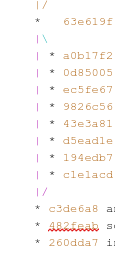
A few years back I was excited to learn that there was a video that would teach me how to remove the seeds from a pomegranate in ten seconds.
I was less excited when I learned that the video was four and a half minutes long. It shouldn't take more than sixty seconds to explain how to do something that only takes ten seconds to demonstrate. Maybe something like this:
“Here's how to seed a pomegranate in ten seconds: Cut the pomegranate like this.”
THUNK THUNK
“Hold half of the pomegranate over a bowl. Take a wooden spoon.”
WHAP WHAP WHAP WHAP WHAP WHAP WHAP WHAP WHAP WHAP WHAP WHAP WHAP WHAP WHAP WHAP WHAP WHAP WHAP WHAP WHAP WHAP WHAP WHAP WHAP WHAP WHAP WHAP WHAP WHAP
“Now the other half.”
WHAP WHAP WHAP WHAP WHAP WHAP WHAP WHAP WHAP WHAP WHAP WHAP WHAP WHAP WHAP WHAP WHAP WHAP WHAP WHAP WHAP WHAP WHAP WHAP WHAP WHAP WHAP WHAP WHAP WHAP
“There you go! Thanks for watching.”
Instead, this guy spent two minutes up front building suspense and telling us how awesome this was going to be once he finally got around to showing it to us. Then he spent another minute on the back end waffling around instead of just turning off the camera.
Many years ago I gave a conference talk in which I complained that conference speakers waste everyone's time introducing the subject before they work around to the point. I wish I'd used that pomegranate video as an example.
Two or three years ago Lorrie came home while I was setting up the christmas tree. I said “Guess what was the best thing that happened to me today?”
“What?”
“The tree almost slid off the roof of the car onto I-95.”
I had another one of those today. I was driving on Baltimore Avenue, which didn't look too slippery, but as I braked on a slight downward grade behind a line of cars stopped at a red light, the brakes stuttered on the wheels and the car didn't slow down. I pumped the brakes and it didn't help, and at that moment I realized I was going to hit the car in front of me.
And then, with maybe one second before impact, I reached down and yanked the hand brake, and my car stopped without hitting anyone!
If anyone ever criticizes the amount of time I have spent playing video games, I will have an answer all ready.
I just posted an article about a line-shuffling command I wrote no
later than 2006. Adam Sjøgren immediately
wrote to me to point out that there is a shuf(1) command in the GNU
coreutils package, and therefore pre-installed on my very same
GNU/Linux system. This by itself wouldn't be worth a followup post,
but M. Sjøgren did a little software archaeology himself and
discovered:
Interestingly, it was added to coreutils on August 8, 2006 …
Author: Paul Eggert <eggert@cs.ucla.edu> Date: Tue Aug 8 22:22:47 2006 +0000 New file, introduced for shuf, sort -R, and/or shred.The very day after your file's timestamp:
% ls -l $(which shuffle) -rwxr-xr-x 1 mjd mjd 91 Aug 7 2006 /home/mjd/bin/shuffle(!)
(!) indeed!
Given the nature of these tools, it has to be coincidence, right? :-)
Paul Eggert will be hearing from my lawyer first thing Monday morning.
Just now I needed a utility that would read standard input and emit
the same lines in a random order. “Eh,” I said. “Maybe Linux comes
with one already. I wonder if there's a shuffle command?”
So I ran which shuffle and got an encouraging response:
% which shuffle
/home/mjd/bin/shuffle
Have I been in this movie before? I was quite hopeful at this point;
I guessed that either that shuffle would be exactly what I wanted,
or else it would shuffle its command-line arguments and print them on
a single line. So I ran:
% shuffle
to see what would happen, and it did nothing, presumably because it was waiting for standard input. Better and better!
It did turn out to be exactly what I wanted, and I had no idea that I had it. I wonder when was the last time I used it? It might have been a very long time ago:
% ls -l $(which shuffle)
-rwxr-xr-x 1 mjd mjd 91 Aug 7 2006 /home/mjd/bin/shuffle
Wow. It's even possible that this is the first time that I've used it since 2006.
In Vernor Vinge's novels there are people who make a living doing “software archaeology”: you need to do some complex task, and maybe you don't have enough time (or enough understanding) to write a program to do it, but maybe you do have time to exhume and refurbish some thousand-year-old piece of software that does do it.
Lately I have been wondering if there really are falls in Great Falls, Montana, and if so, are they really great? Wikipedia says there are:
The Great Falls of the Missouri River are a series of waterfalls on the upper Missouri River in north-central Montana in the United States.
and that they are:
The Great Falls have been described as "spectacular", one of the "scenic wonders of America", and "a major geographic discovery". When the Lewis and Clark Expedition became the first white men to see the falls in 1805, Meriwether Lewis said they were the grandest sight he had beheld thus far in the journey.
There are five falls. In order, they have vertical drops of 8.05m, 2.01m, 13.56m, 5.79m, and 26.52m. For comparison, Niagara Falls is 51m.
The second of those, Colter Falls, is barely two meters high. While I am 100% willing to agree that there are Great Falls in Montana, I am not so sure about the inclusion of Colter Falls. No recent pictures of it are available because it has been completely underwater since the construction of the Rainbow Dam in 1910.
Some co-workers recently suggested that cocktail garnishes are unimportant, just decoration. I don't think this position is particularly supportable in general, but as a universal claim it can be completely refuted by the example of the Sourtoe cocktail, served at The Sourdough Saloon of the Downtown Hotel in Dawson City, Canada.
Without its garnish, the Sourtoe is a nothing: a straight shot, usually of Yukon Jack. But it is garnished with an actual human toe.
Maybe the Sourtoe could become better-known by expanding the reach of its brand. In addition to Jack Daniel's Tennessee Whisky, there is now Jack Daniel's barbecue sauce and a whole line of Jack Daniel's mustards. In that spirit, I suggest not only Sourtoe™ barbecue sauce and Sourtoe™ mustard, but also:
- Sourtoe™ steak sauce
- Sourtoe™ baked beans
- Sourtoe™ spice rub
- Sourtoe™ cocktail mix
- Sourtoe™ hot dog relish
- Sourtoe™-flavored gummi worms
- Sourtoe™ frozen yogurt
- Sourtoe™-flavored Doritos®
- Sourtoe™ hangover relief medication
Many people, including me, seem to be unusually bothered by background sounds. I'm particularly susceptible to repetitive music, and I'm having trouble writing this article because I'm trying so hard not to think of particular earworms that have tormented me for years. I once played Crash Bandicoot in a hotel and had the Crash Bandicoot music stuck in my head for months afterward. I almost always turn off the music in video games. No matter how good it is, it always starts to repeat much too quickly.
Is there a word for this? I thought it was “dysphonia”, but that turns out to mean something completely different: it's when your voice is hoarse.
[ Addendum: Simon Tatham informs me that “misophonia” is what I am looking for, or similar to it. ]
Long, long ago I had a summer intern job with a software company, XYZCO, that published a database product, XYZDB. It came with a number of optional add-ons: XYZREPORT, XYZFORMS, and so on.
One of these was the statistics package, XYZSTAT. One of the senior programmers once mentioned to me that no customer had ever reported a bug in XYZSTAT. “Wow,” I said, naively. “Is it really good?”
“No, it's garbage. The only software without bug reports is software with no users.”
“I don't understand.”
“What happens is, purchasing managers need to choose a database product. They have a list of features that the database could have. One of the items is “statistics package”. Our sales folks told us we were losing sales to PQRCO because customers would say "We see that PQRDB has a statistics package, doesn't XYZDB have one too?” So we found some kid in California who had written a statistics package and bought it from him and renamed it XYZSTAT. But we know nobody actually uses it because there aren't any bug reports about it.”
Not that different from writing a résumé, actually.
Alphabet game
I didn't post for a while because we went to Florida for vacation. While there, we played the alphabet game a few times. We expected that Q would be easier to get than it is in Pennsylvania, because, unlike Pennsylvania license plates, Florida plates do have the letter Q:
This turned out to be the case, but finding the letter Q was easy for a reason I hadn't even thought of before: Florida, unlike Pennsylvania, has LIQUOR stores.
(This sounds like a joke, doesn't it? But I assure you it is not a joke.)
Bluetooth keyboard
I left my computer at home because I don't like to bring it on vacation, but I did bring my phone, and I composed blog posts on it using a new bluetooth keyboard that I got for a different purpose that didn't work out. I hadn't had any plan for what to do with the superfluous keyboard but it was so light I forgot I had it in my bag and one day at the coffee shop I decided to see if I could connected it to my phone, just as a hack. It connected just fine, and then I discovered that I quite like using it to compose text on my phone, although this was not something that I had known I wanted to do. The keyboard is small and light enough to keep in my bag and pop out on the spur of the moment.
The kids, who take the most astonishing technologies for granted (“of course Hardee's has an on-demand quantum computing service, Dad!”) were surprised and delighted to seeing me use a wireless keyboard with my phone, and they had to try it out themselves. I can never predict what will impress them. If I had tried to guess, I would have supposed that they would have mocked me for using such an old-fashioned input device. But maybe that was what interested them about it, the same way that I might find it a charming novelty to use a telegraph key to configure AWS.
I thought that using bluetooth keyboards was something that people do, but maybe they only do it with tablets and not with phones, because one morning I sat in the hotel lobby drinking my coffee and writing blog posts with my phone and keyboard, and more than once a stranger came up to ask me about it: What kind of keyboard is it? Where can you get it? What kind of phone? Do you need a special app? I explained that no, this is a totally stock keyboard and it is a totally standard feature of all phones.
As we used to say when I was a sysadmin, users think you're a genius if you fix their monitor by plugging it in, and an idiot if you can't tell them how to do real-time robot arm control under Unix.
Palm trees
I do not understand palm trees. How do they work?
What are their roots like? What anchors them in the sand and keeps them from tipping over?
Where do they get fresh water from? Many plants dig deep for water. But on the beach, if you dig down you don’t get anything but salt. Do they grow very slowly?
Why do they have those wavy fronds all clustered at the top, and the smooth trunks? Is it for hurricane and flood resistance? Maybe they don’t need a lot of leaves because the sun is so bright. Maybe a palm tree’s big problem, like a cactus’, is how to stay out of the sun, and that’s why they are tall and narrow like a cactus.
Polyhedral lamps
The hotel contained these polyhedral lamps:
If this thing were uniform, it would be a rhombicuboctahedron but as it isn't, it is merely a cantelleted rectangular cuboid or some such.
Everyone always worries about being deceived by the Cartesian Demon. But what if you would like to be the Cartesian Demon of utmost power and cunning? That sounds kind of awesome. How do you get the job?
They say that you should dress for the job you want. How does the Cartesian Demon dress? By definition, you can’t know.
Thinking about that I became curious about Descartes' original description of the Demon. Then I did web search for the original French version. Except, duh, the original is in Latin, not in French. (“Cogito, ergo sum.” Sheesh.) Anyway, it seems to be in section 12 of Meditation 1:
Supponam igitur non optimum Deum, fontem veritatis, sed genium aliquem malignum, eundemque summe potentem & callidum, omnem suam industriam in eo posuisse, ut me falleret: …
The evil demon is “genium malignum”. A genius in Latin is a kind of magical spirit — a genie — and is the source of the English word “genius”. The connection with djinni is coincidental.
The genie's utmost power and cunning is “summe potentem & callidum”. I could not find any English cognates of callidum.
I wonder if Decartes' and Maxwell's demons ever get together for coffee.
Maxwell's Demon: “Watch this, I'll use my demonic powers to prevent our coffee from getting cold.”
Descartes' Demon: “Bah, you can't even know that it is cold, unless I let you.”
Wells Fargo Bank is now pushing a phone app, one of whose functions is to notify you immediately when they think someone might be making unauthorized charges to your credit or debit card. The advertisement displays an example, presumably calculated to alarm you:
I know I’m supposed to find this alarming, but it doesn’t quite hit the mark. A credit thief could arouse my ire by buying jewelry or fur coats. But ukuleles? It's just a little bit too cute. And how disarming, the enthusiasm of the people who sold the ukuleles, in naming their store Ukulele Palace and not something more prosaic like Ukulele World or Ukulele Outlet.
The setup reminds me of the absurd situations that arise in the game Illuminati!: “You need to roll 6 or better for the Credit Card Scammers to take control of the Ukulele Enthusiasts.”
In passing, I note that the ancient Roman ukulele festival, Ukulelia, was celebrated annually beginning on the calends of Sextilis.
(Also, something connecting ukulelia and glossolalia that would not be very funny even if I took the trouble to figure out what it was.)


